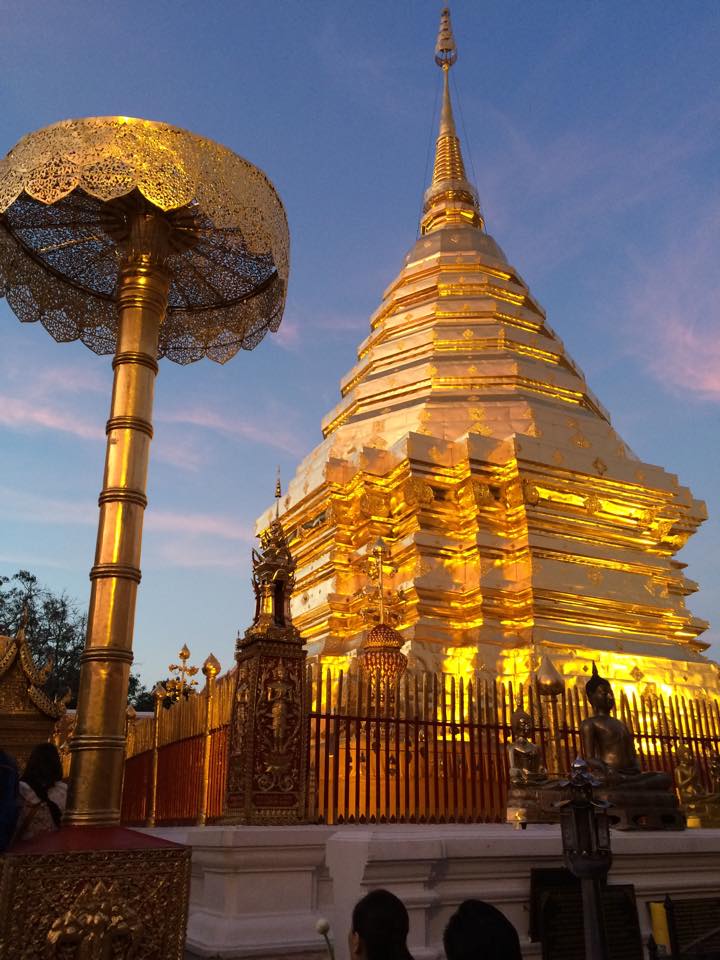 It has been over 800 days since Chad and I were last in Chiang Mai, but the memories of our time there are fresh. We often think back to a moment or a experience we had in this magical little city. It was certainly our favorite city in Thailand, and one of our favorites of all time. Chiang Mai is peaceful, spiritual, friendly, and beautiful. It is a place that stays with you. It is worth a trip to Thailand just to visit this serene city. Allow me to share with you a perfect three-day itinerary for Chiang Mai, Thailand’s principle northern city.
It has been over 800 days since Chad and I were last in Chiang Mai, but the memories of our time there are fresh. We often think back to a moment or a experience we had in this magical little city. It was certainly our favorite city in Thailand, and one of our favorites of all time. Chiang Mai is peaceful, spiritual, friendly, and beautiful. It is a place that stays with you. It is worth a trip to Thailand just to visit this serene city. Allow me to share with you a perfect three-day itinerary for Chiang Mai, Thailand’s principle northern city.
As with most flights, we arrived into Chiang Mai in the late evening and checked into an oasis, 137 Pillars House, a luxury property that is located in the heart of Chiang Mai. This would turn out to be one of our most favorite properties throughout our journey. The property consist of 30 luxury suites in a literal oasis. We stayed in one of six East Borneo Suites, which had a large vintage tiled verandas extending over tropical gardens, a vast walk-in closets, and an en suite bathroom with Victorian bathtub and separate indoor/outdoor garden showers. It was like heaven. Their breakfast was held in an outdoor pagoda and was delicious. Their small pool area was so serene. It was like returning home to a haven everyday after long days of touring.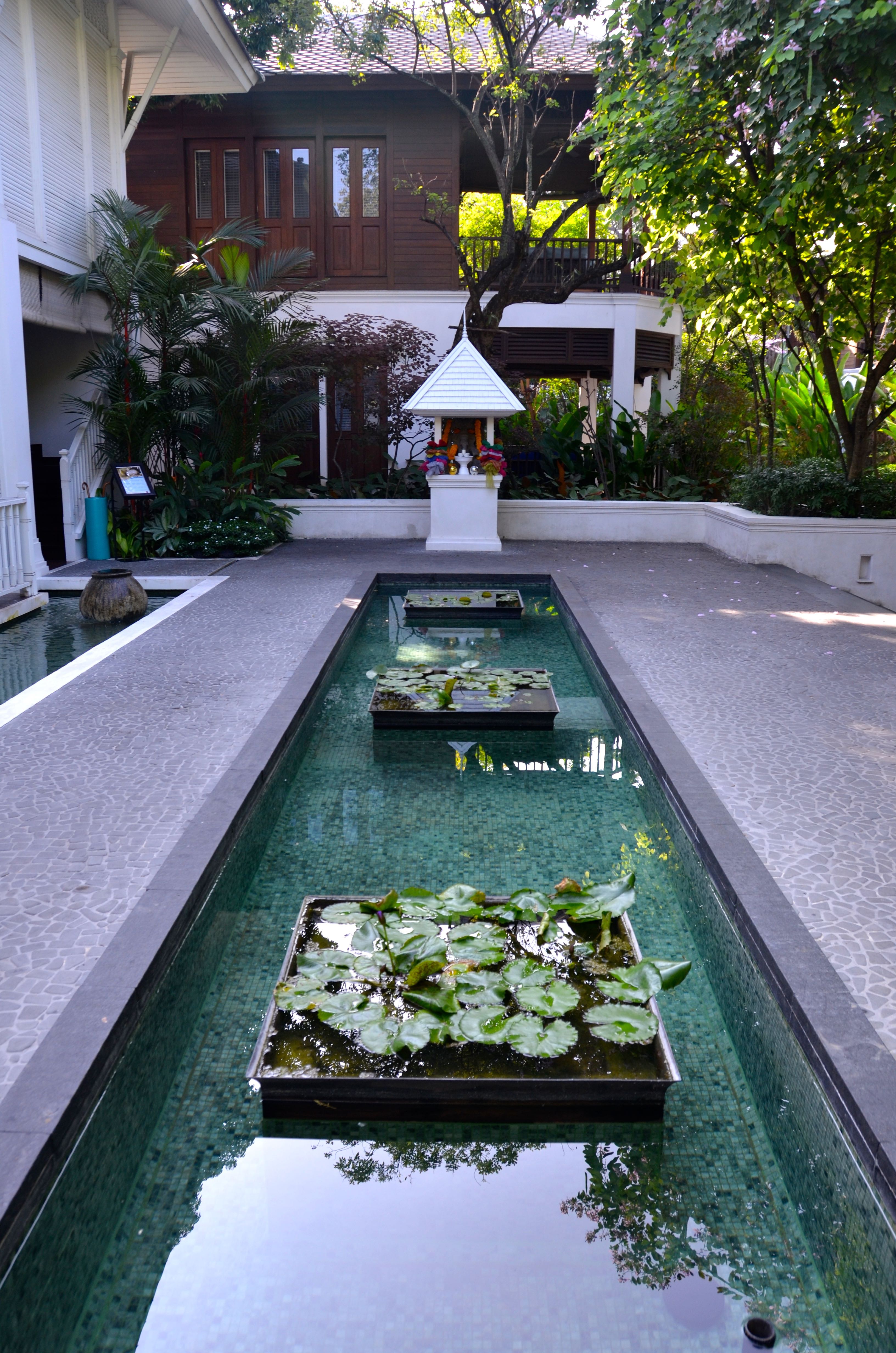
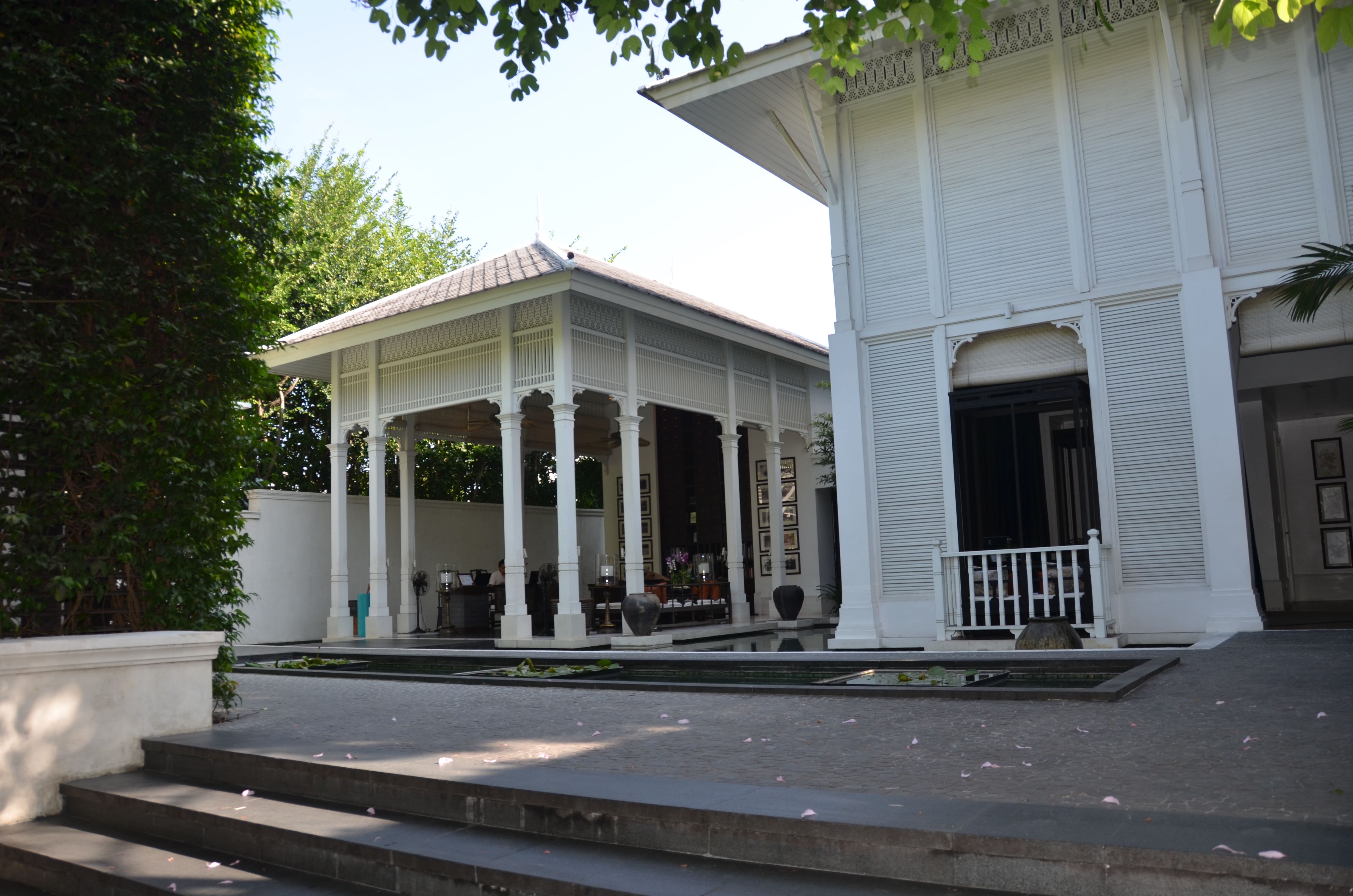
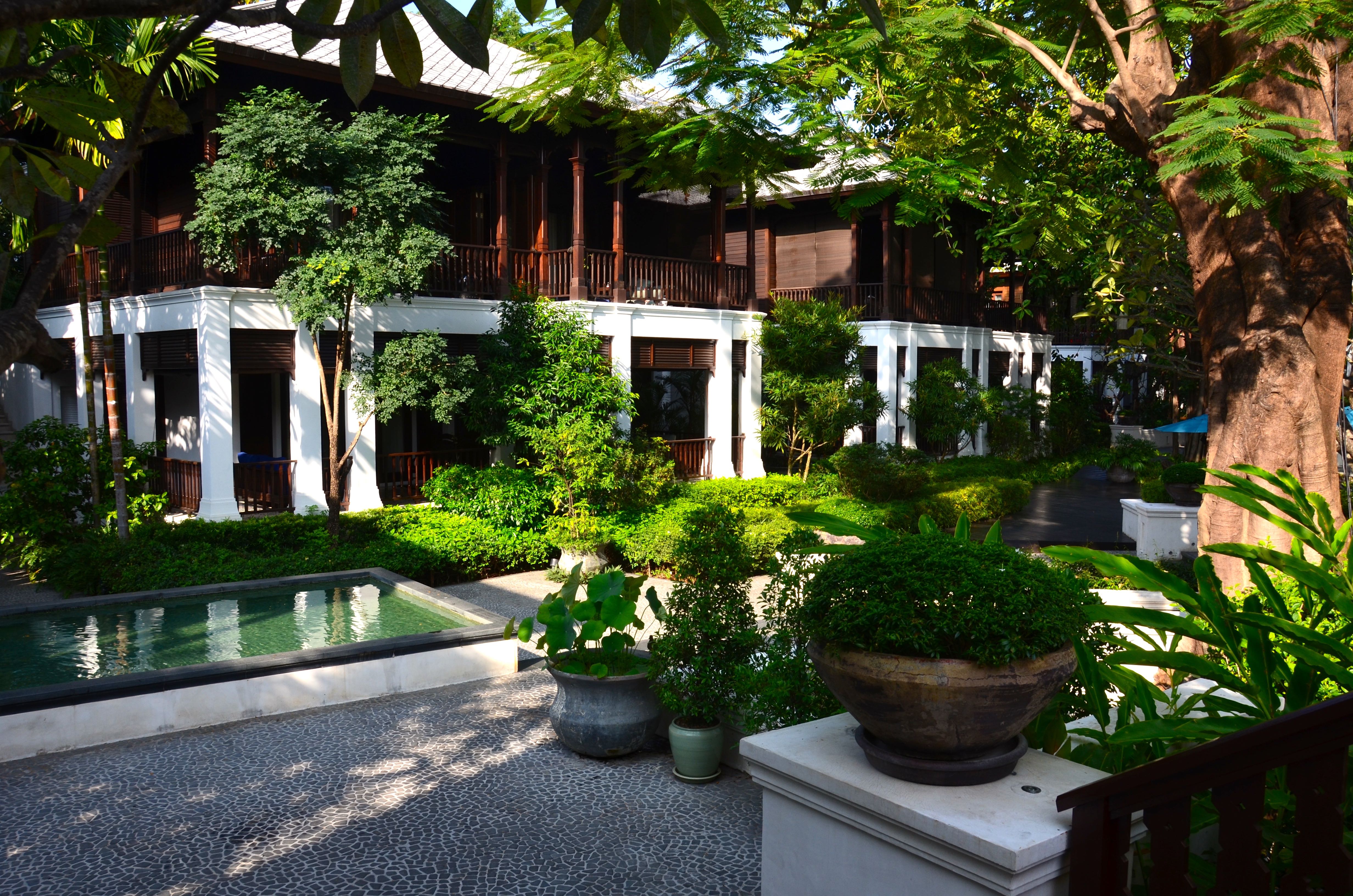
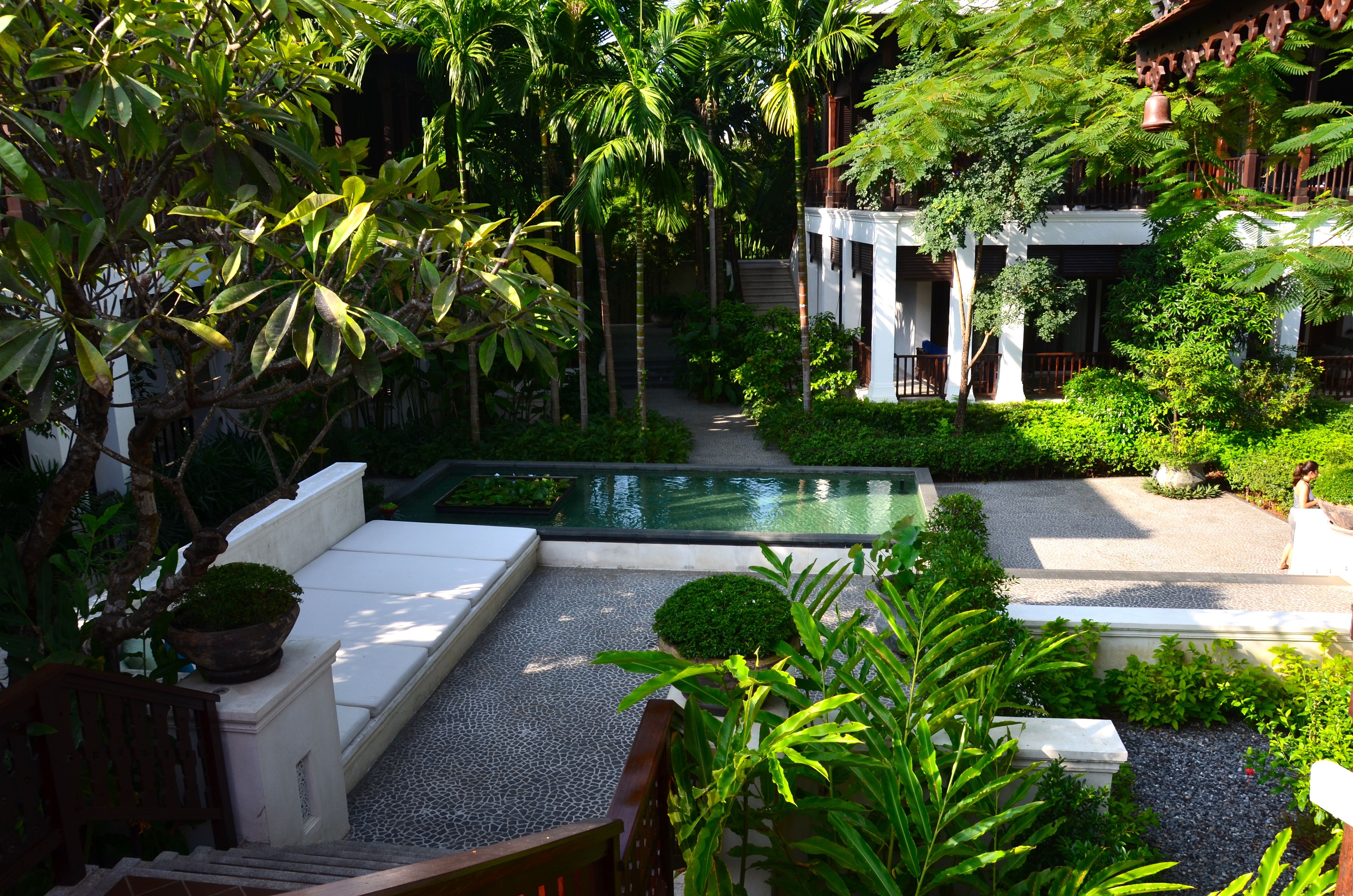
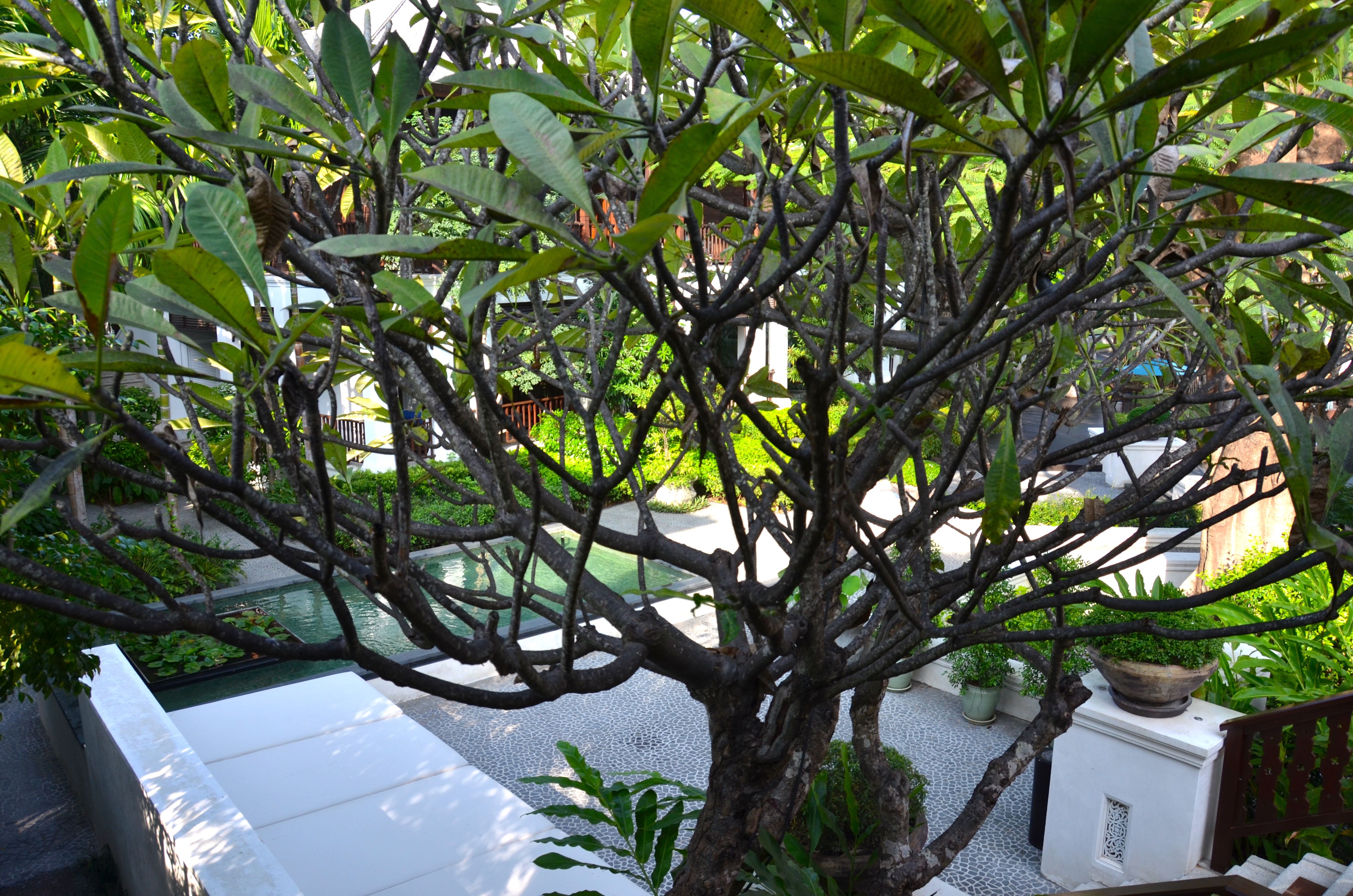
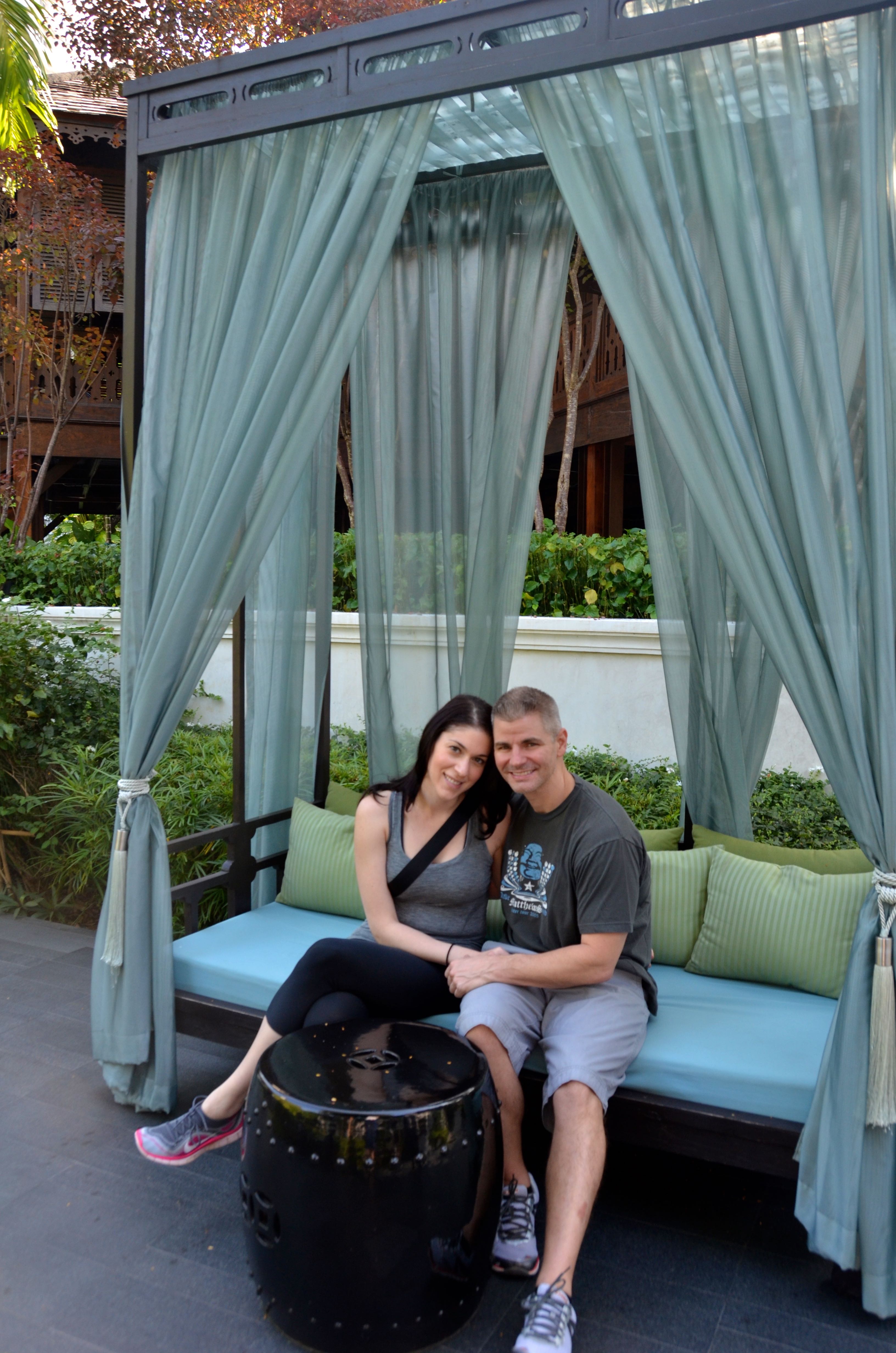
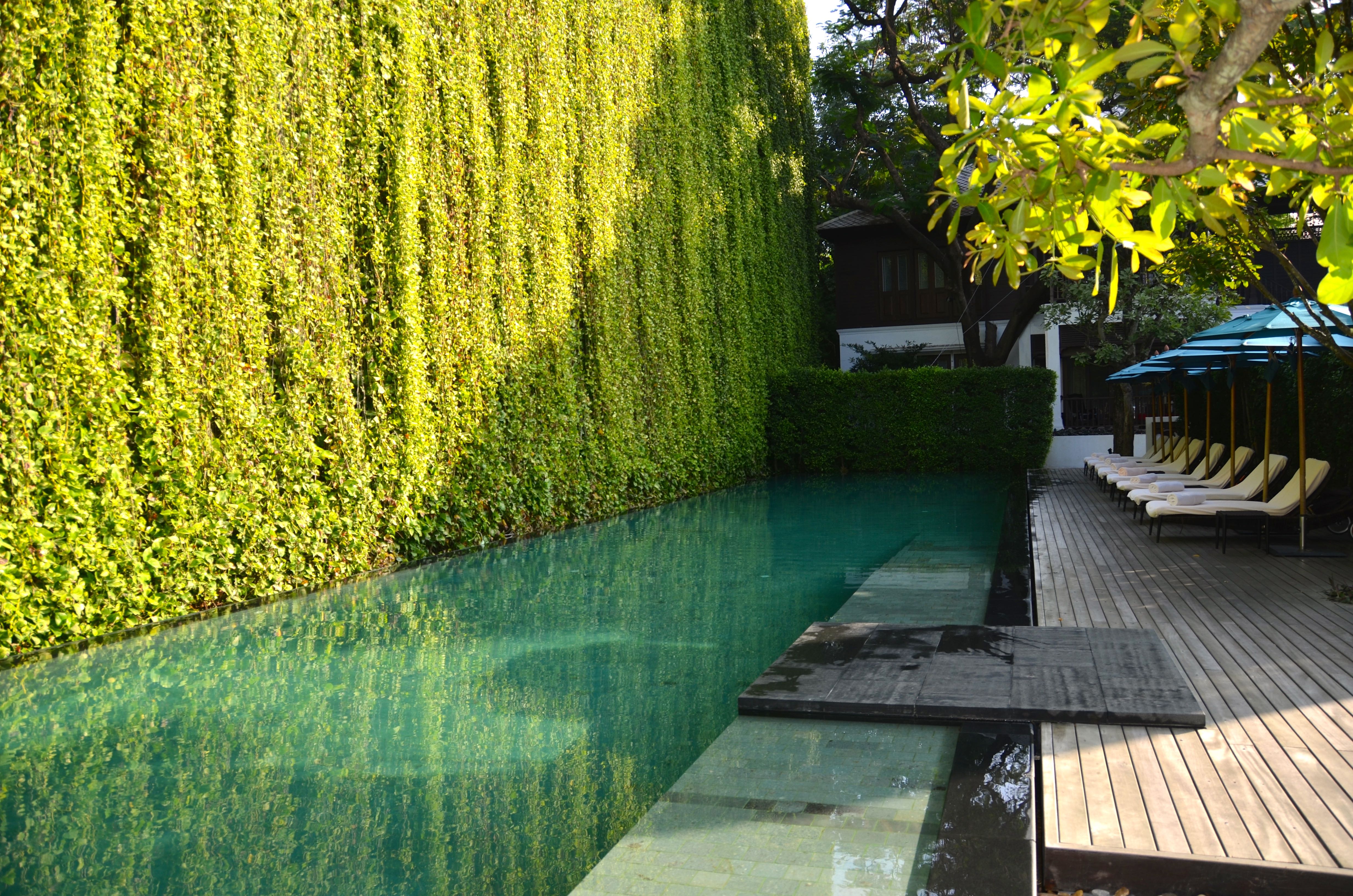
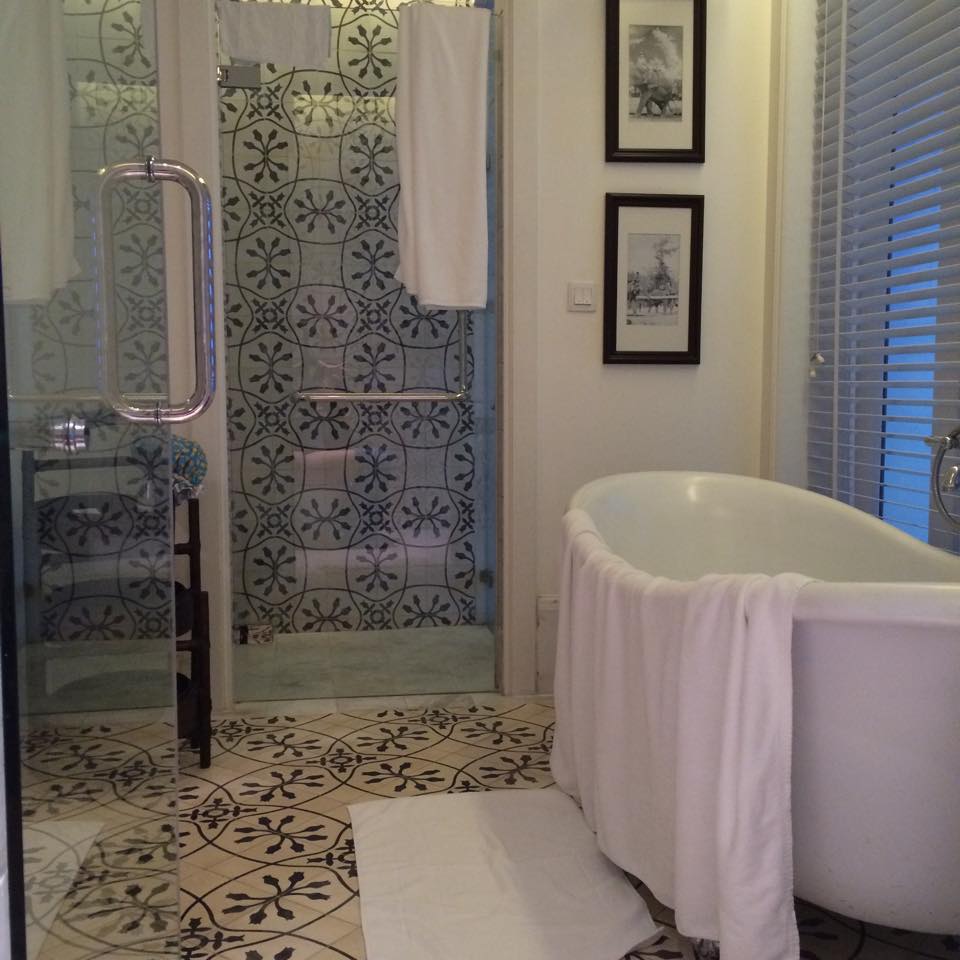
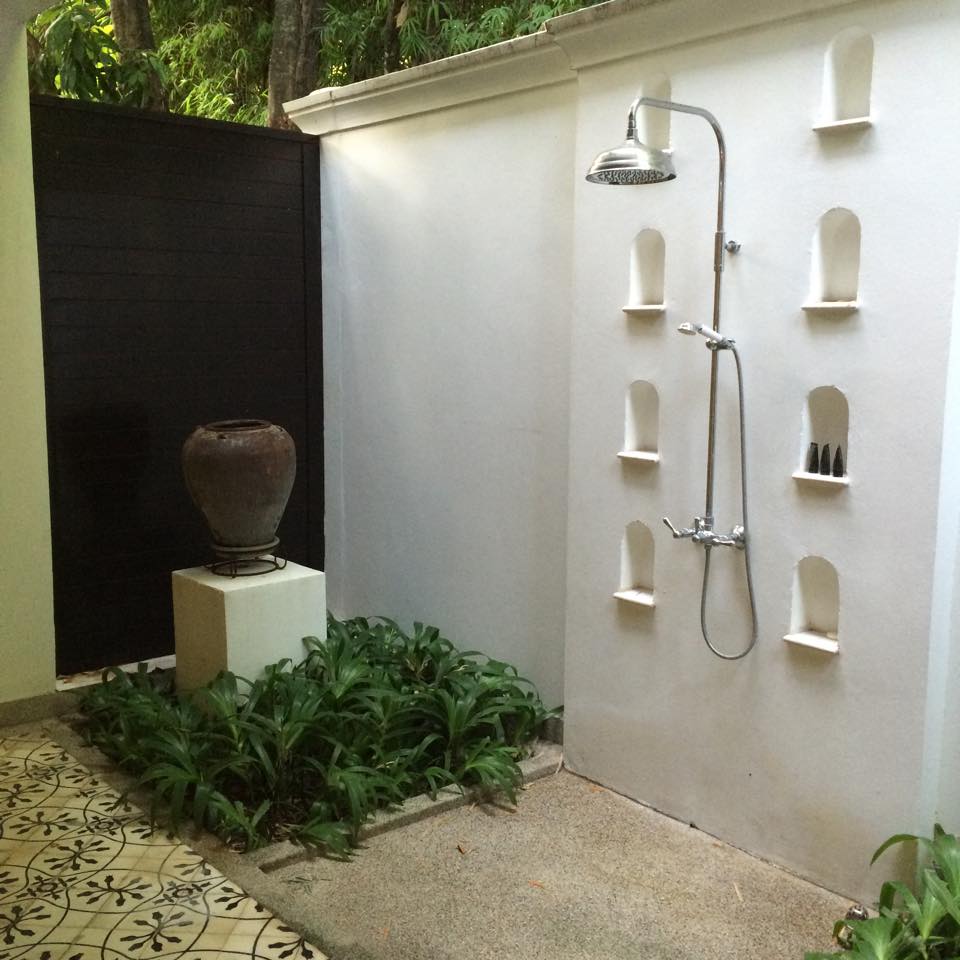 The next morning we were met by our private guide, Nikki, who, together with our driver, would be with us for the rest of our time in Chiang Mai. Nikki, like most of the Thai people, was so warm and friendly. Her goal was to make sure we were having an amazing time, and, she succeeded in that goal. No ask was too great a feat for Nikki!
The next morning we were met by our private guide, Nikki, who, together with our driver, would be with us for the rest of our time in Chiang Mai. Nikki, like most of the Thai people, was so warm and friendly. Her goal was to make sure we were having an amazing time, and, she succeeded in that goal. No ask was too great a feat for Nikki!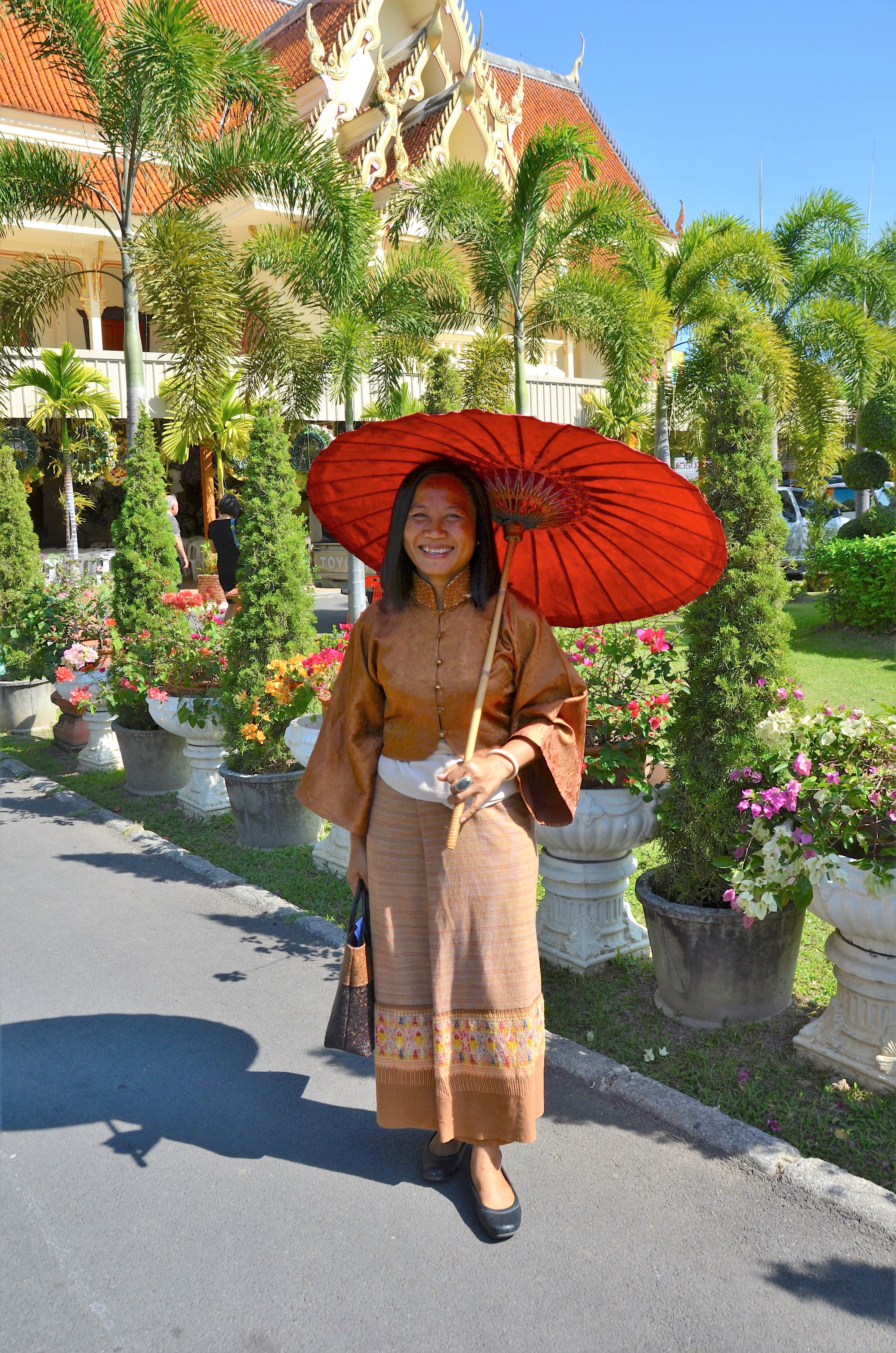 On our first full day in Chiang Mai, a city tour with plenty of temples were on the itinerary! Chiang Mai has some very beautiful temples right in the heart of the city. If your are going to visit the temples, here are some things you should know. First, bring a scarf to throw over your shoulders. It can get pretty warm in Thailand, but bare shoulders for women is a no-no. Second, wear shoes that you can easily take on and off and which you do not mind leaving outside while you visit the temples. Shoes are not allowed to be worn inside the temples. Third, and probably most important, bring a good pair of socks that you don’t mind getting dirty because you will be doing most of your temple walking in socks!
On our first full day in Chiang Mai, a city tour with plenty of temples were on the itinerary! Chiang Mai has some very beautiful temples right in the heart of the city. If your are going to visit the temples, here are some things you should know. First, bring a scarf to throw over your shoulders. It can get pretty warm in Thailand, but bare shoulders for women is a no-no. Second, wear shoes that you can easily take on and off and which you do not mind leaving outside while you visit the temples. Shoes are not allowed to be worn inside the temples. Third, and probably most important, bring a good pair of socks that you don’t mind getting dirty because you will be doing most of your temple walking in socks!
Before we set out on our temple tour, Nikki made sure we stopped and got a Thai delicacy- mango sticky rice. We literally stopped at a woman’s house, who Nikki said made the best mango sticky rice in all of Chiang Mai. She was right! What is mango sticky rice, you ask? Well, it is just what it sounds like– warm white sticky rice, topped with sweet, sweet mango, then topped with sweet coconut cream/milk and garnished with a few nuts. Even if you don’t care for mangoes, like Chad, you will like this. You can’t not like it. It’s incredible.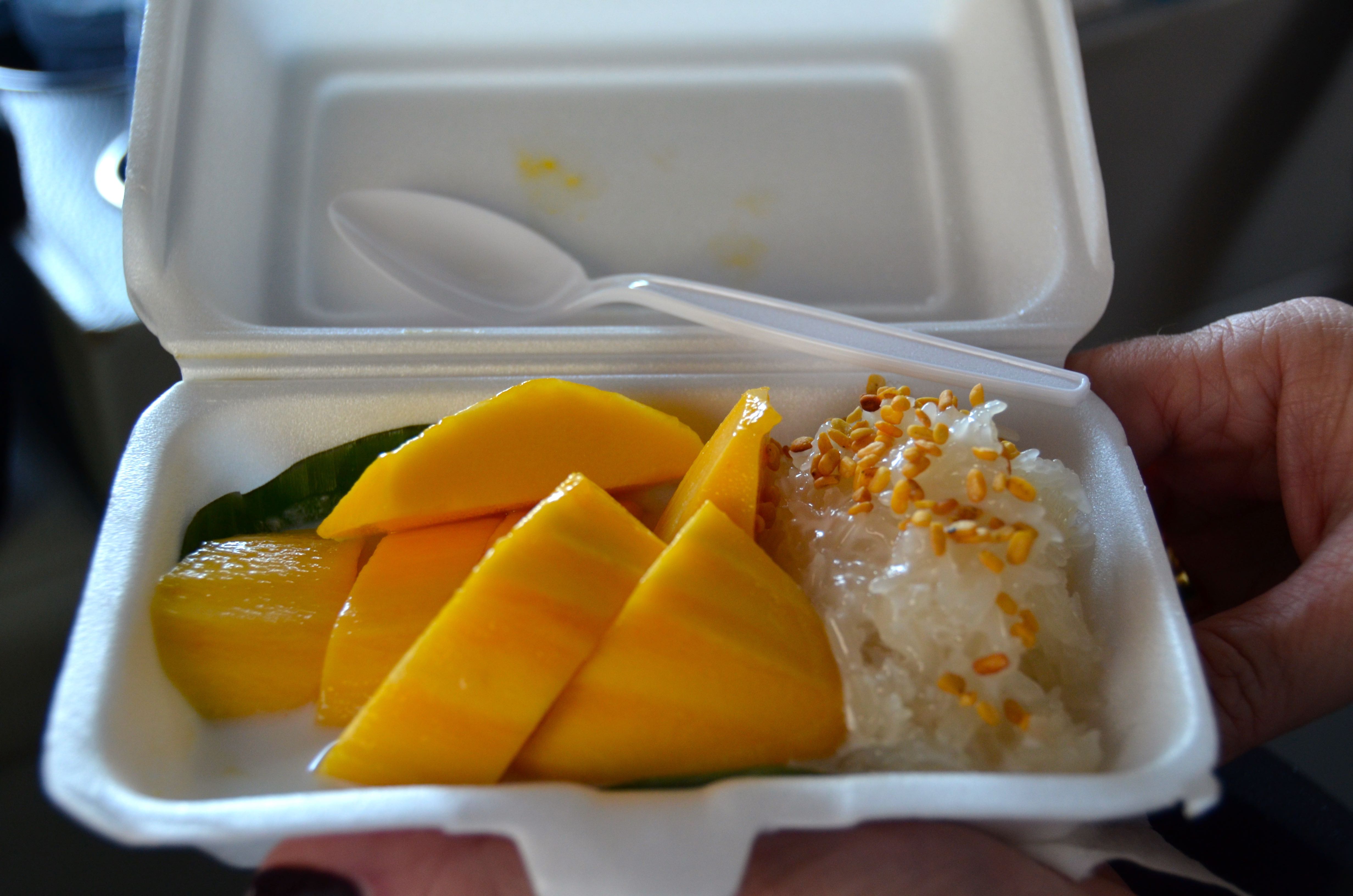 Now we ready to temple! Temples, or wats as they are called in Thailand, are the backbone of Thai culture. Our first stop was to Chiang Mai’s best known temple, Wat Phra Singh. The temple houses an important Buddha statue: the Phra Buddha Sihing which gives the temple its name.
Now we ready to temple! Temples, or wats as they are called in Thailand, are the backbone of Thai culture. Our first stop was to Chiang Mai’s best known temple, Wat Phra Singh. The temple houses an important Buddha statue: the Phra Buddha Sihing which gives the temple its name.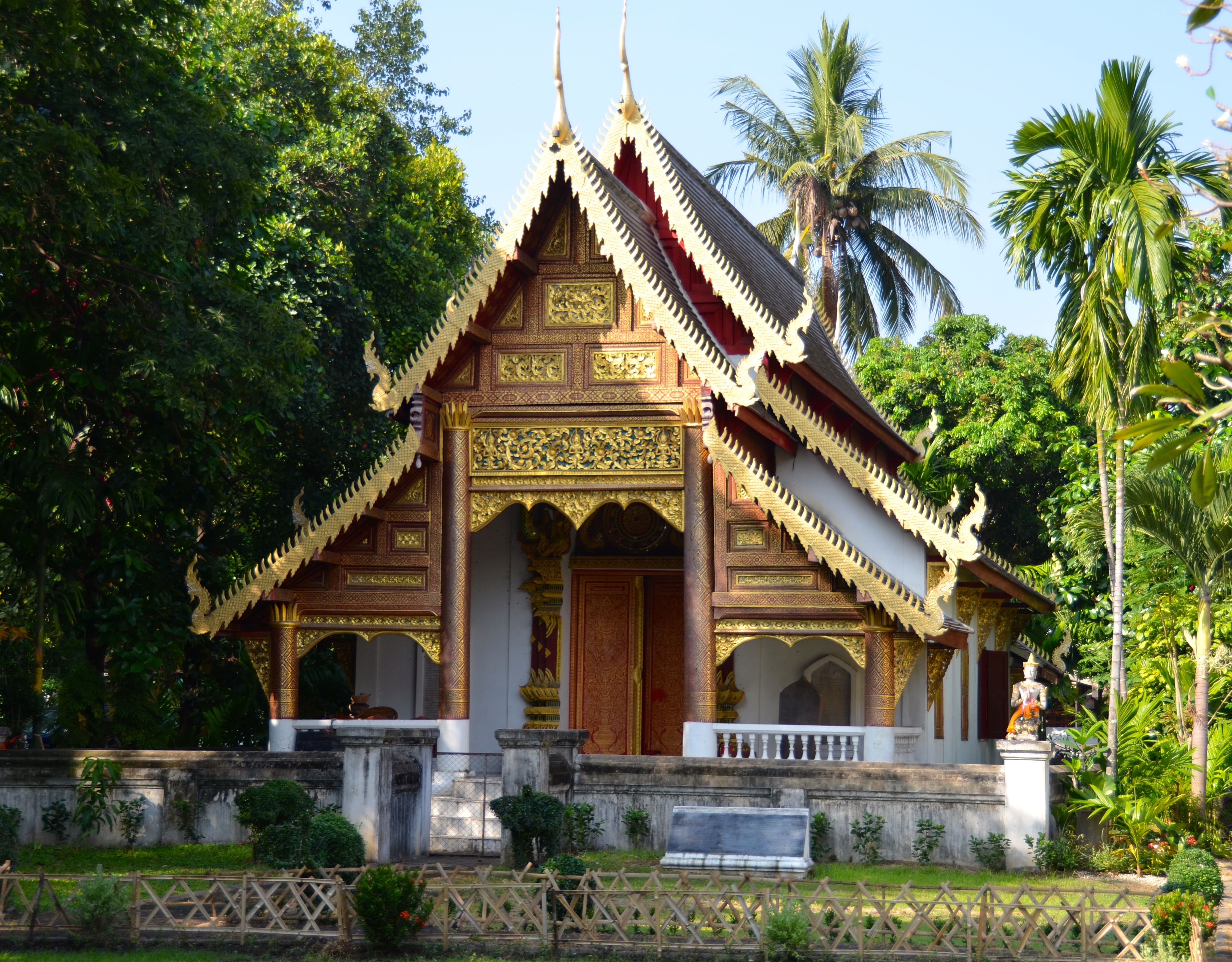
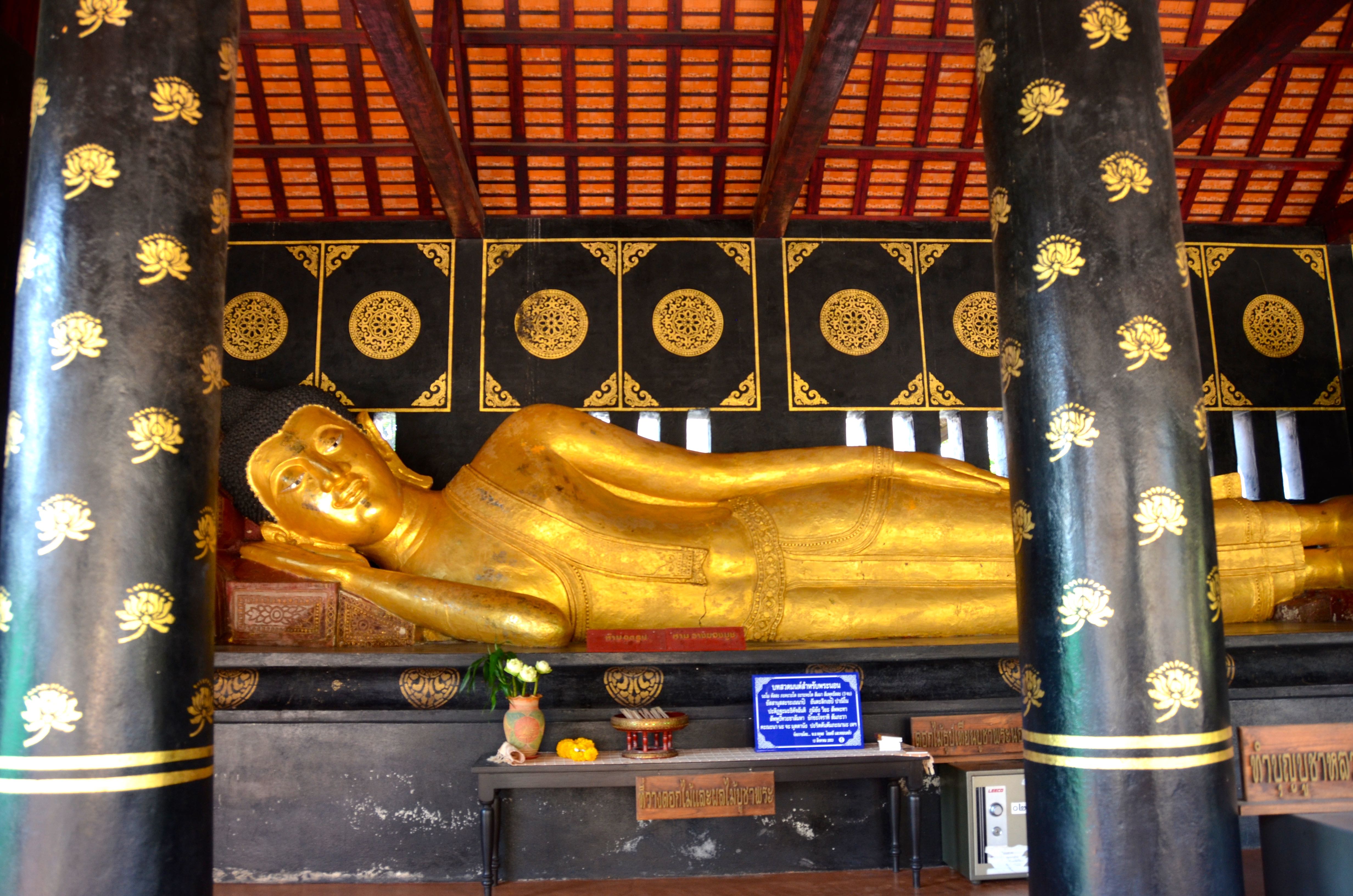
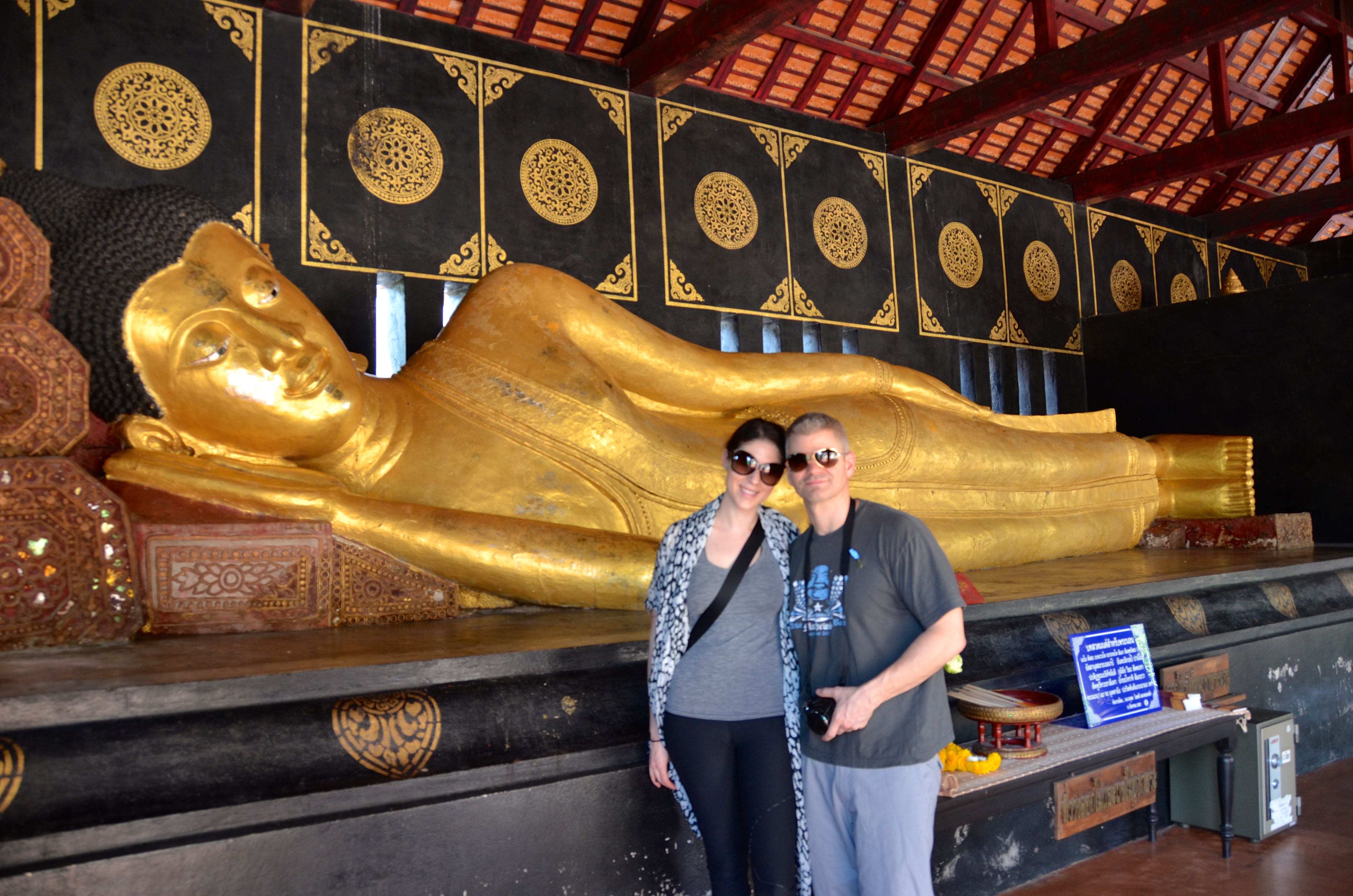
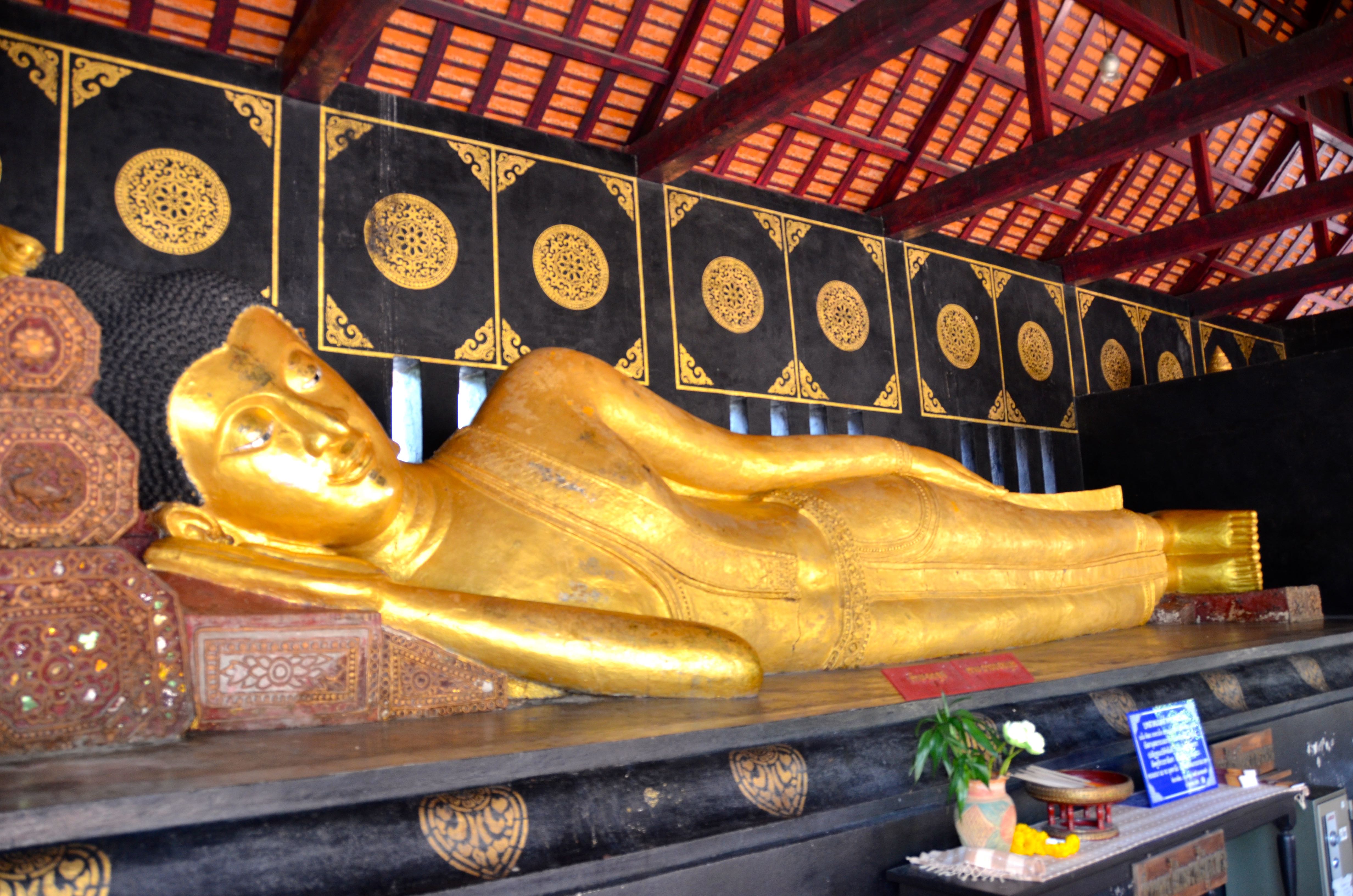
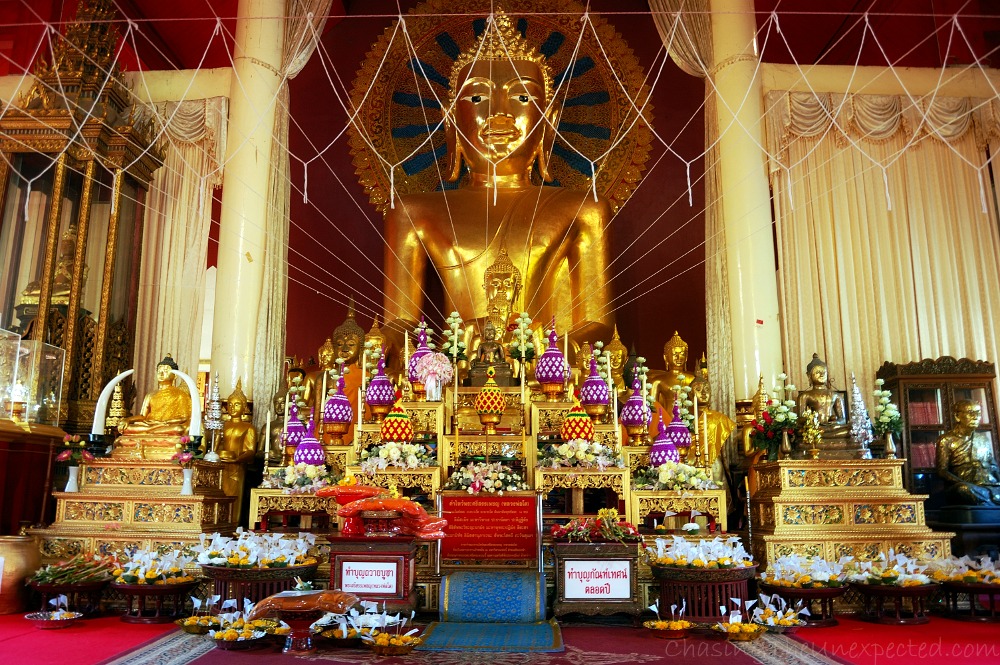 We next visited Wat Chedi Luang. While this temple might not look like much from the outside (comparatively speaking), it is stunning inside, and, the most interesting part is that you can buy prayer banner based on your birthday and hang them from the temple ceiling.
We next visited Wat Chedi Luang. While this temple might not look like much from the outside (comparatively speaking), it is stunning inside, and, the most interesting part is that you can buy prayer banner based on your birthday and hang them from the temple ceiling.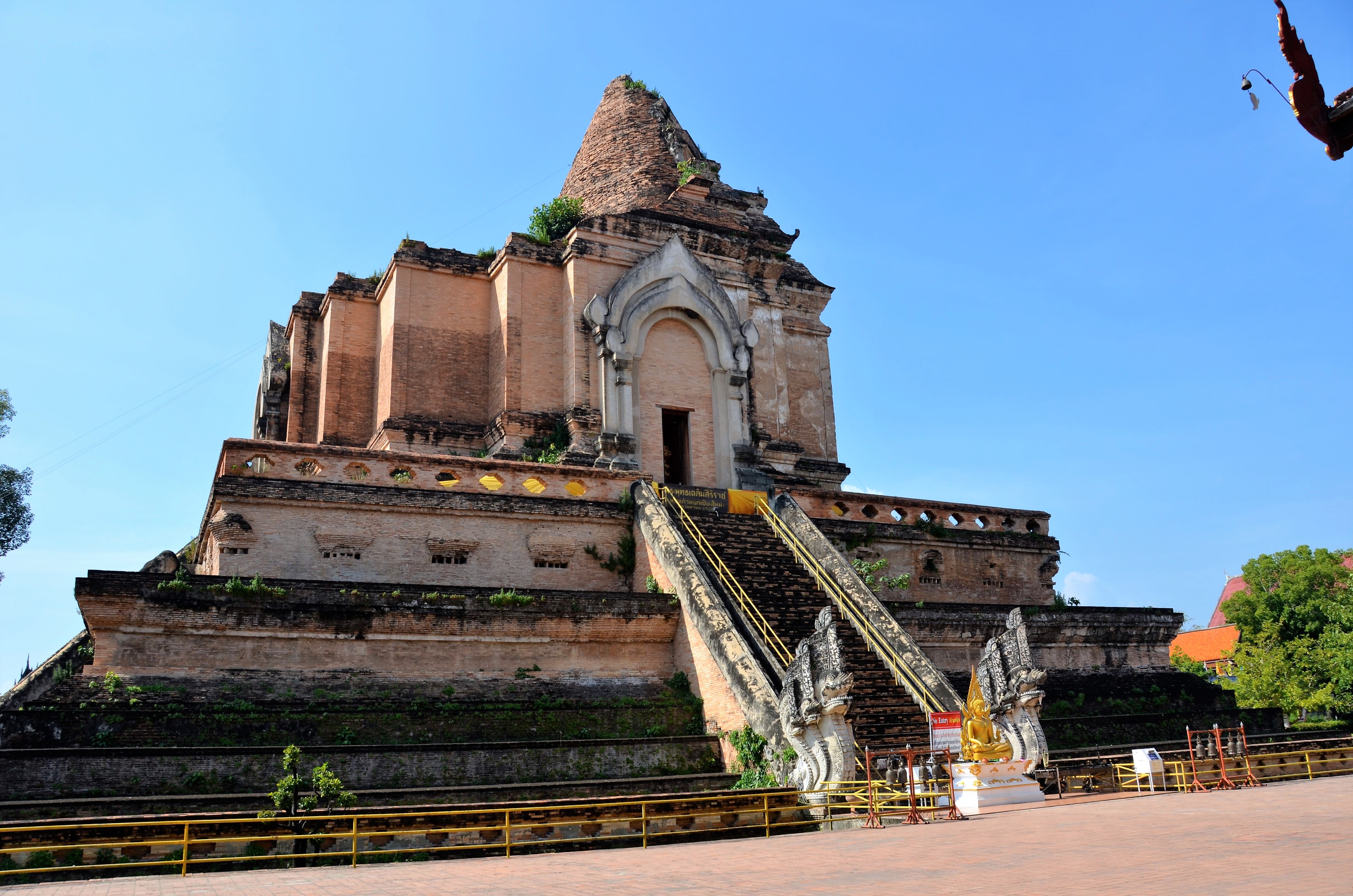
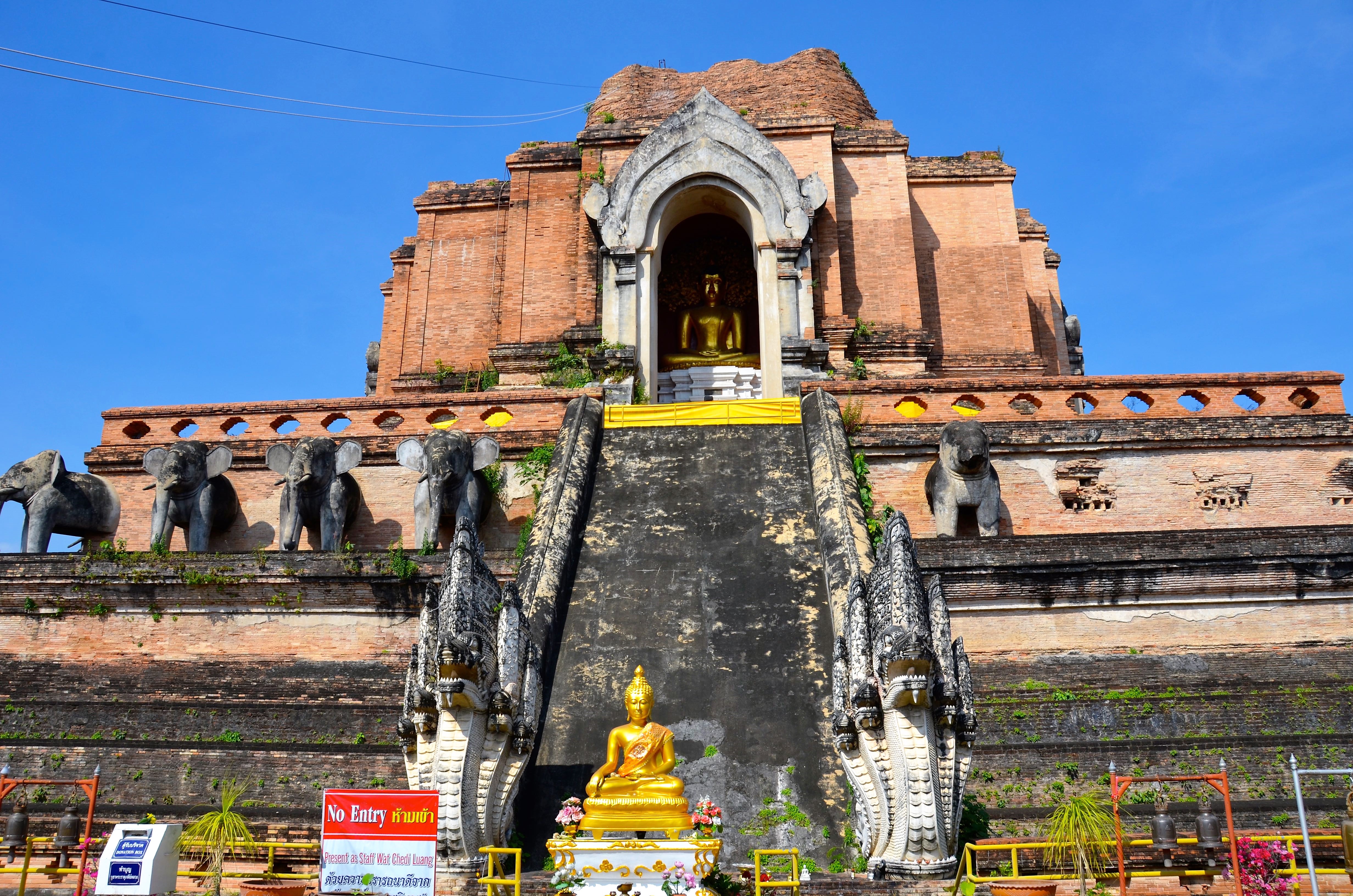
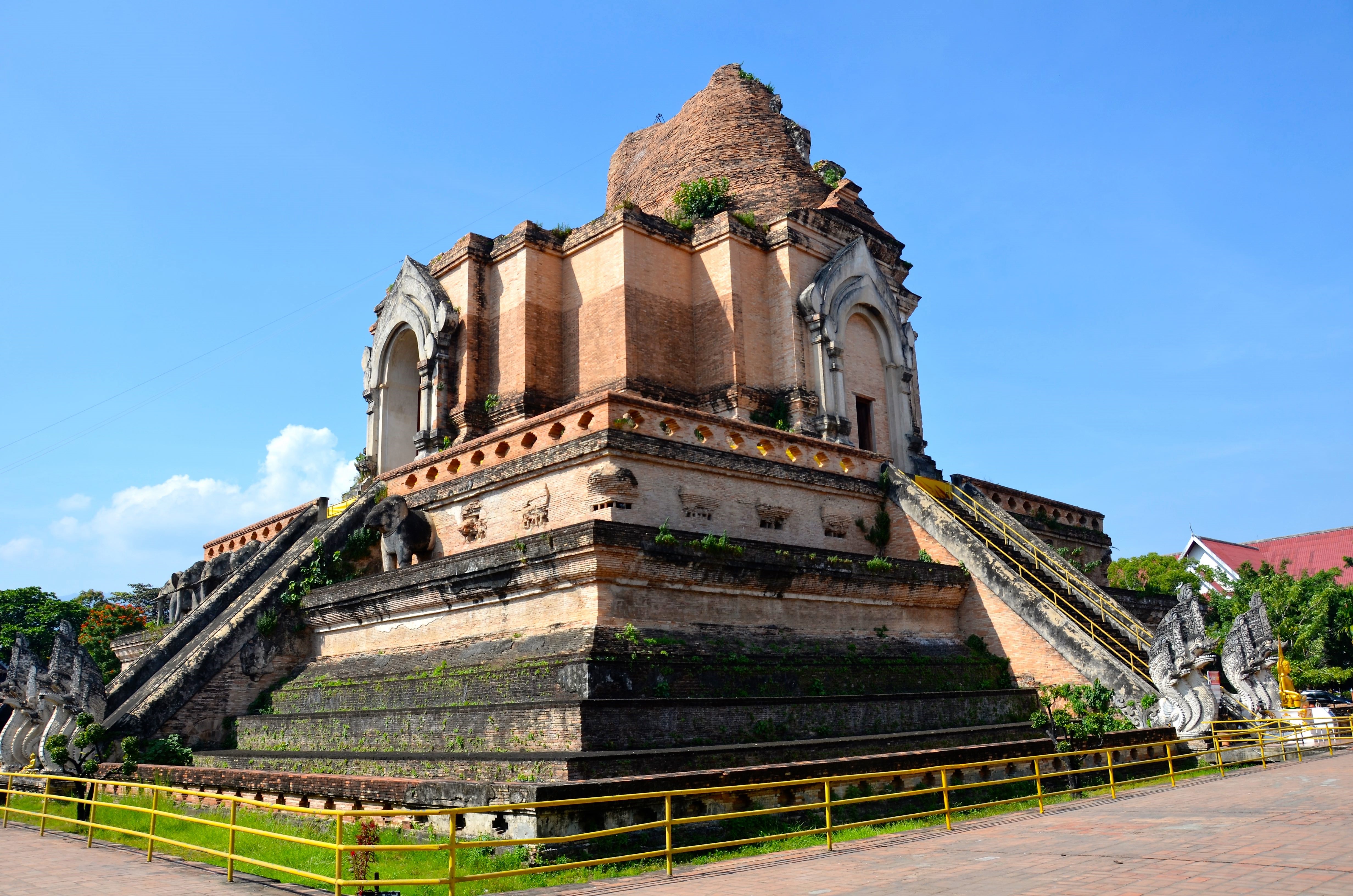
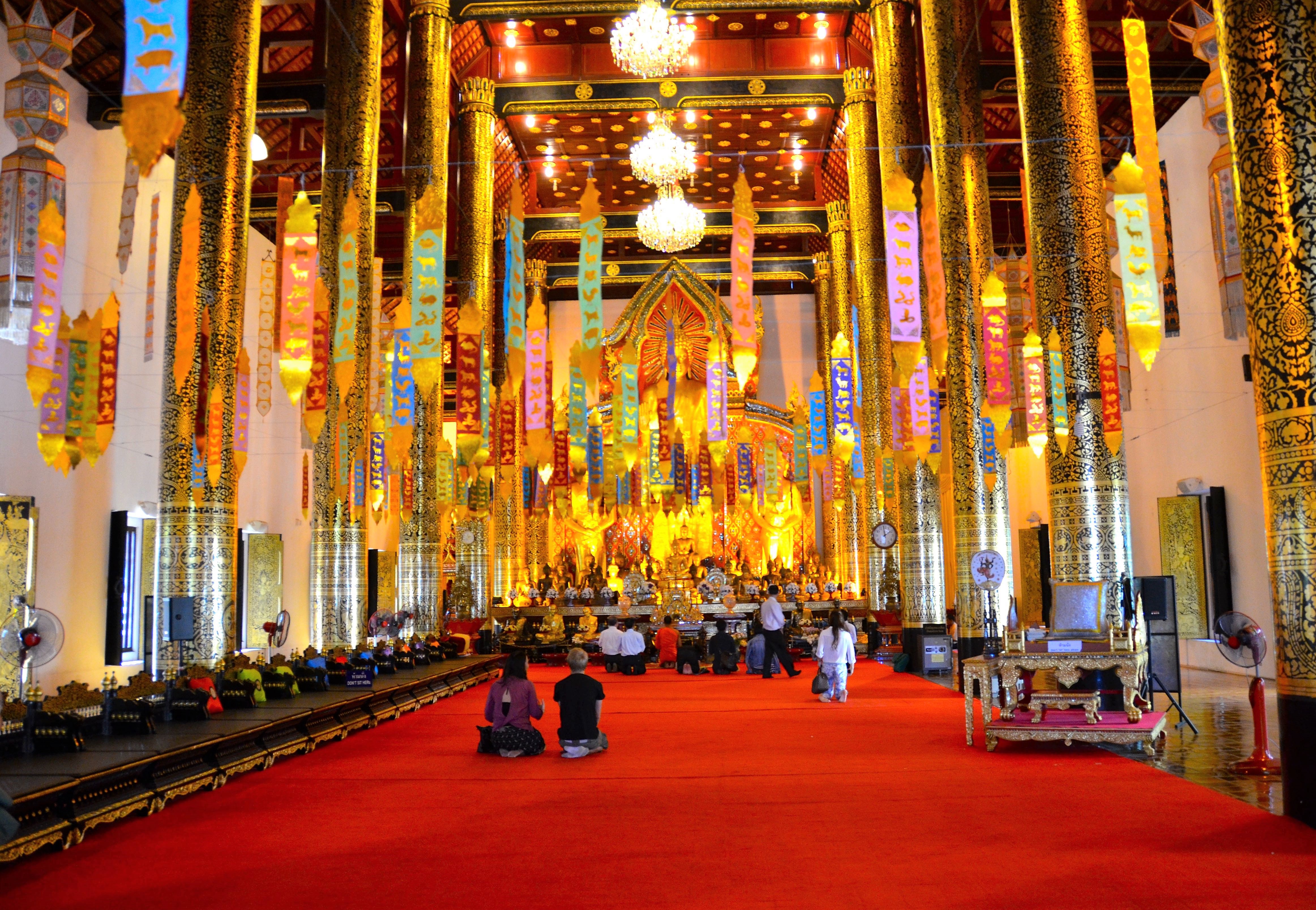
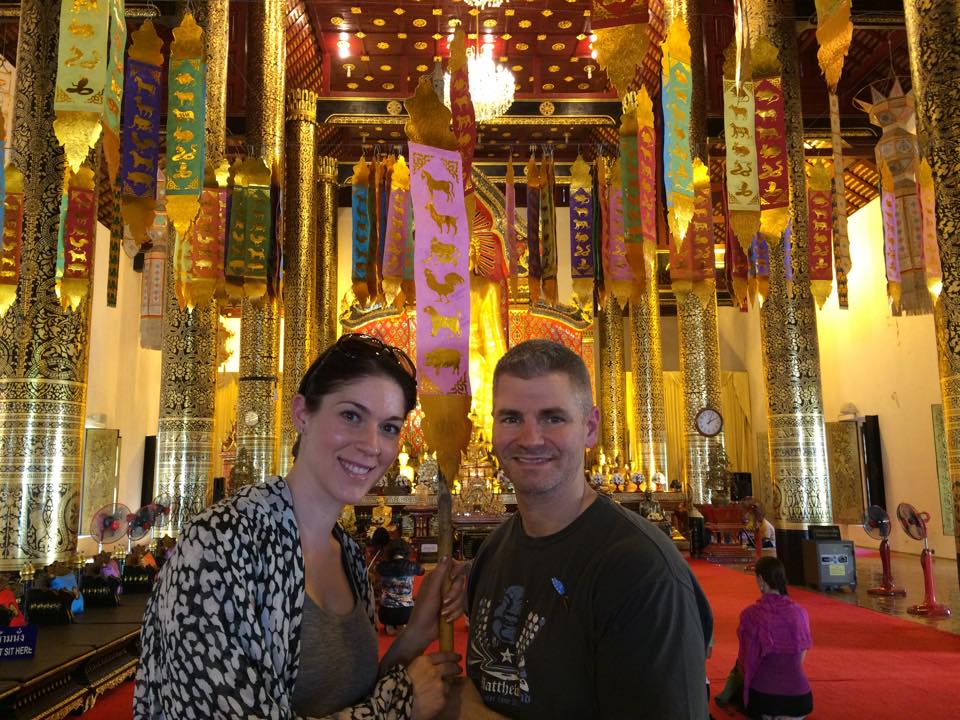
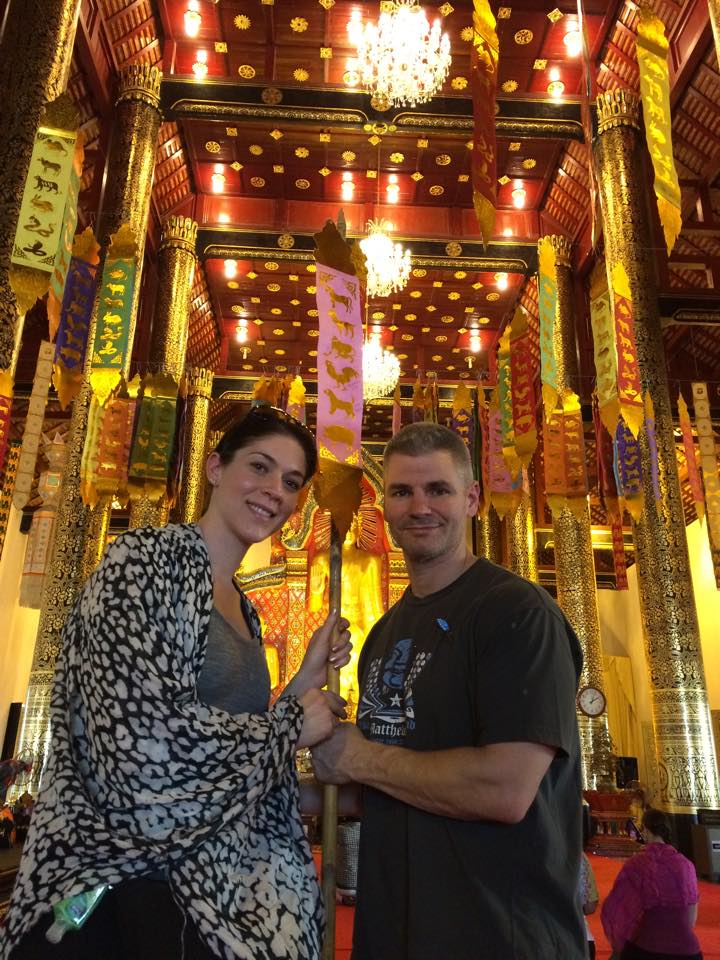
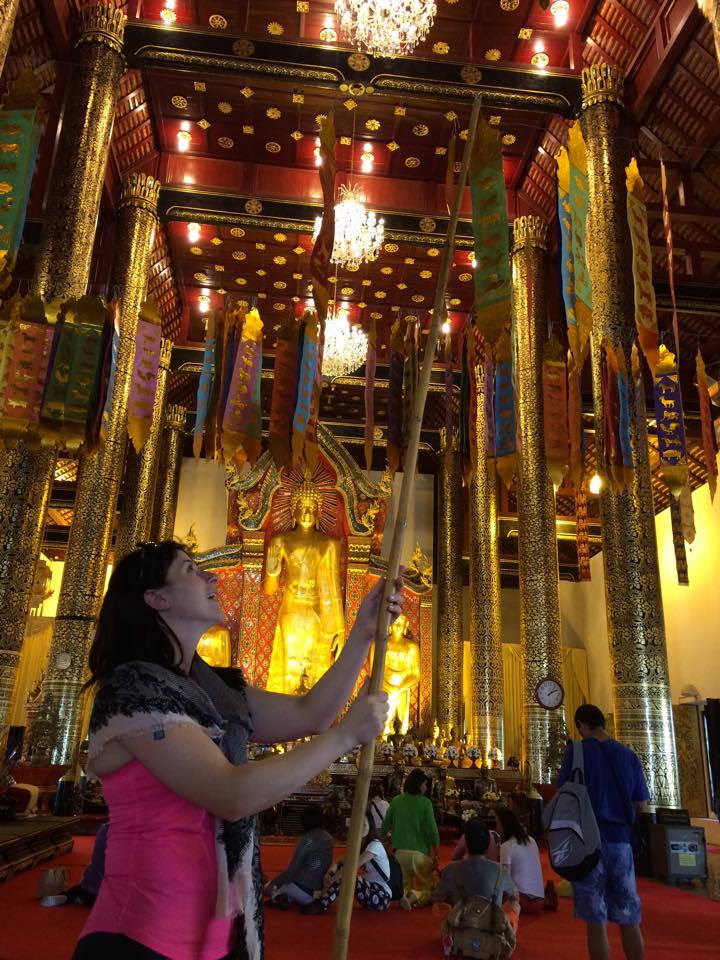
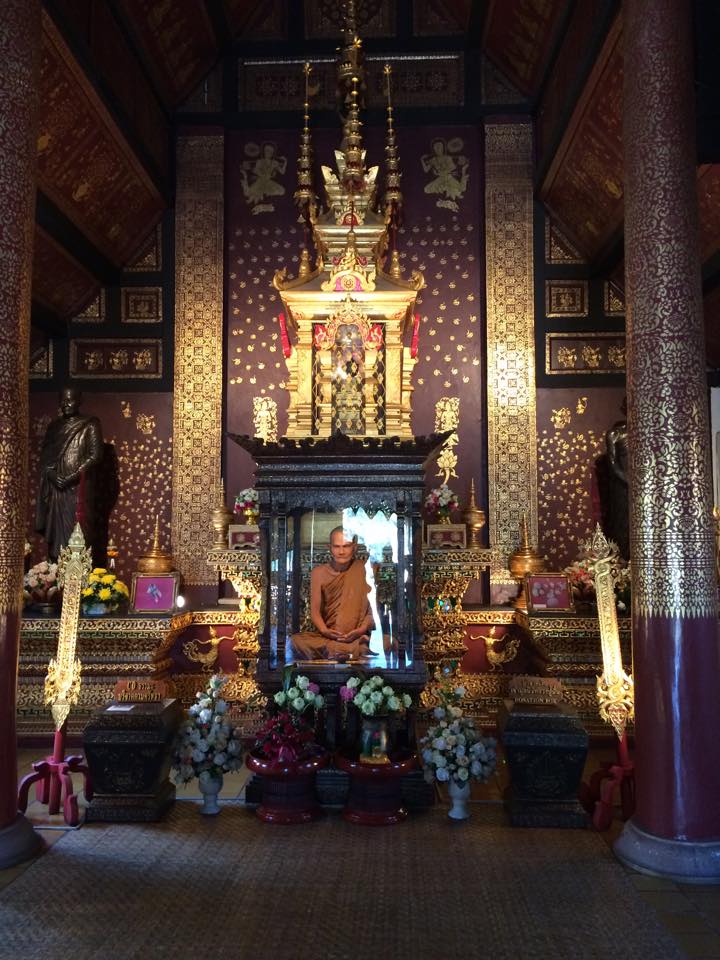 We also visited Wat Chiang Man, Chiang Mai’s oldest temple.
We also visited Wat Chiang Man, Chiang Mai’s oldest temple.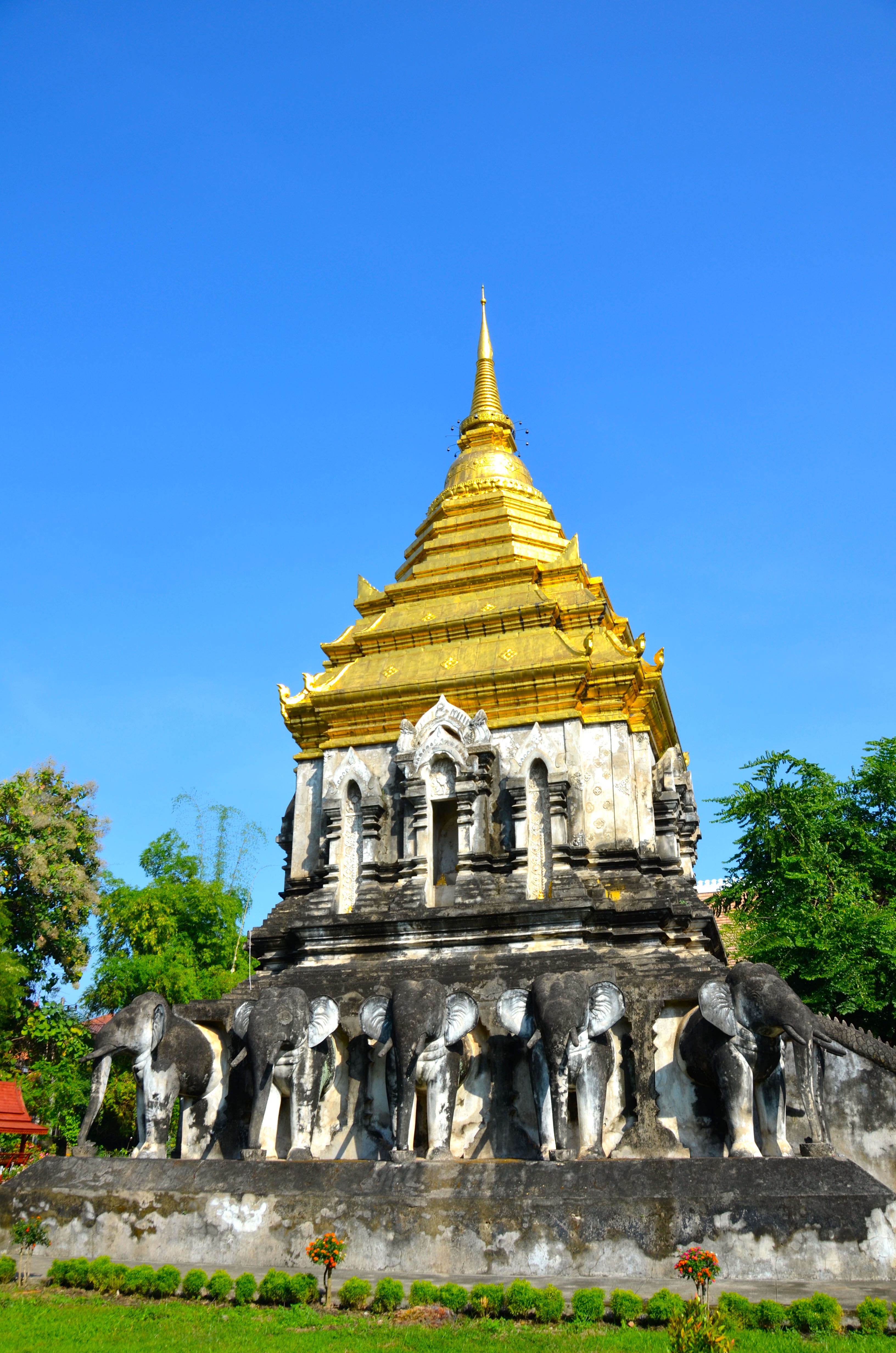
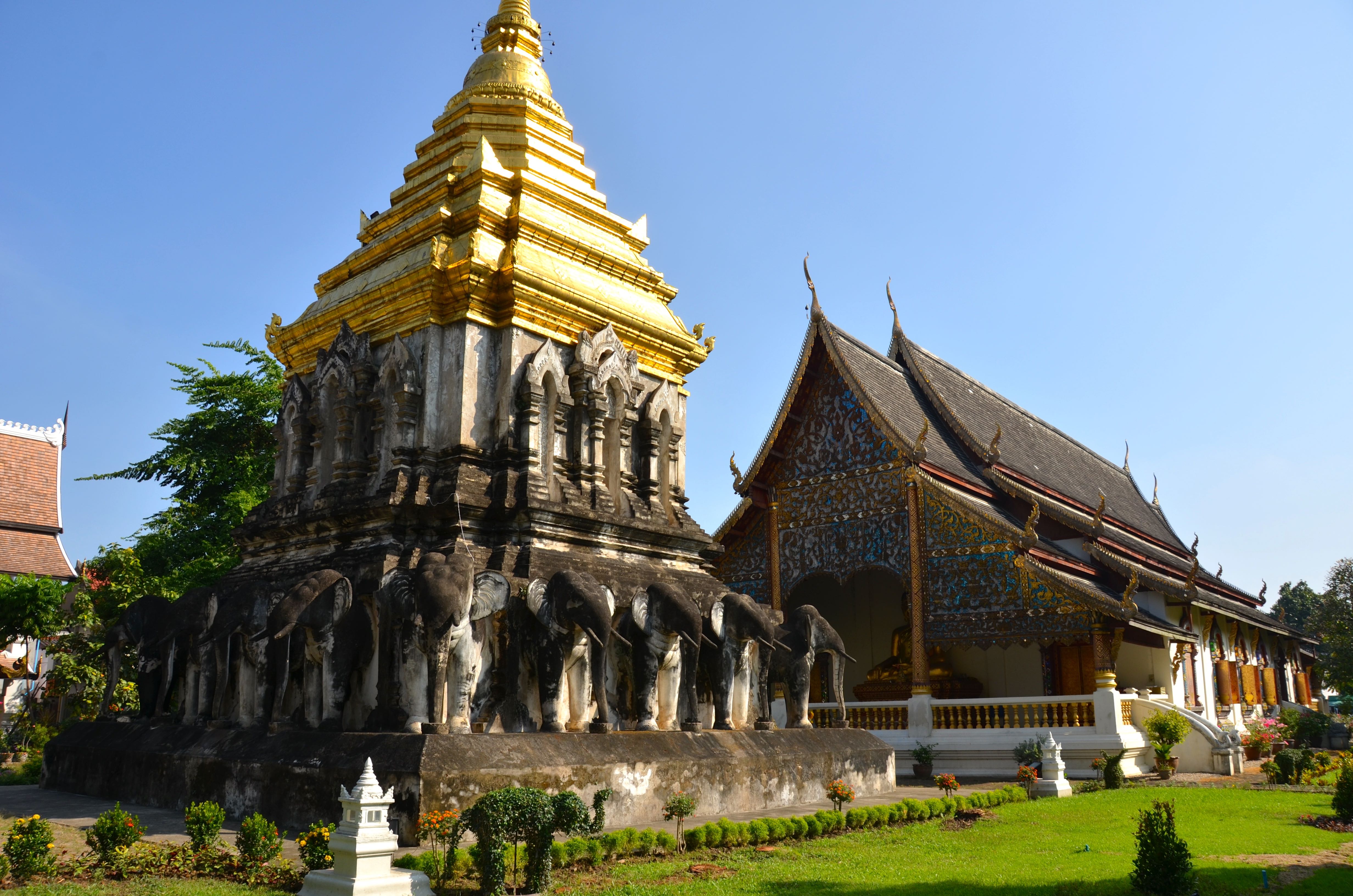
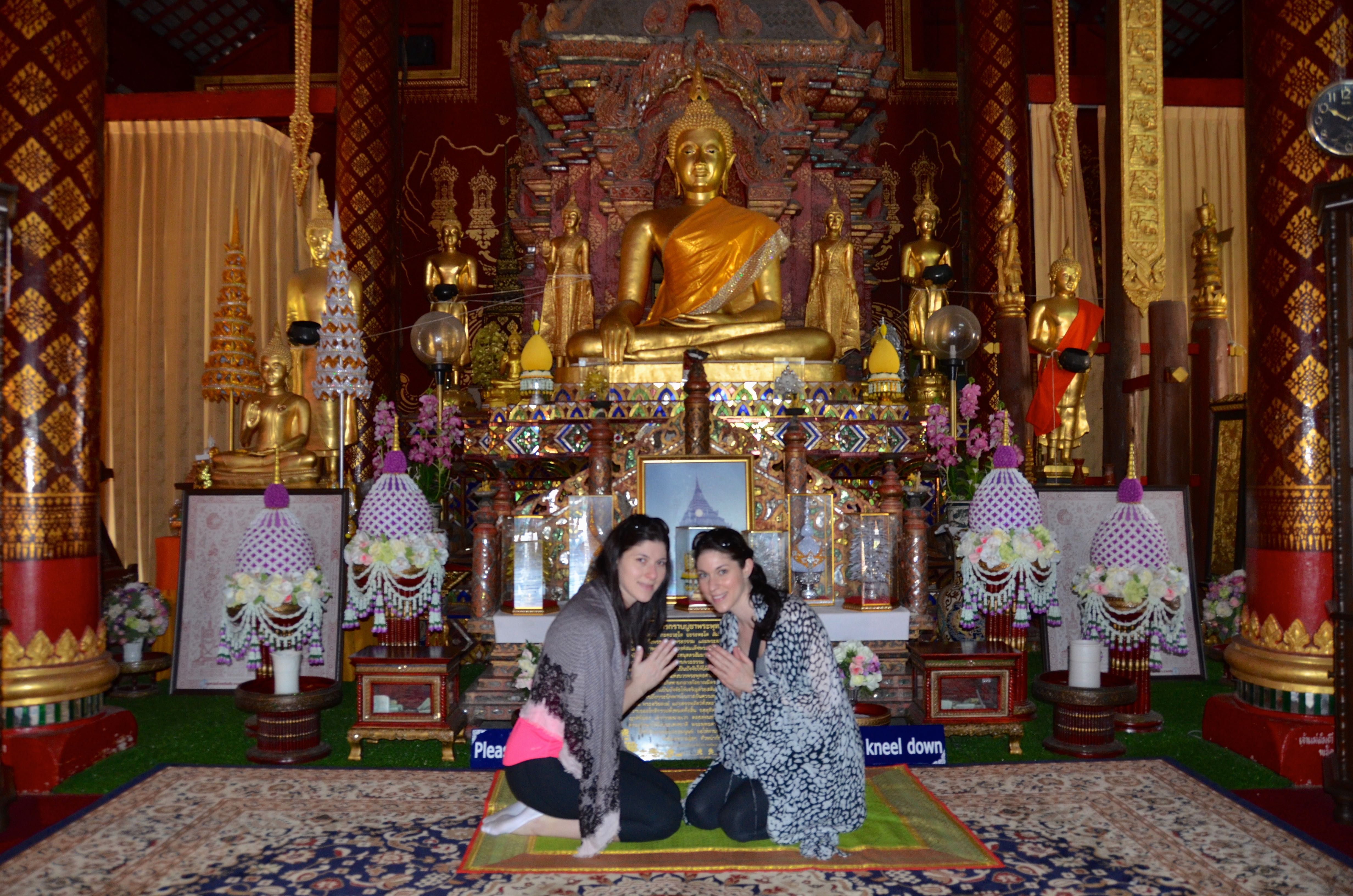
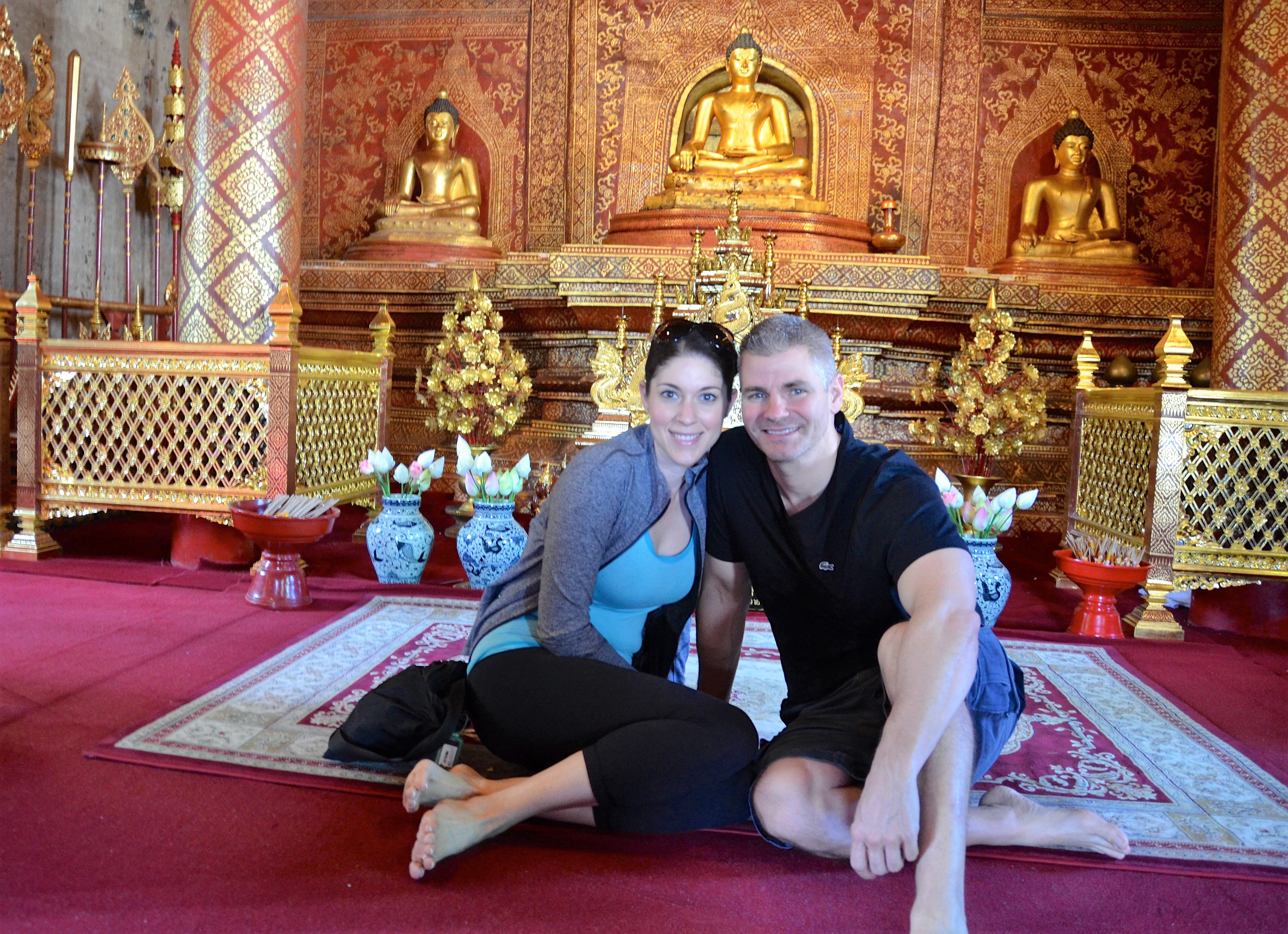
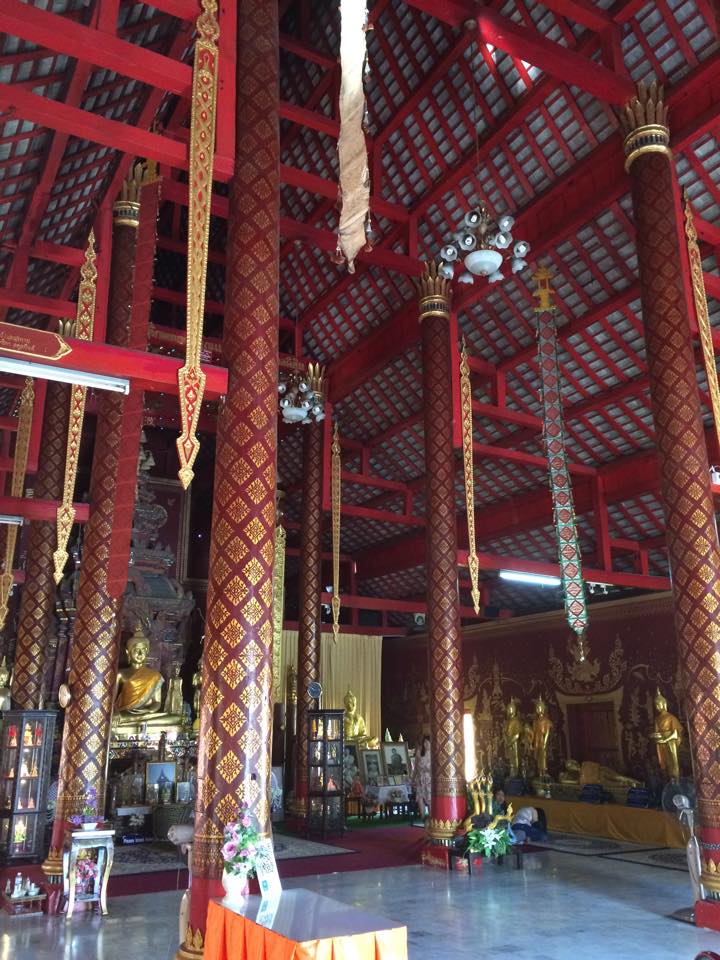
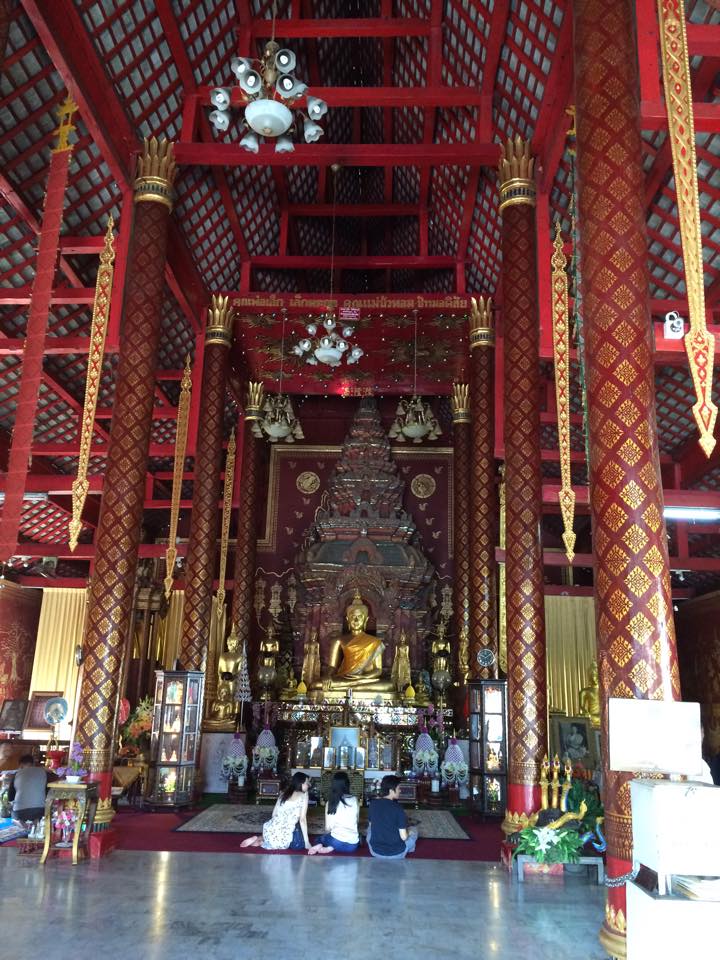 We visited some other smaller temples as well:
We visited some other smaller temples as well: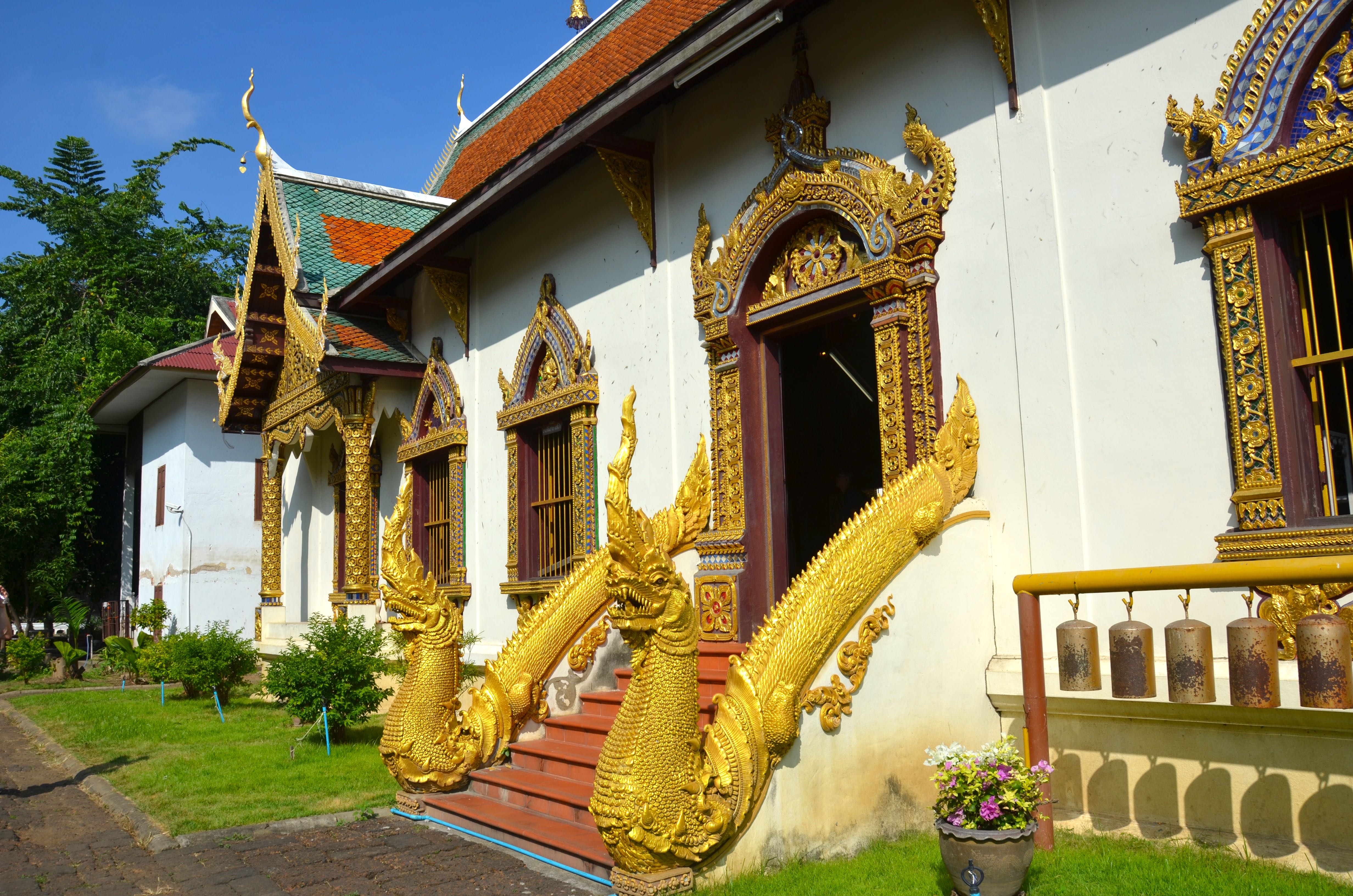
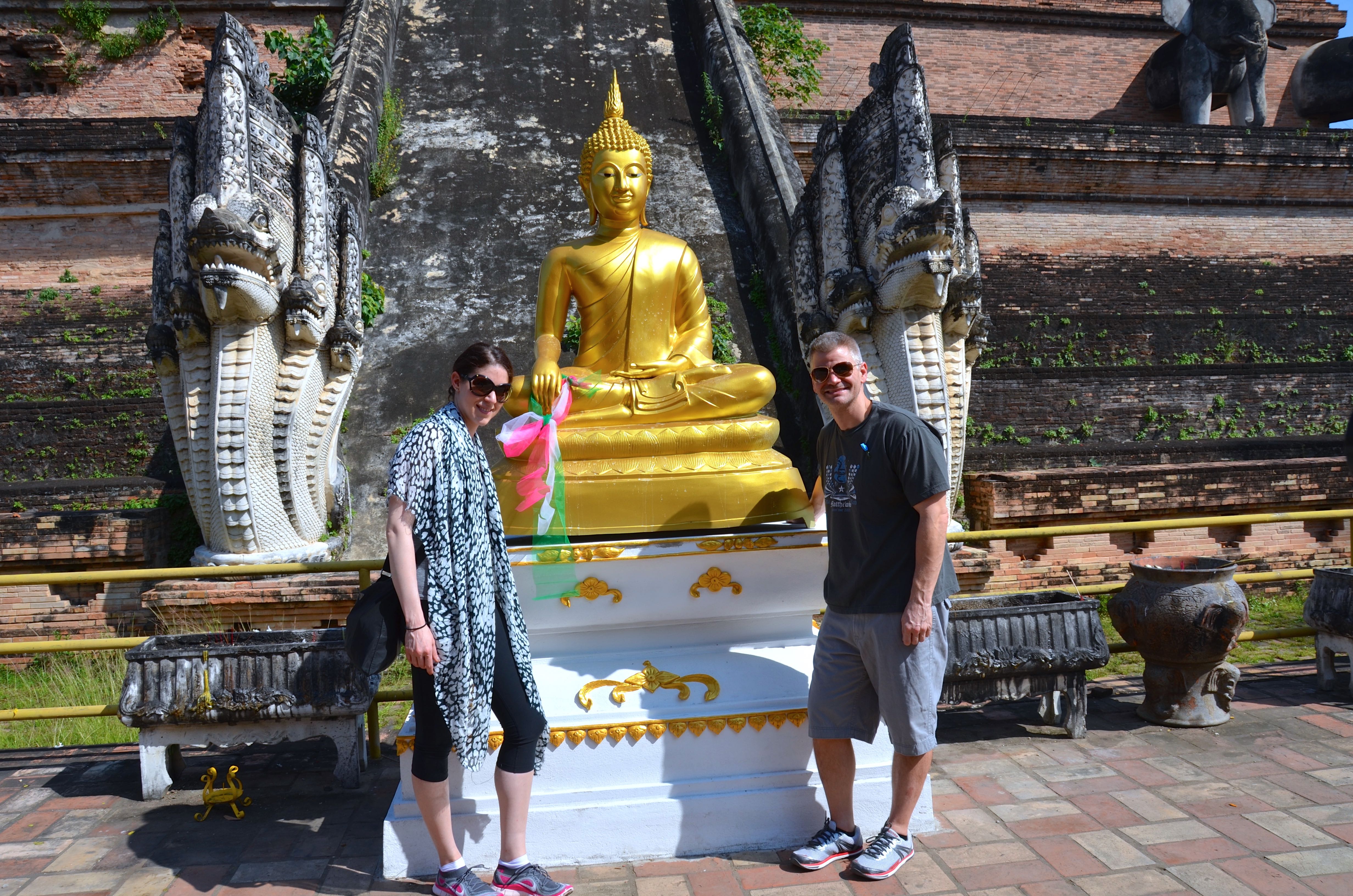
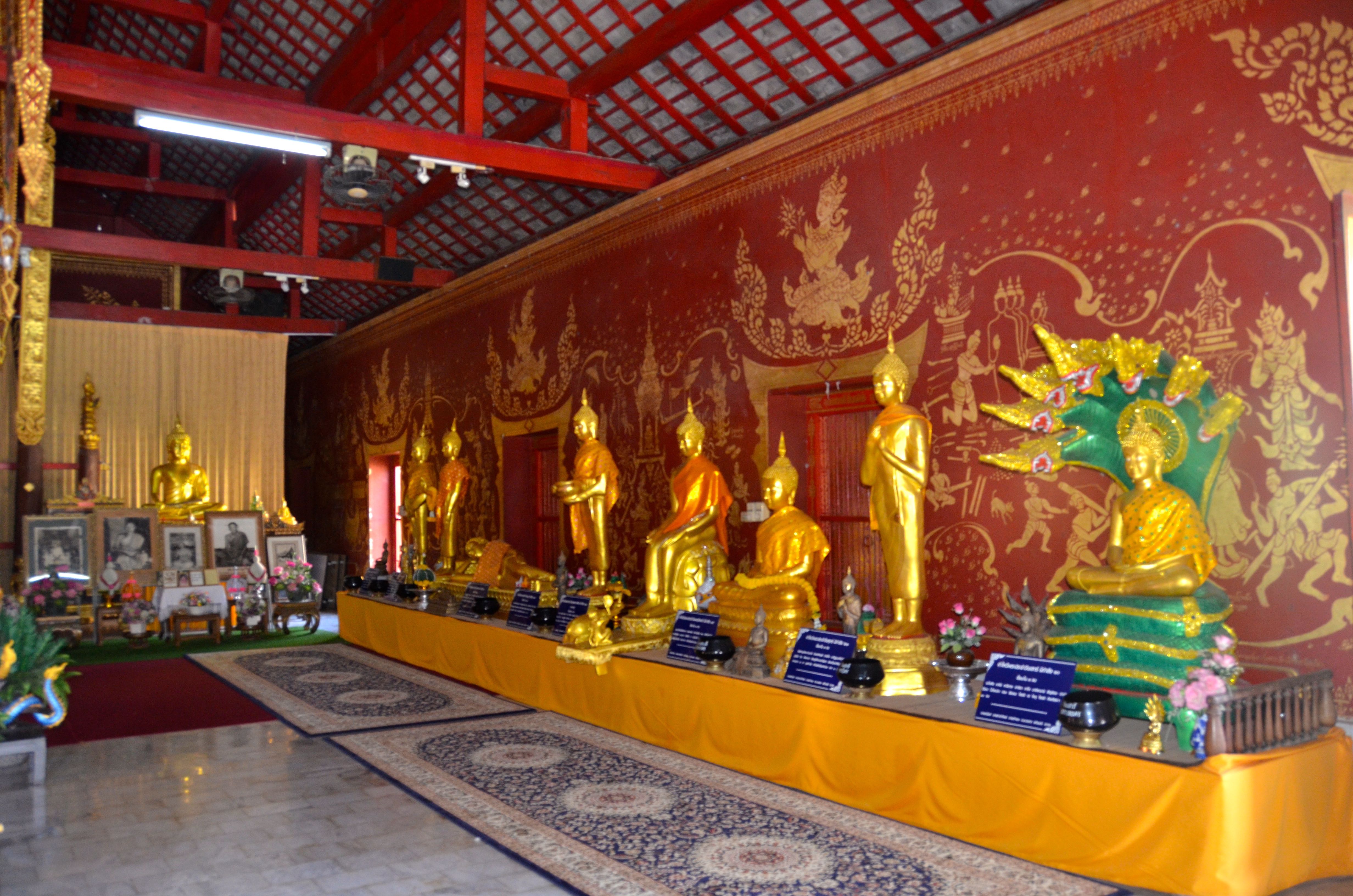
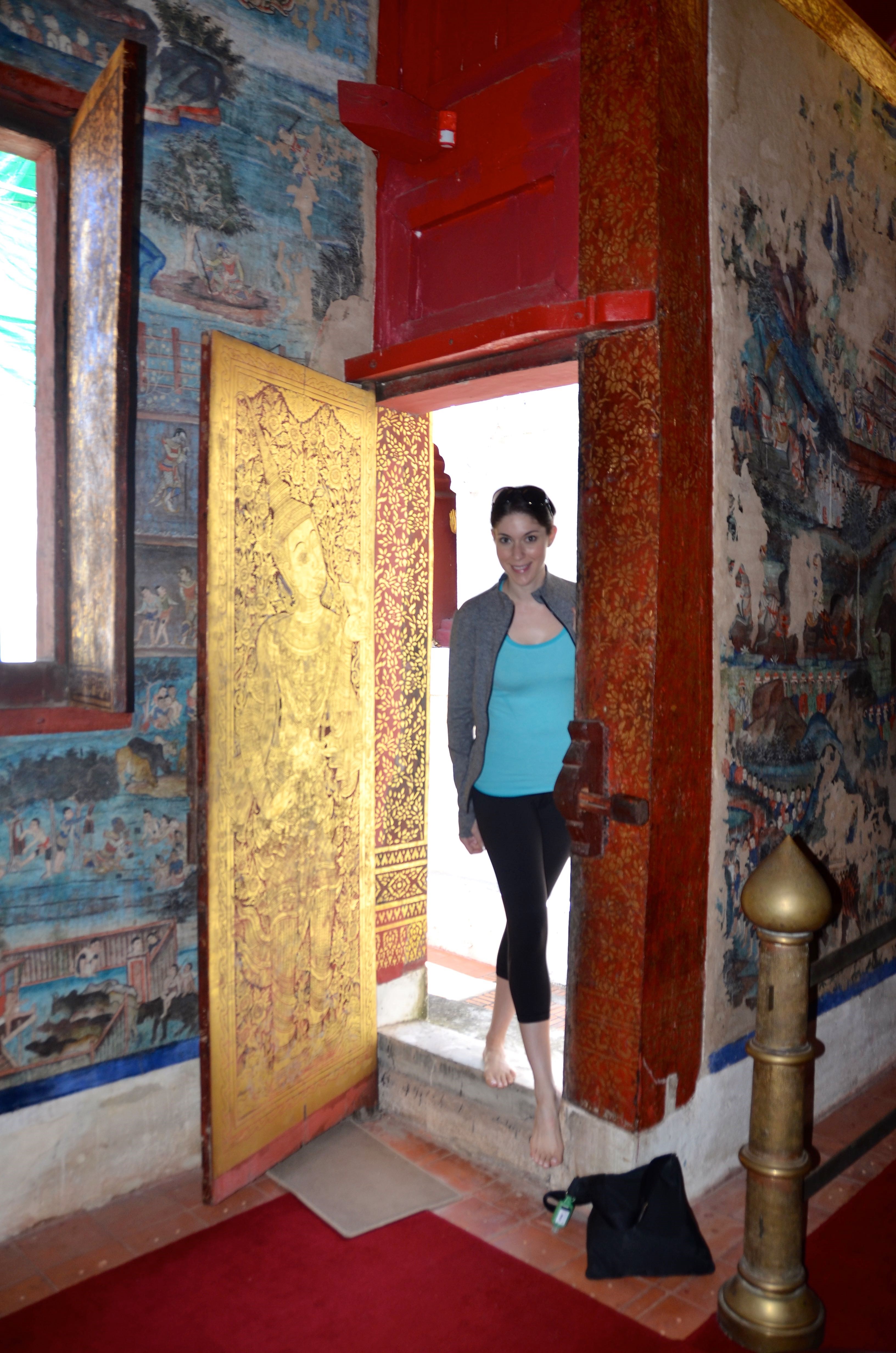
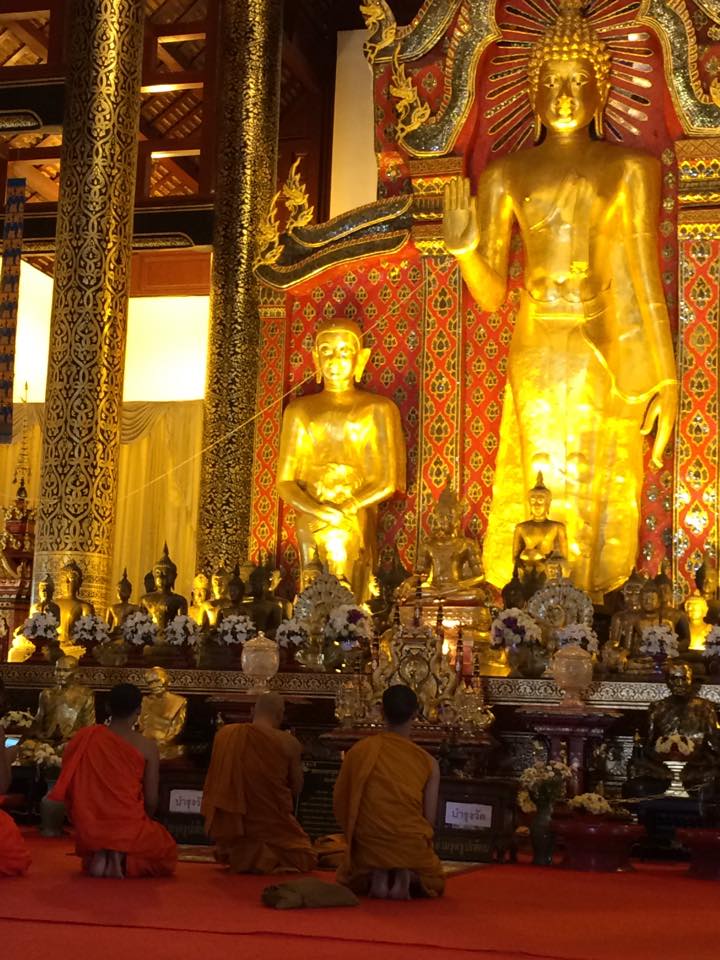
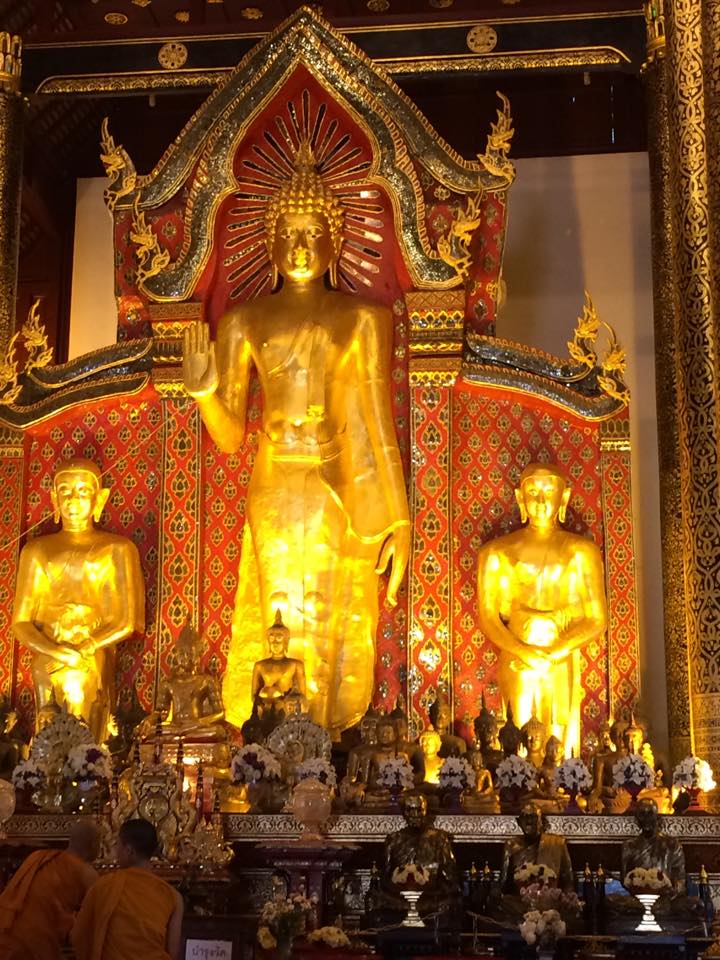
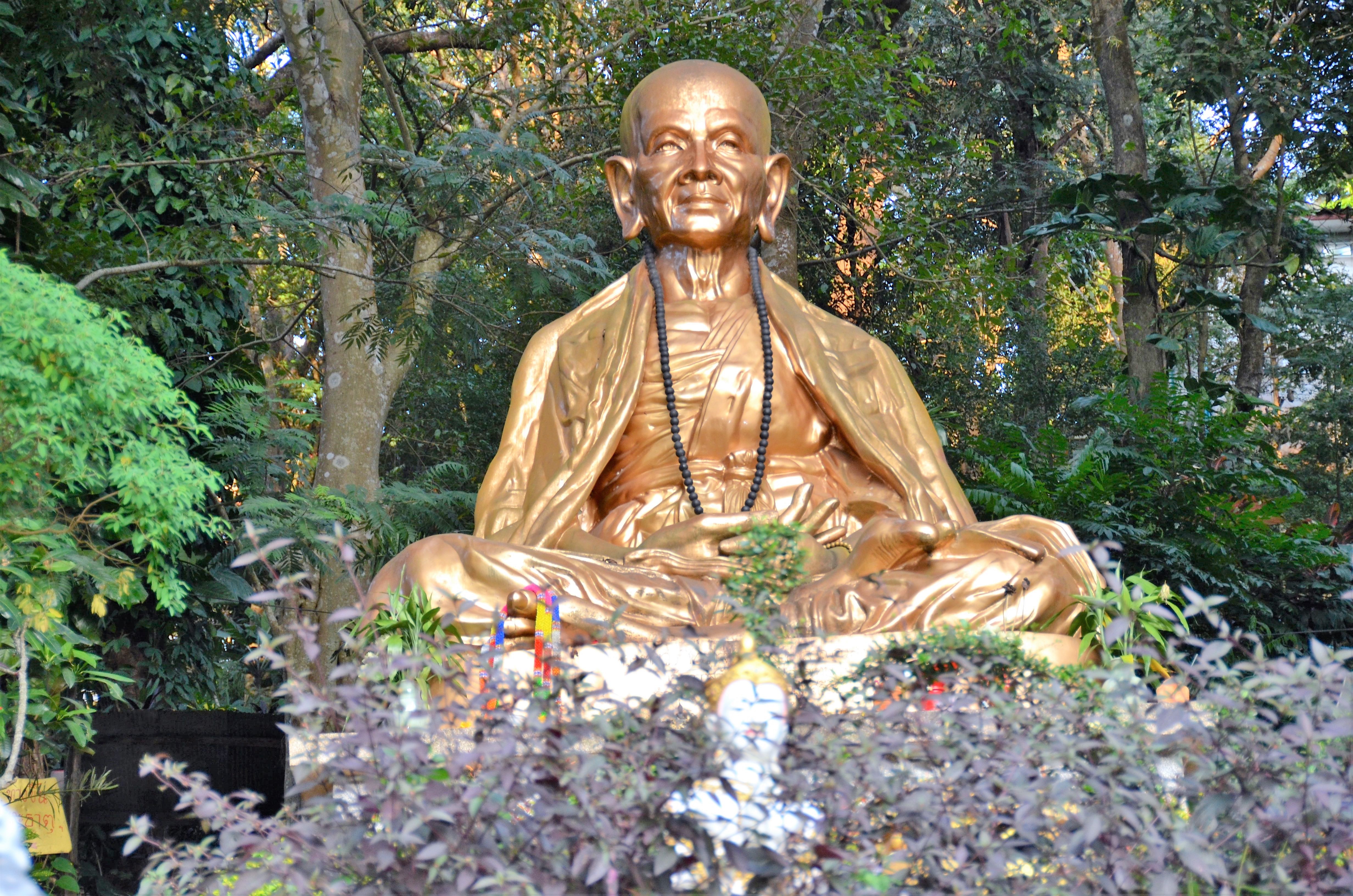 One of the coolest experiences we had while visiting the temples was a chance to sit with a novice monk and have a monk chat. You can ask the monks anything you want about life as a monk, and it gives the monks a chance to practice their English. While becoming a monk is sort of a process, it is voluntary, and a monk can return to civilian life whenever he chooses. This blog post gives a good concise explanation of the process. Monks eat twice a day and depend entirely on charity and donations in order to eat.
One of the coolest experiences we had while visiting the temples was a chance to sit with a novice monk and have a monk chat. You can ask the monks anything you want about life as a monk, and it gives the monks a chance to practice their English. While becoming a monk is sort of a process, it is voluntary, and a monk can return to civilian life whenever he chooses. This blog post gives a good concise explanation of the process. Monks eat twice a day and depend entirely on charity and donations in order to eat.
This is the monk we chatted with: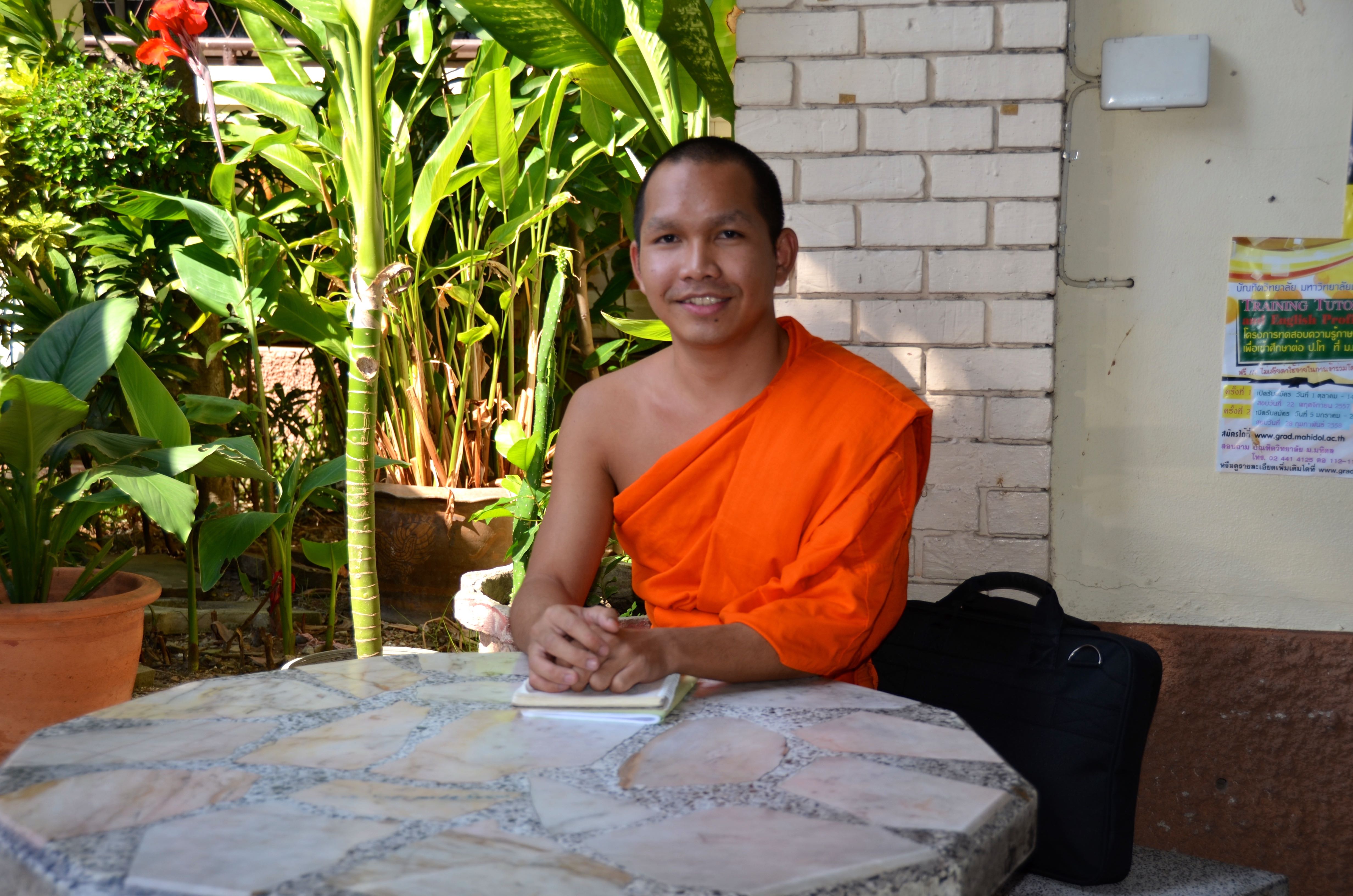 Throughout the day, we had some other monk encounters, like this one:
Throughout the day, we had some other monk encounters, like this one: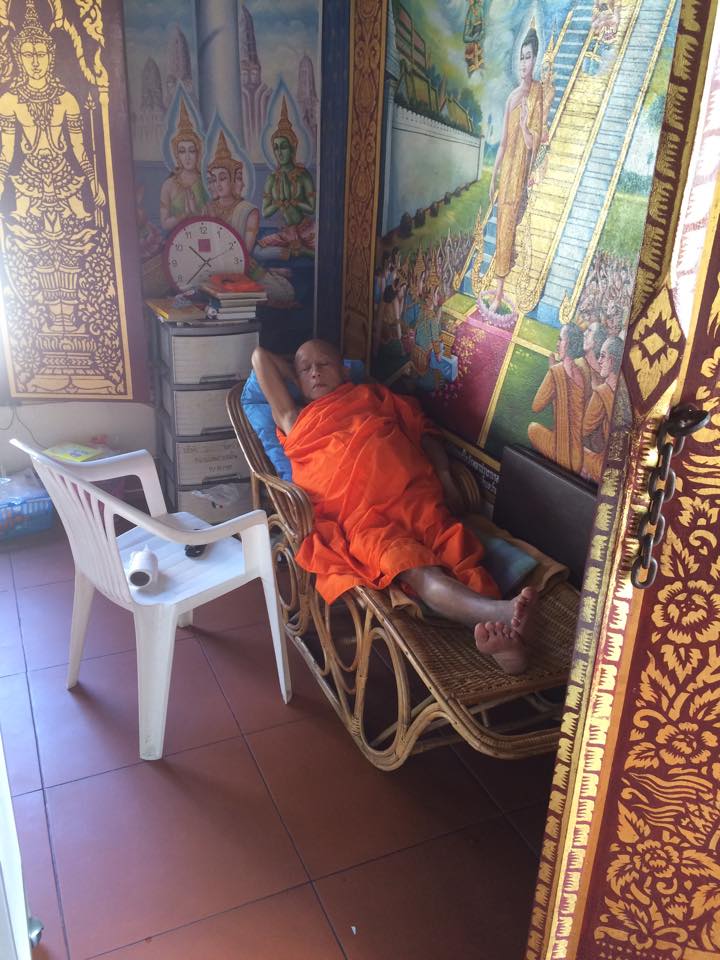 This may be a good place to tell you about one of the stranger Thai customs we encountered: Thai public restrooms. The Thai are concerned with cleanliness, so, at some of the temples, in addition to paying to use the restroom, you also have to wear what they call toilet shoes. Yes, you read that right, toilet shoes. Oddly enough, toilet shoes are public shoes that they loan you in the restroom facilities that are worn only when using the toilet. You leave your regular shoes outside. Seems kind of opposite of sanitary, right? Also, this is where you become thankful for those socks. Another odd bathroom custom are the signs that instruct you not to stand on the toilet seat and squat, but rather, to sit on the seat. I am not sure why this needs explaining, but I assume that local or indigenous people who do not have indoor plumbing sometimes take a pilgrimage to the temples and are unaccustomed to using an indoor toilet facility. I don’t know; all I know is that I was amused and grossed out at the same time.
This may be a good place to tell you about one of the stranger Thai customs we encountered: Thai public restrooms. The Thai are concerned with cleanliness, so, at some of the temples, in addition to paying to use the restroom, you also have to wear what they call toilet shoes. Yes, you read that right, toilet shoes. Oddly enough, toilet shoes are public shoes that they loan you in the restroom facilities that are worn only when using the toilet. You leave your regular shoes outside. Seems kind of opposite of sanitary, right? Also, this is where you become thankful for those socks. Another odd bathroom custom are the signs that instruct you not to stand on the toilet seat and squat, but rather, to sit on the seat. I am not sure why this needs explaining, but I assume that local or indigenous people who do not have indoor plumbing sometimes take a pilgrimage to the temples and are unaccustomed to using an indoor toilet facility. I don’t know; all I know is that I was amused and grossed out at the same time. 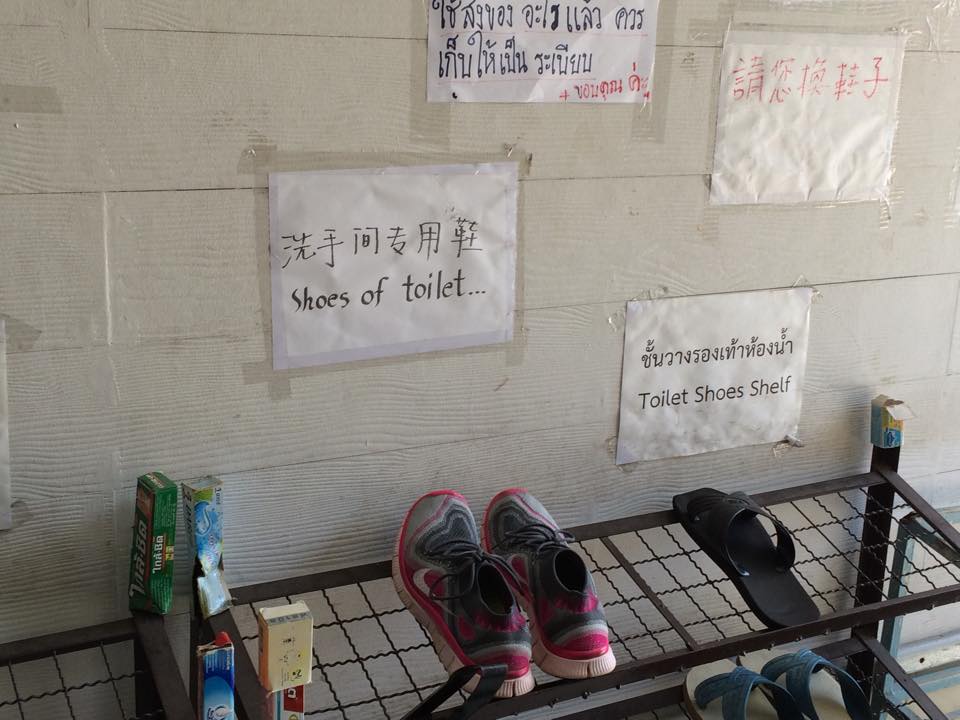
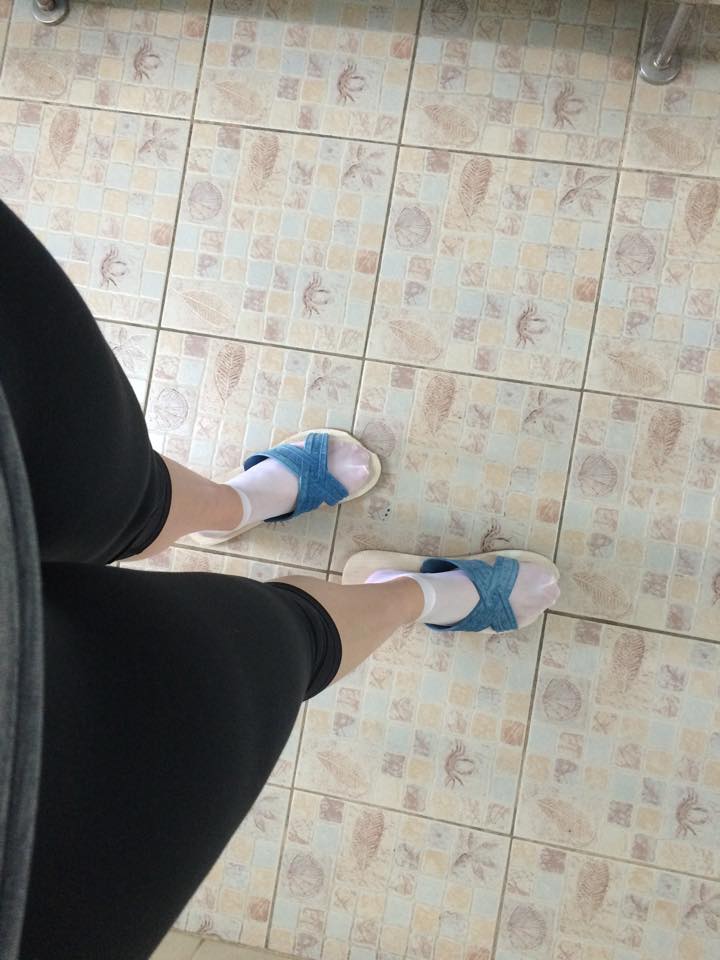
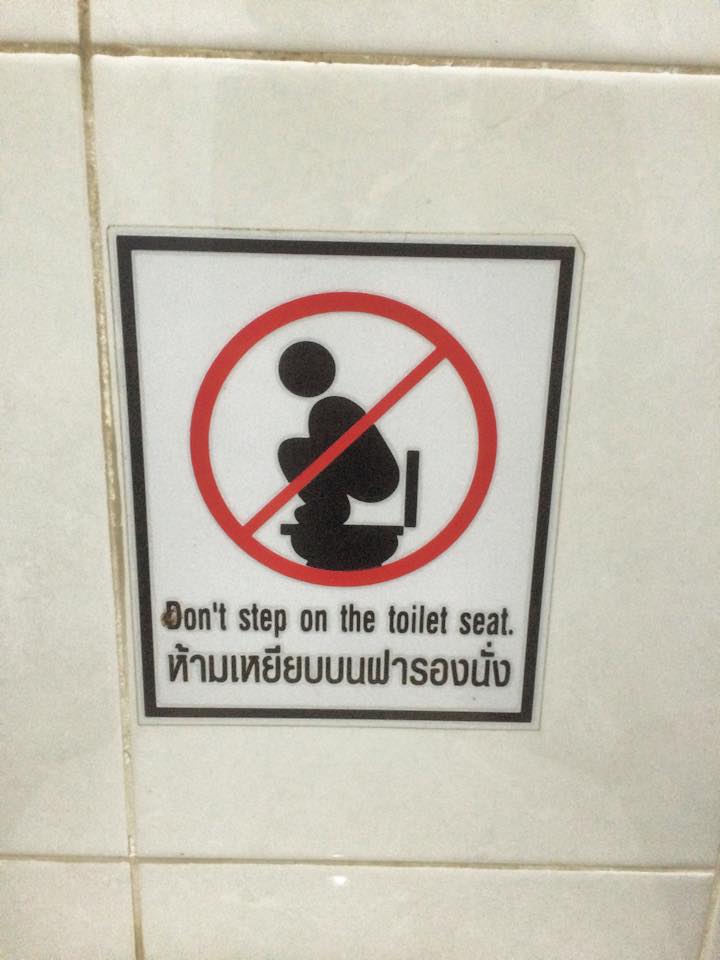
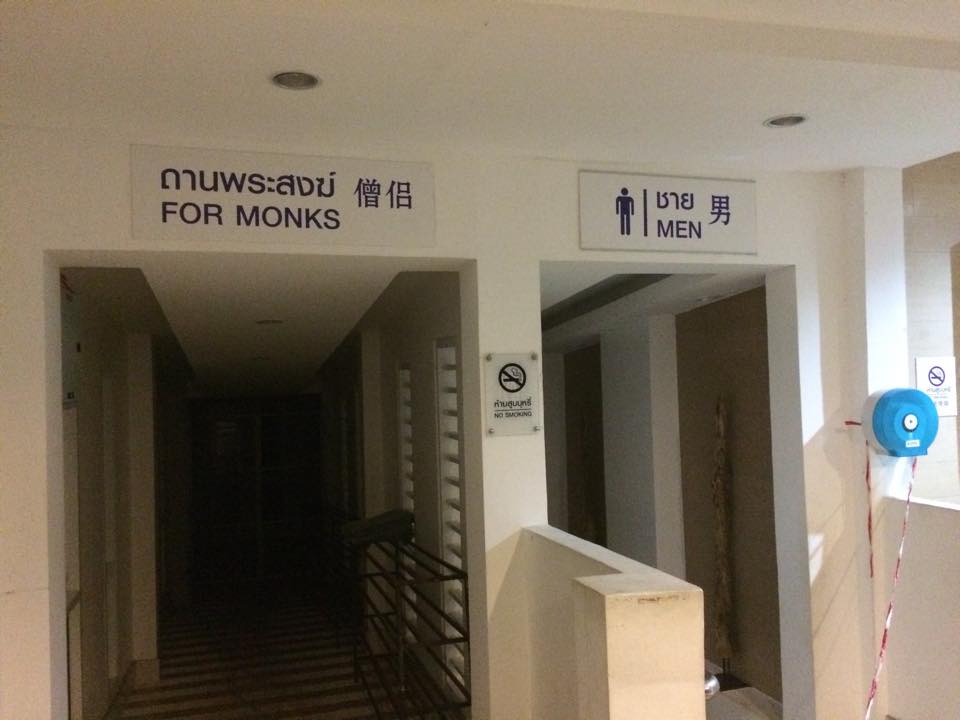 After a morning of visiting temples, we decided to spend the afternoon at a weaving cooperative where we learned about ancient weaving techniques from Thai weavers.
After a morning of visiting temples, we decided to spend the afternoon at a weaving cooperative where we learned about ancient weaving techniques from Thai weavers.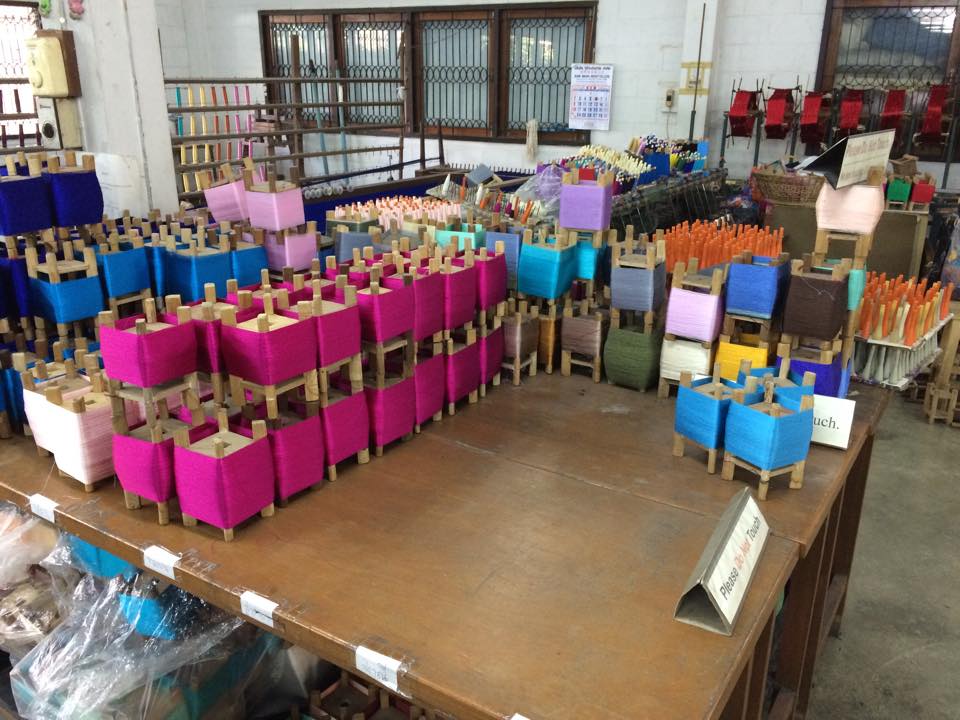
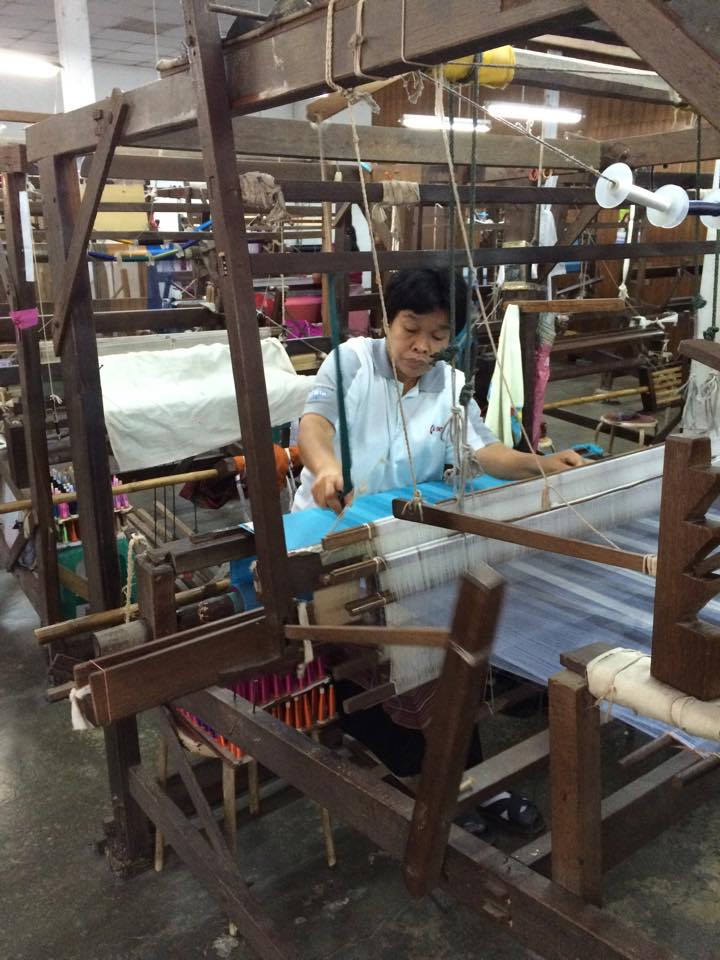 Our next order of business was to get a famous Thai foot massage! Not only was this cheap, it was an hour of pure bliss.
Our next order of business was to get a famous Thai foot massage! Not only was this cheap, it was an hour of pure bliss.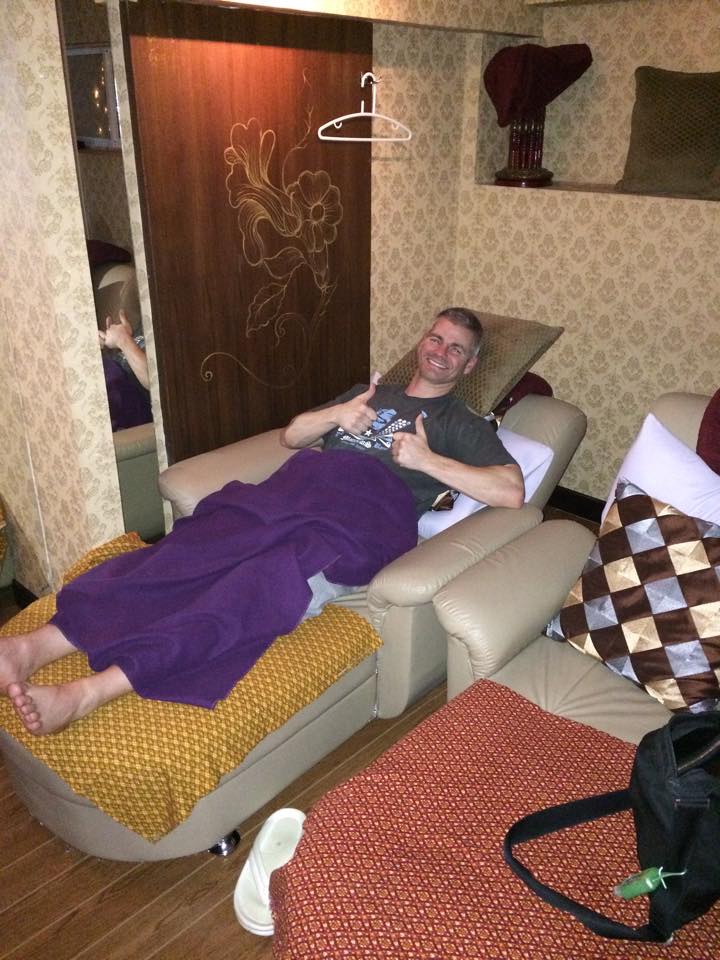 In the evening, we visited my favorite temple in all of Thailand, Wat Phra That Doi Suthep, to watch the sunset ritual. You have to climb over 300 steps just to get to the temple, but it is sooooo worth it. In addition to the temple, there is monastery on top where regular people can stay and join a silent meditation program. You get a lotus flower when you come in, and, at sunset, the temple bells begin to ring. The monks come out in a processional and all chant prayers together. You, along with the silent retreaters who are wearing all white, can join the monks as they circle the temple and kneel to pray. It was a magical and spiritual experience, and one of my favorite during out visit to Thailand.
In the evening, we visited my favorite temple in all of Thailand, Wat Phra That Doi Suthep, to watch the sunset ritual. You have to climb over 300 steps just to get to the temple, but it is sooooo worth it. In addition to the temple, there is monastery on top where regular people can stay and join a silent meditation program. You get a lotus flower when you come in, and, at sunset, the temple bells begin to ring. The monks come out in a processional and all chant prayers together. You, along with the silent retreaters who are wearing all white, can join the monks as they circle the temple and kneel to pray. It was a magical and spiritual experience, and one of my favorite during out visit to Thailand. 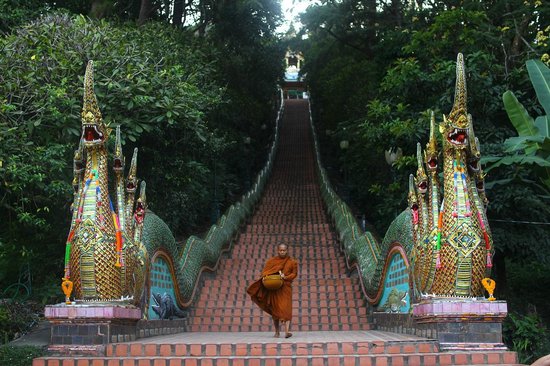
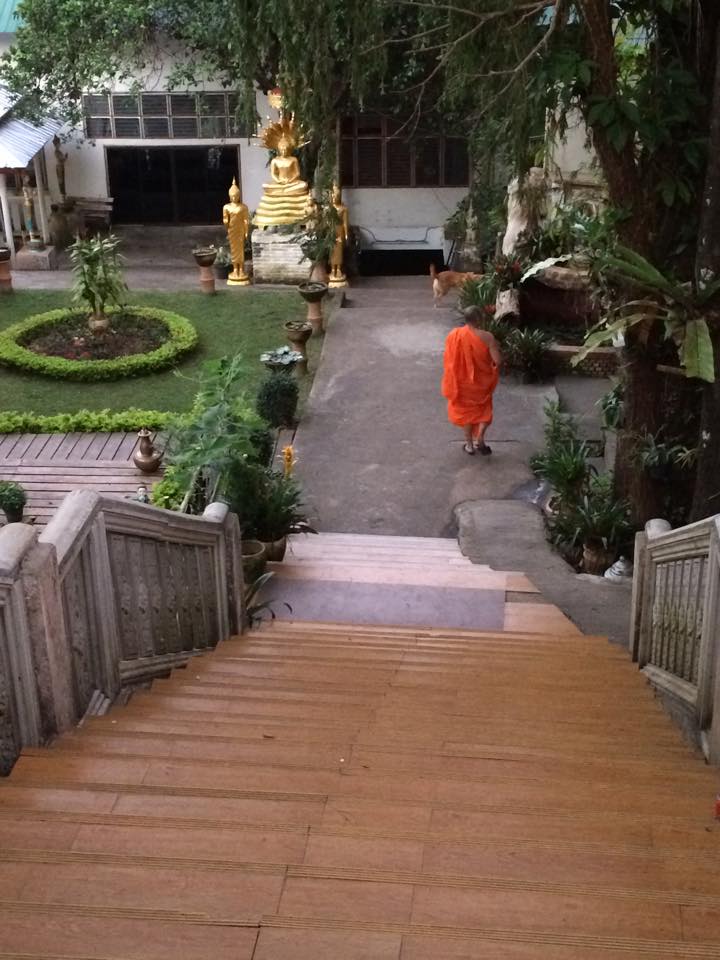

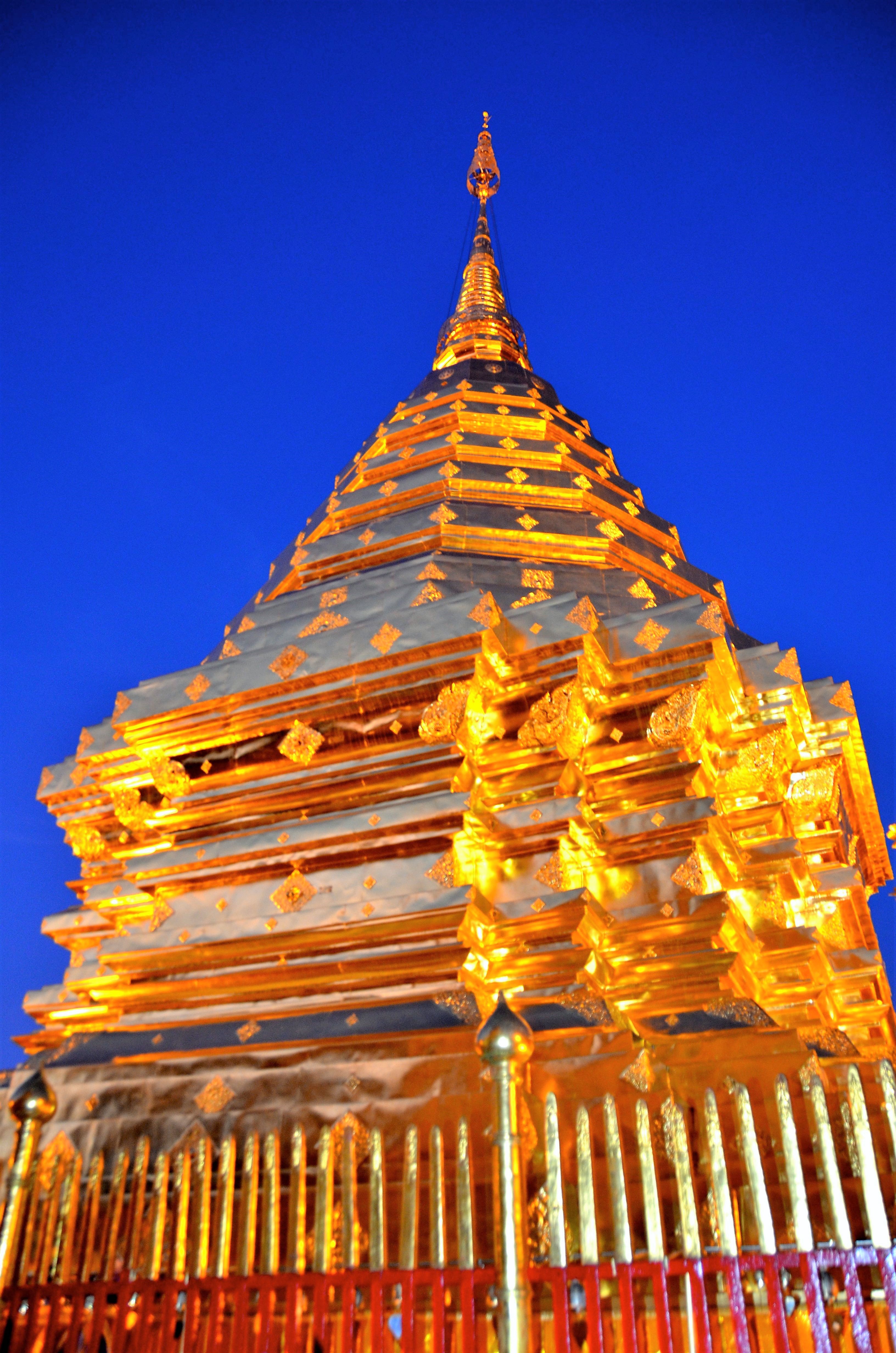
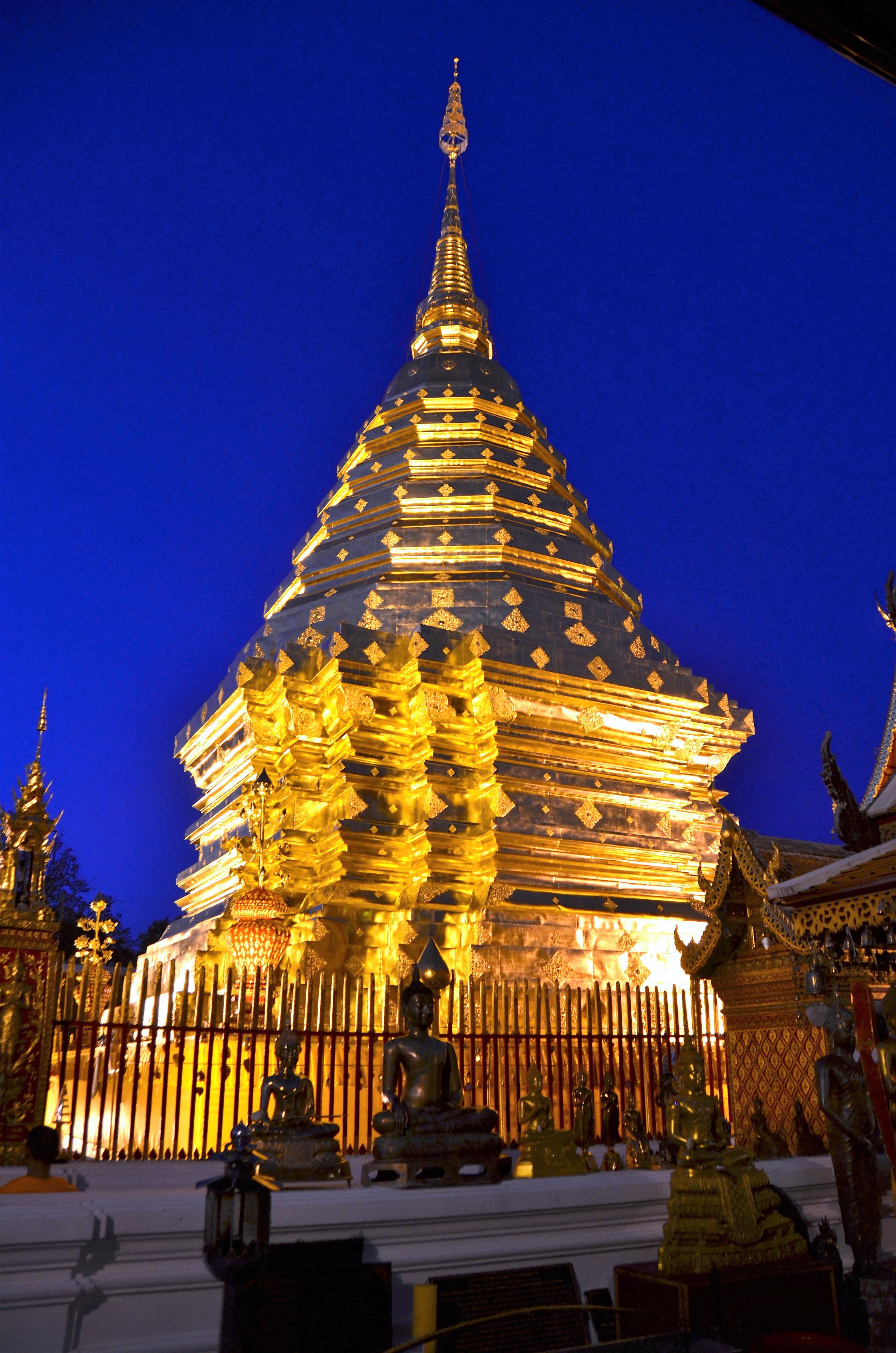
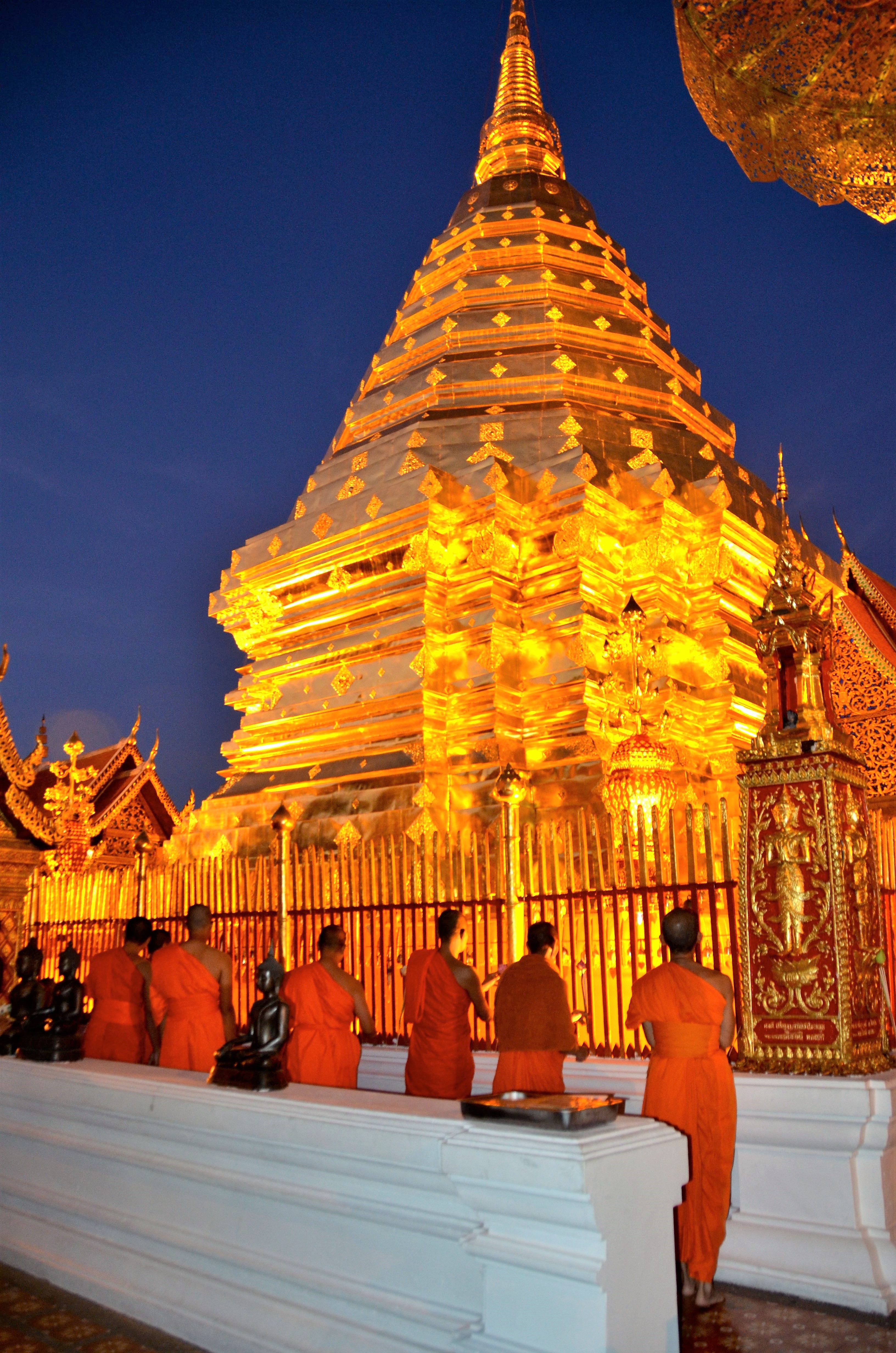
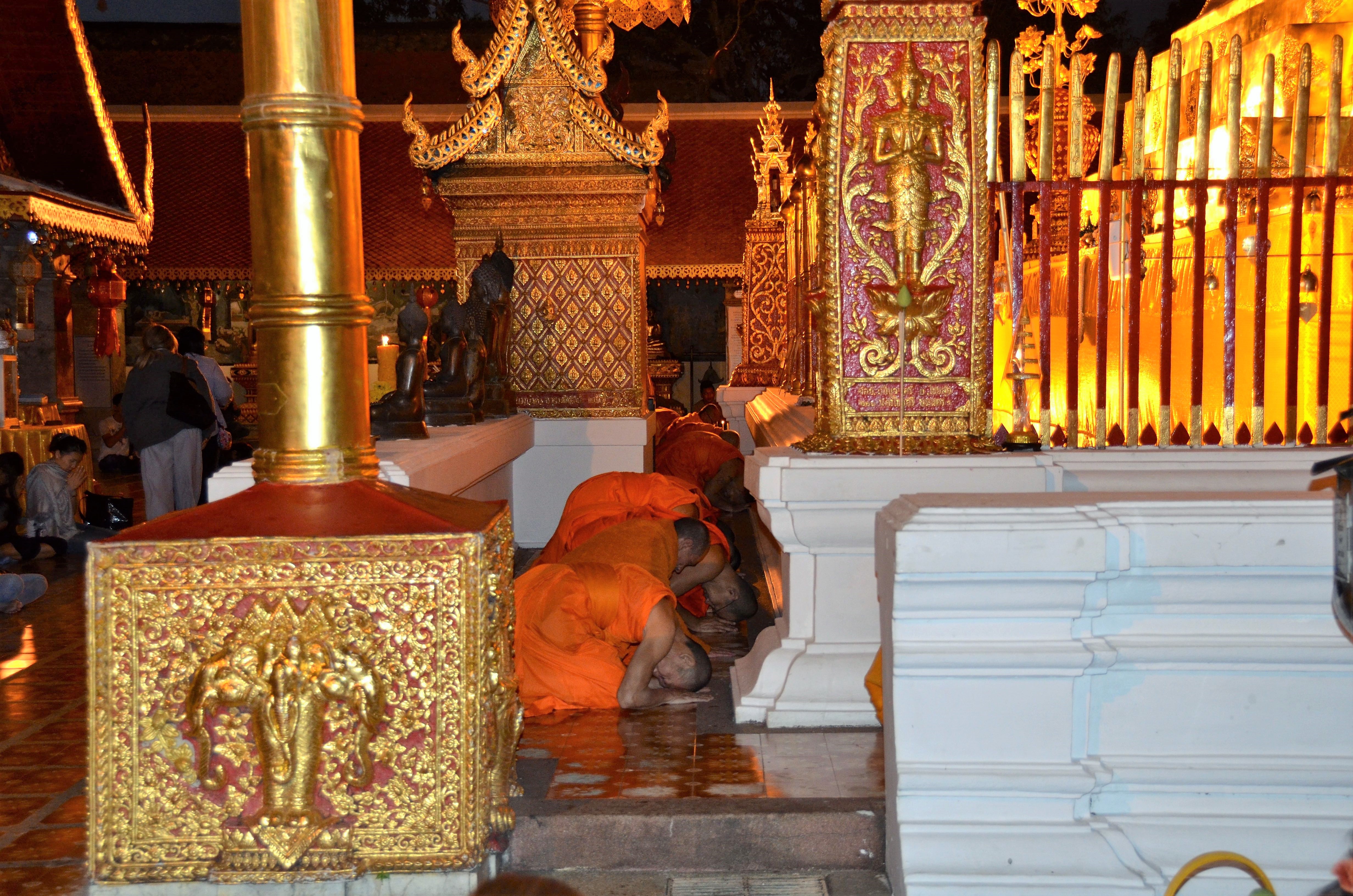
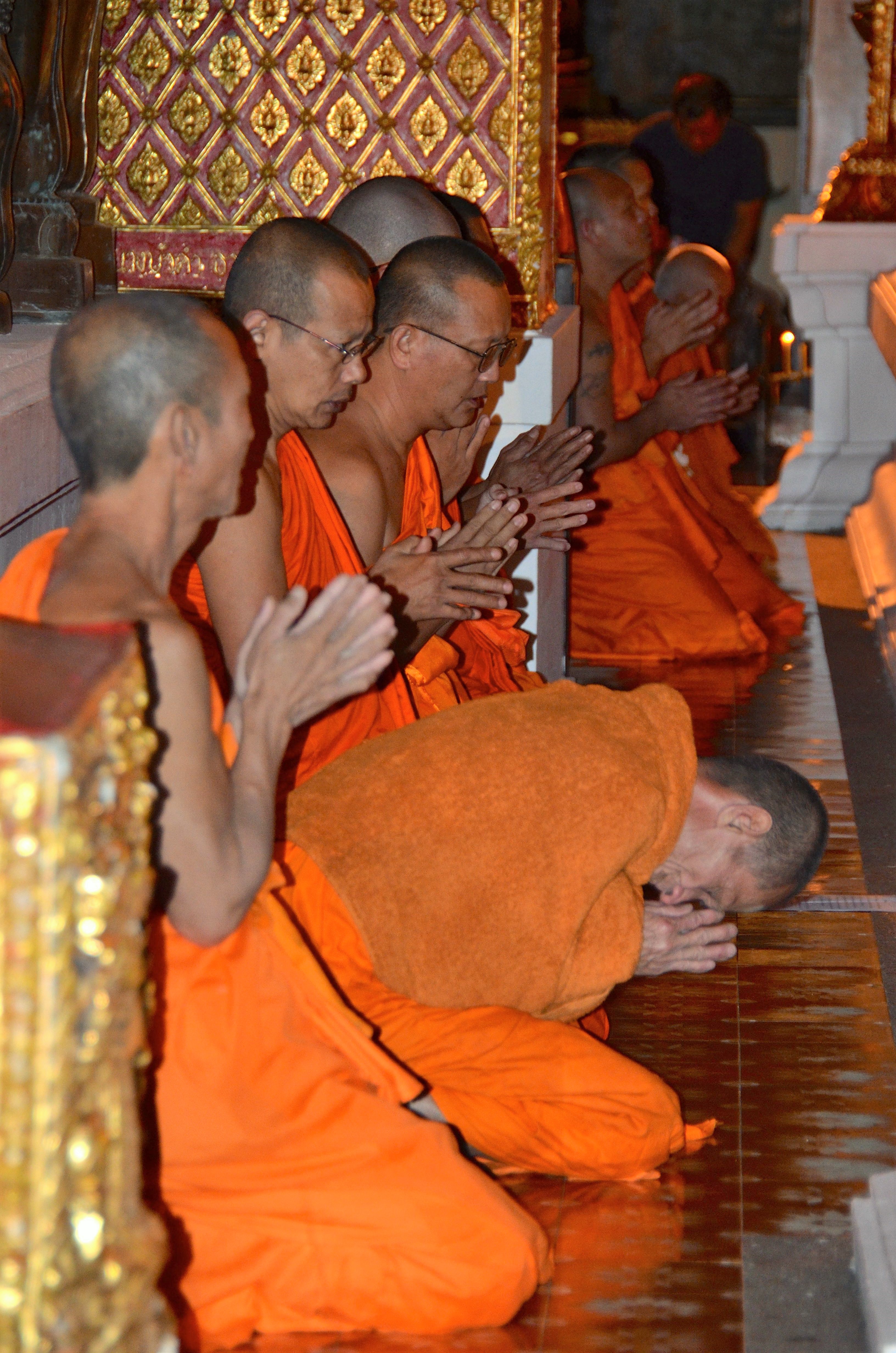
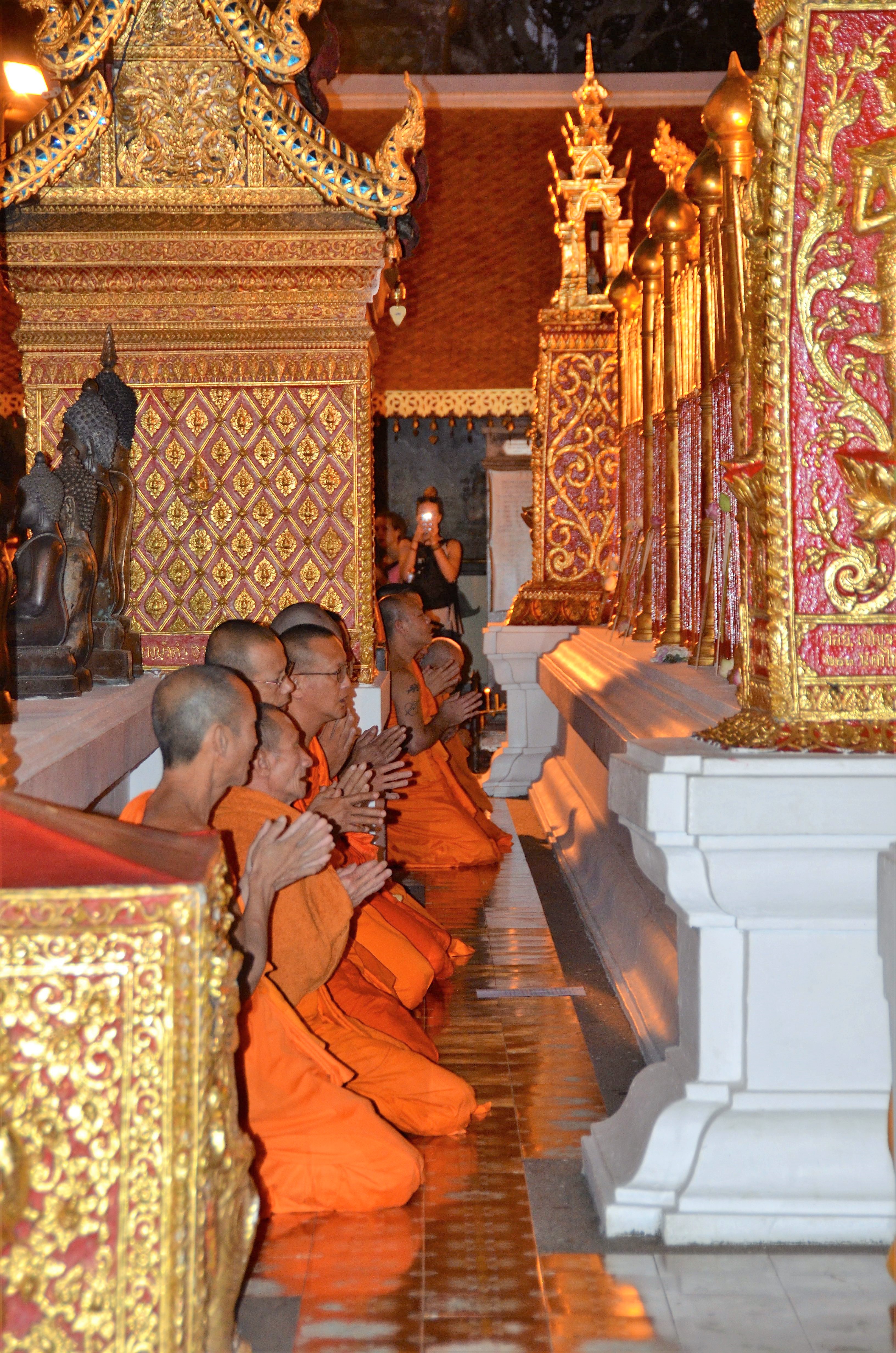
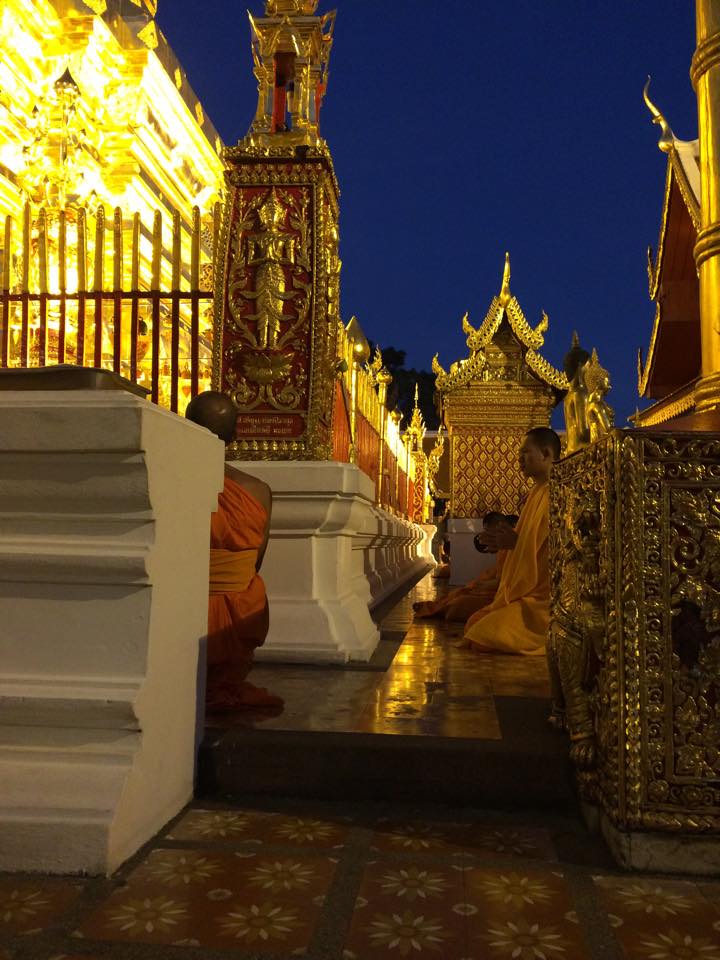
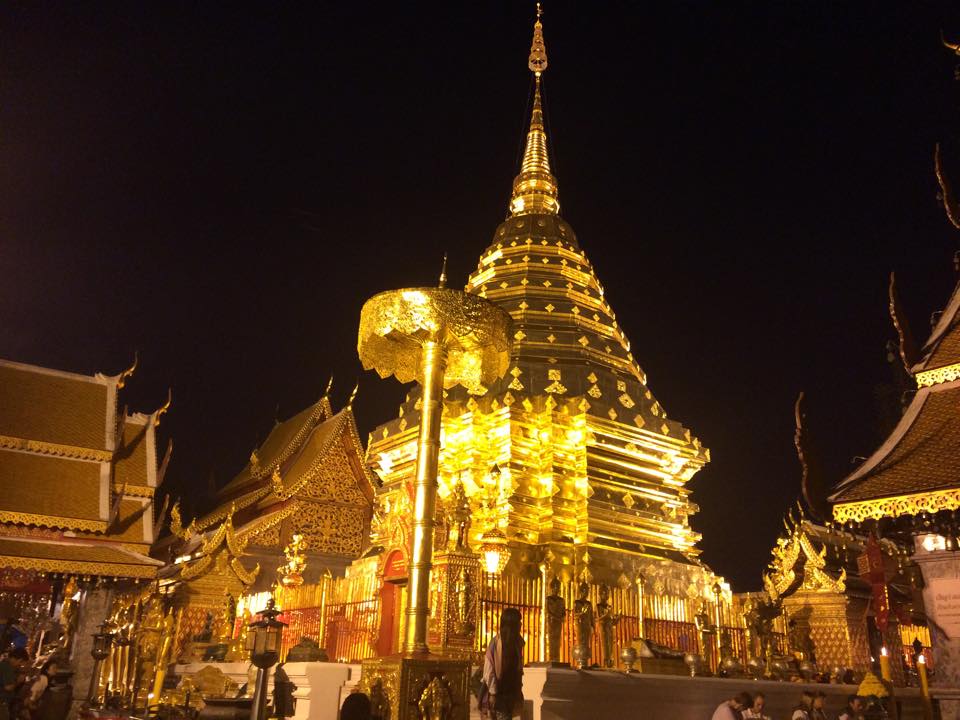
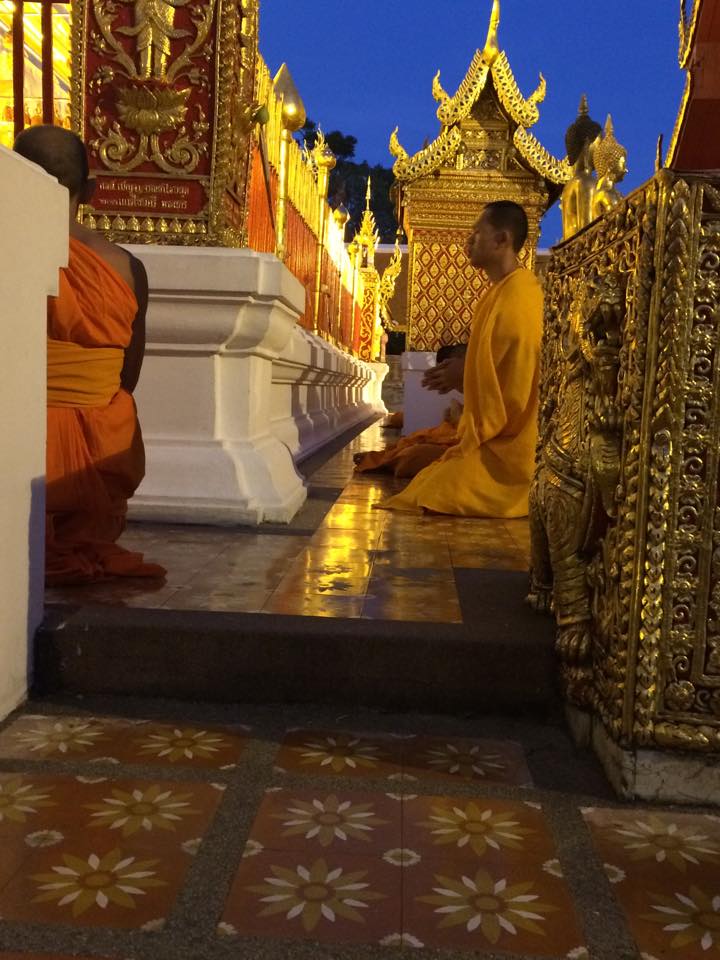
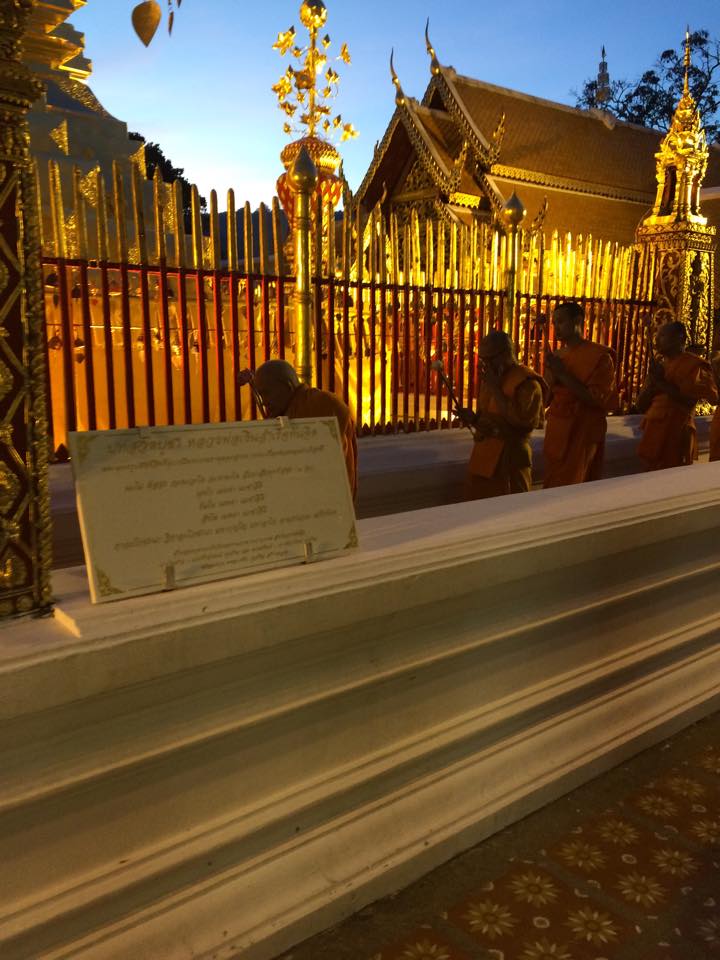
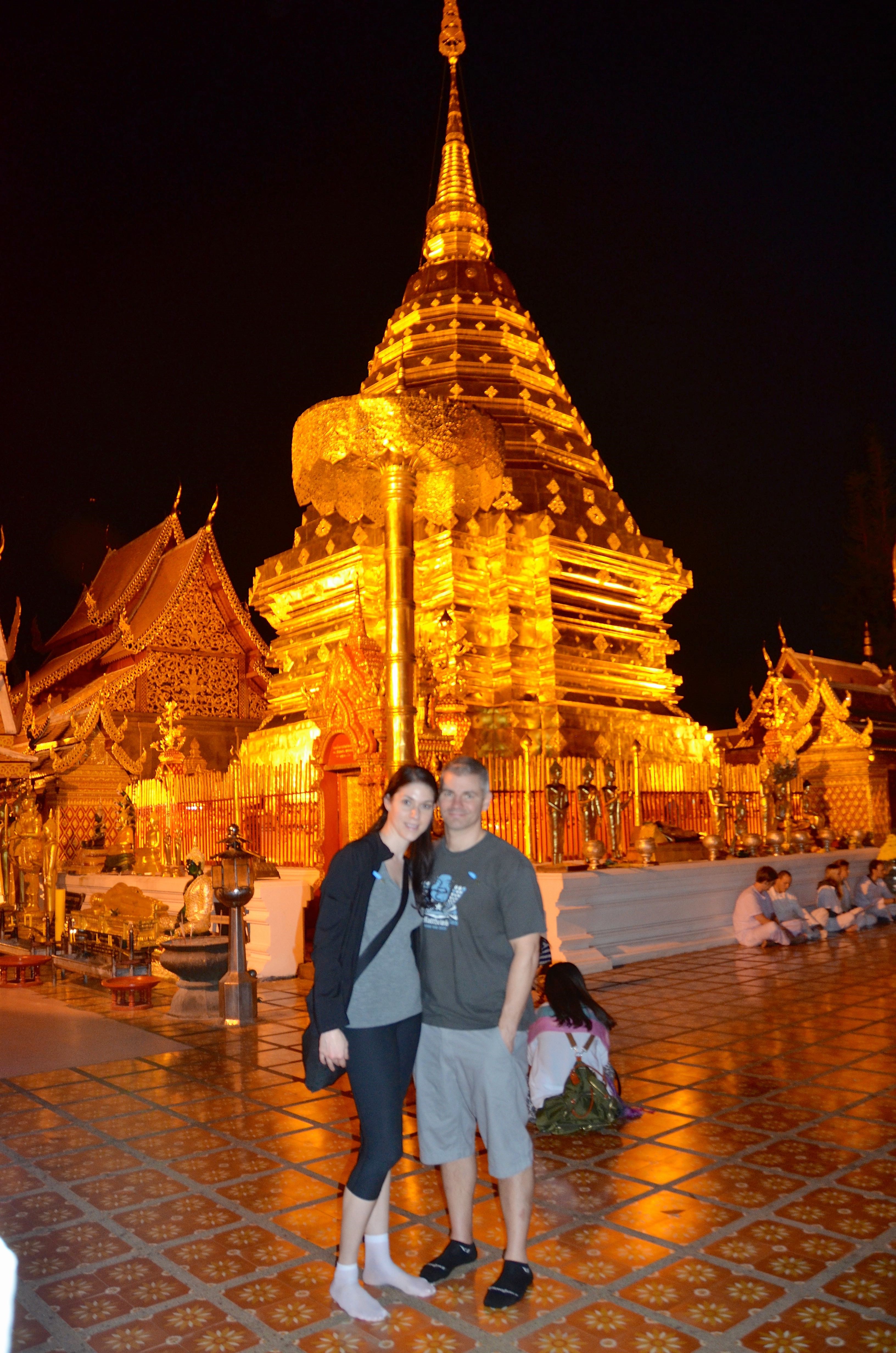 I thought it was going to be hard to top our first day in Chiang Mai, but I was wrong. On our second day, we visited Patara Elephant Farm, and this was by far my most favorite experience in Thailand.
I thought it was going to be hard to top our first day in Chiang Mai, but I was wrong. On our second day, we visited Patara Elephant Farm, and this was by far my most favorite experience in Thailand. 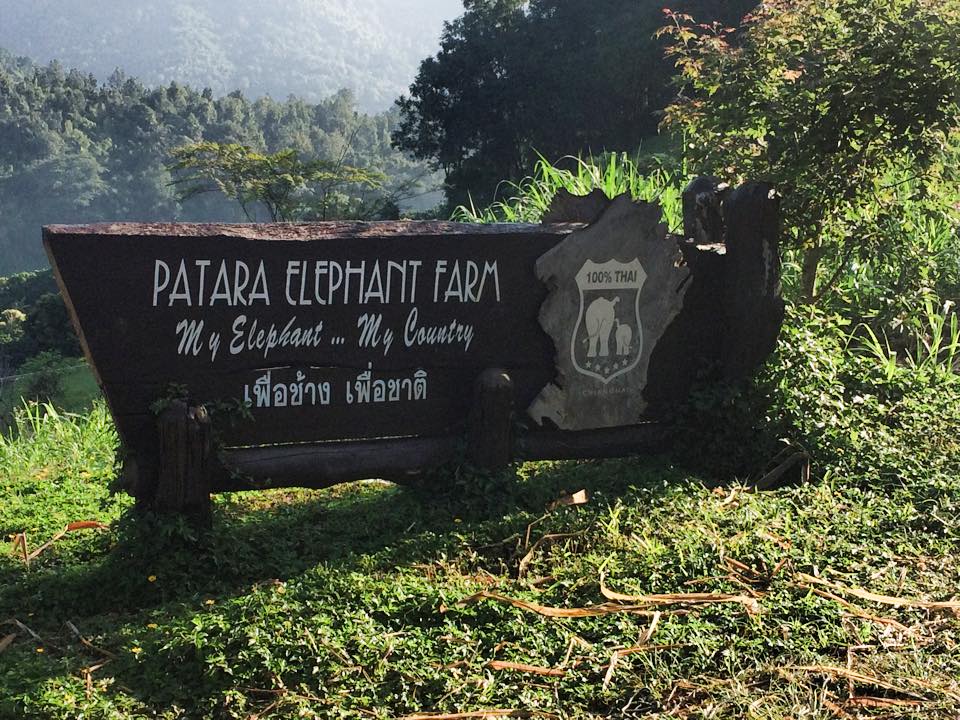 Before I tell you about out incredible experience here, I strongly encourage you to read my post about being a socially conscientious traveler. If you know Chad and I well, then you know that we are major animal lovers, and we would never intentionally support, visit, or participate in an activity that exploited animals.
Before I tell you about out incredible experience here, I strongly encourage you to read my post about being a socially conscientious traveler. If you know Chad and I well, then you know that we are major animal lovers, and we would never intentionally support, visit, or participate in an activity that exploited animals.
Elephant tourism is very popular in Thailand, and that often means that the elephant is being mistreated for the sake of tourism and revenue generation. While Chad and I were very excited about the possibility to have one-on-one interaction with these beautiful, gentle giants, we love animals and we did not want visit a program that exploited them. After a copious amount of vetting, we visited Patara Elephant Farm, which is an elephant conservation organization that rescues unwanted or formerly exploited elephants with the goal of preserving the Asian elephant population in Thailand. Patara emphasizes education about the plight of the elephant with programs that allow you to learn about elephants while participating in their daily care. Their “mahout” for a day program, includes a bareback ride on the elephant. We did not see bull hooks being used, and, importantly, there were no chairs or wicker basket strapped to the backs of elephants to facilitate the ride, which hurts the elephant.
When we got to Patara, we were introduced to the baby and juvenile elephants and got a chance to feed them and interact with them. This included petting them and getting elephant hugs and kisses. I was already in love.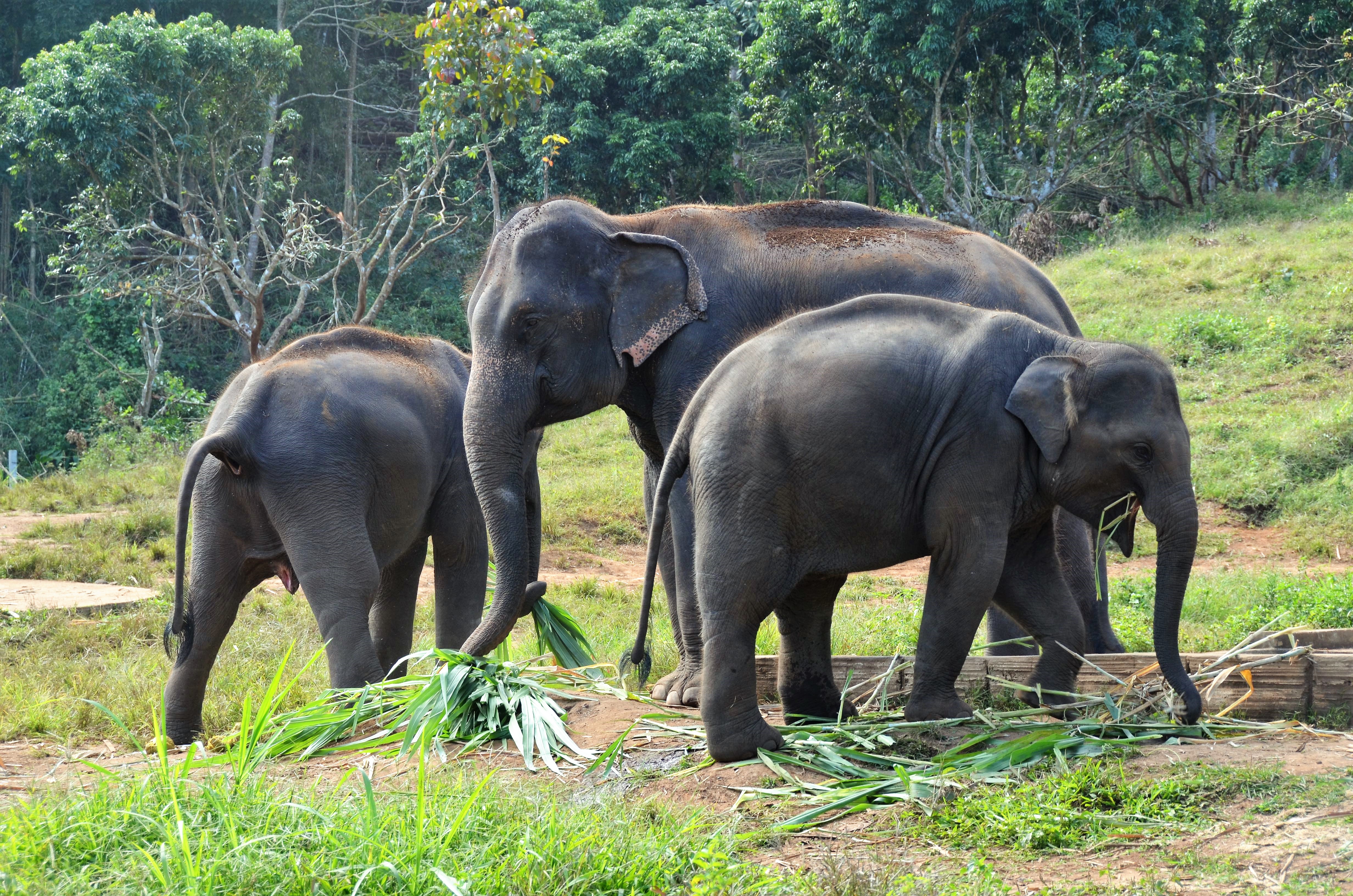
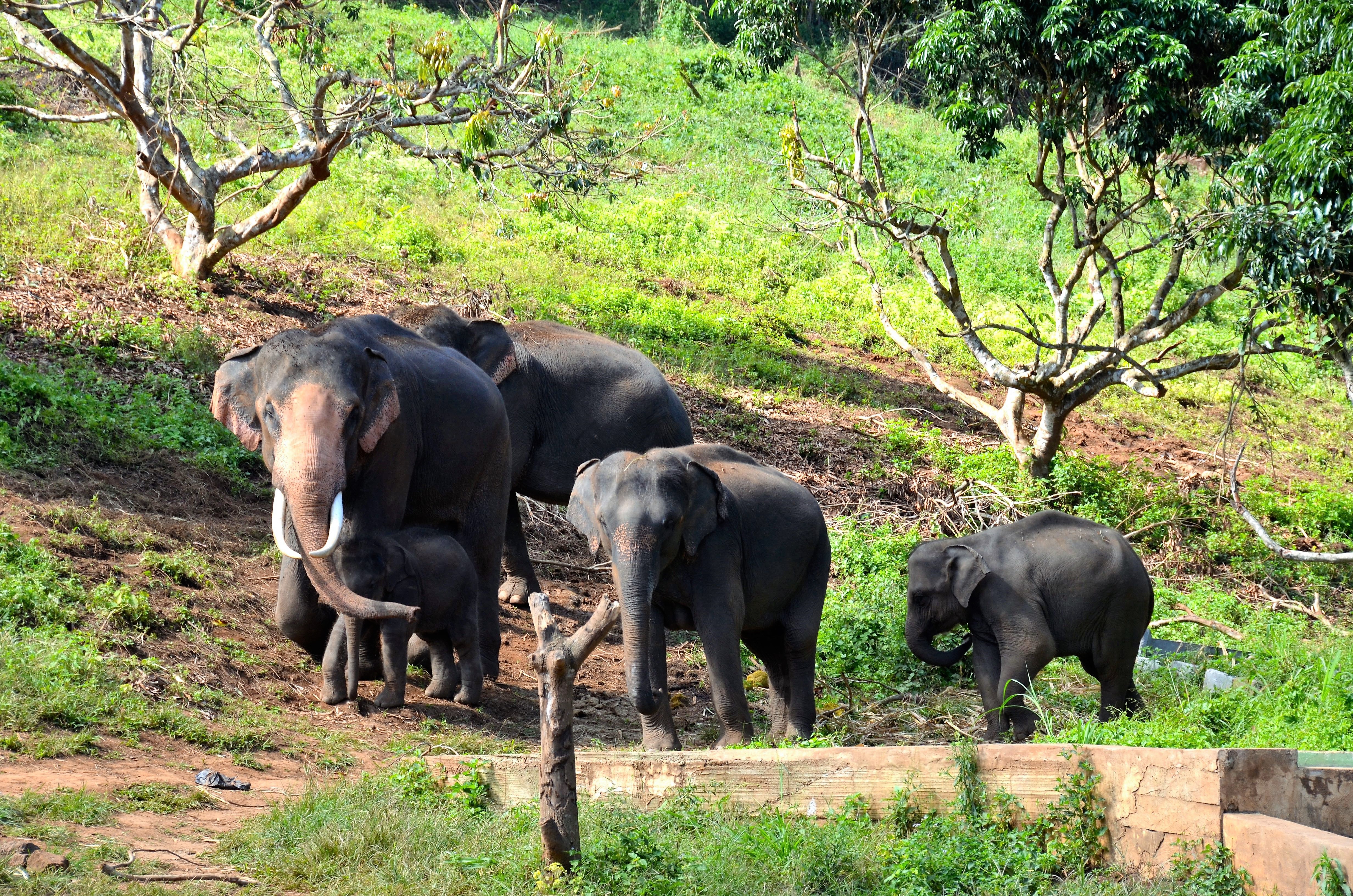
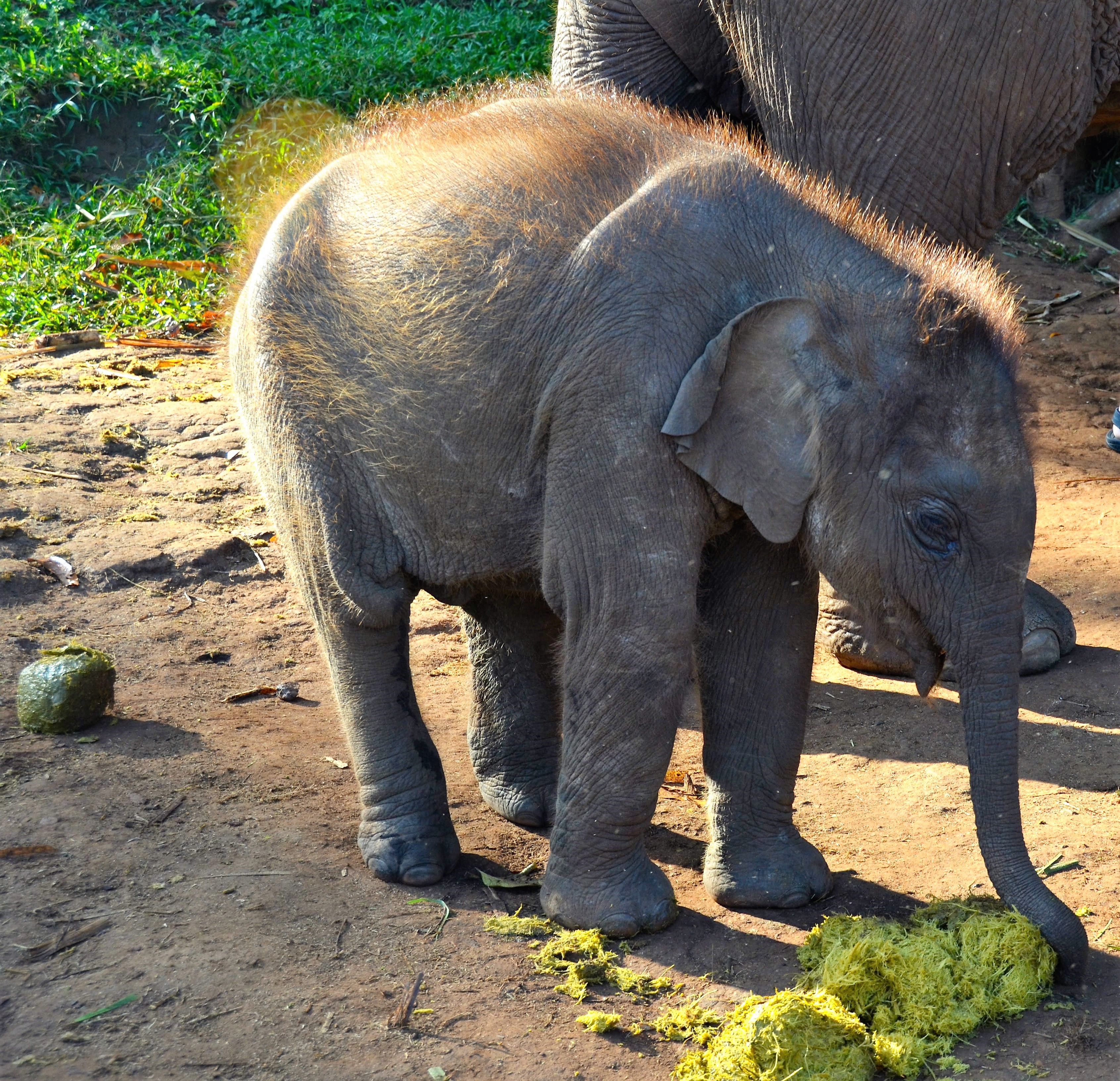
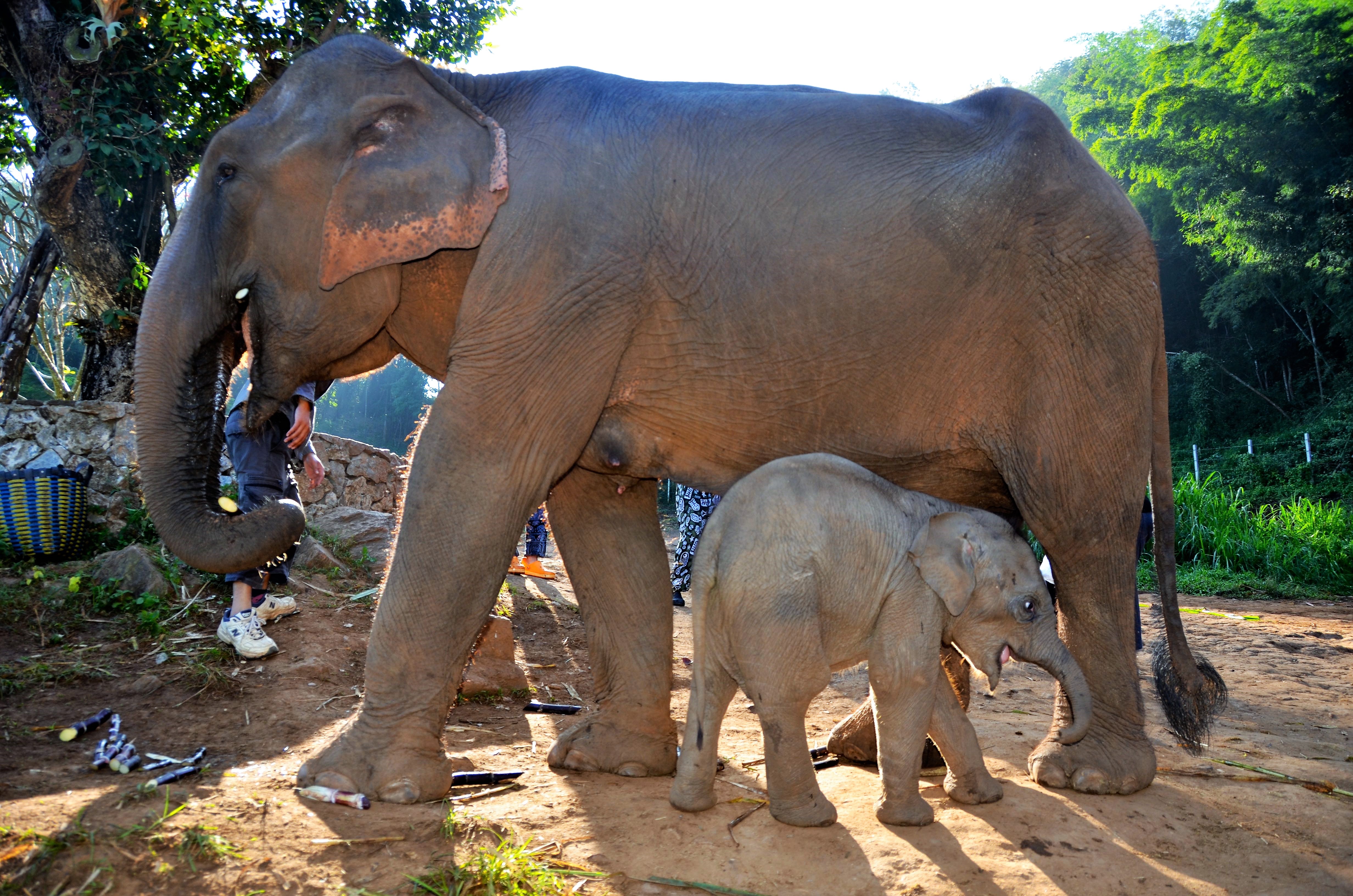
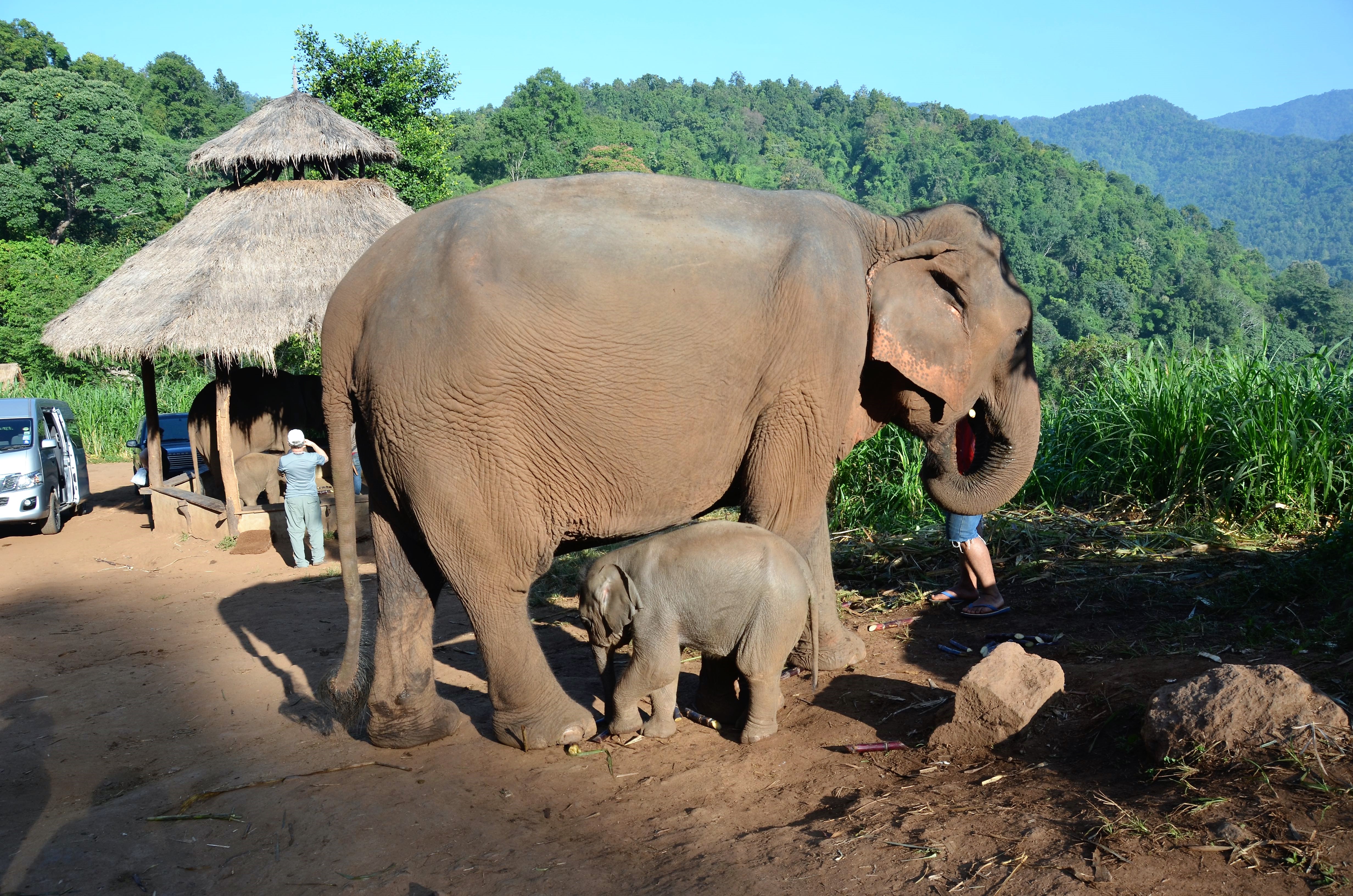
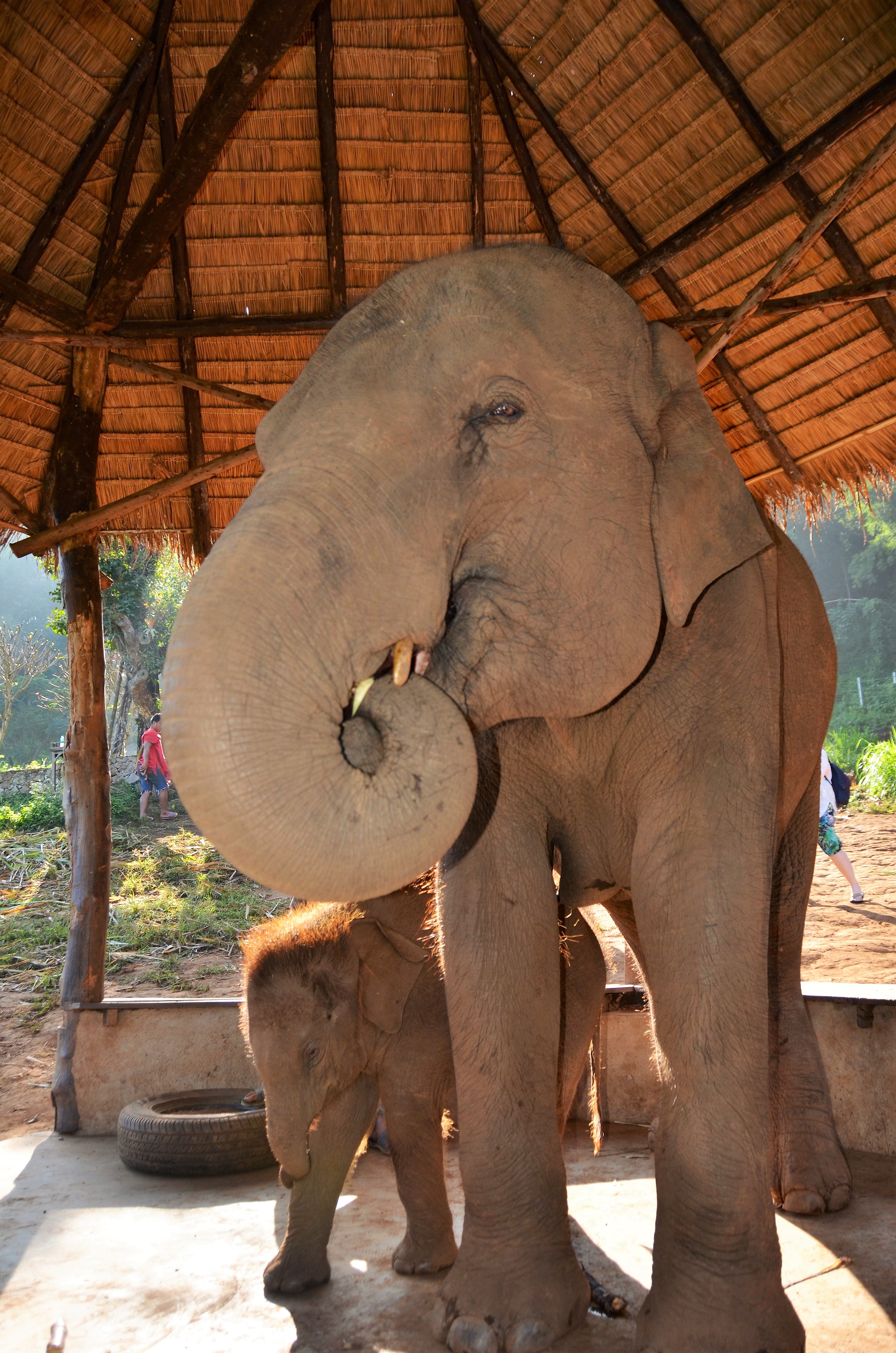
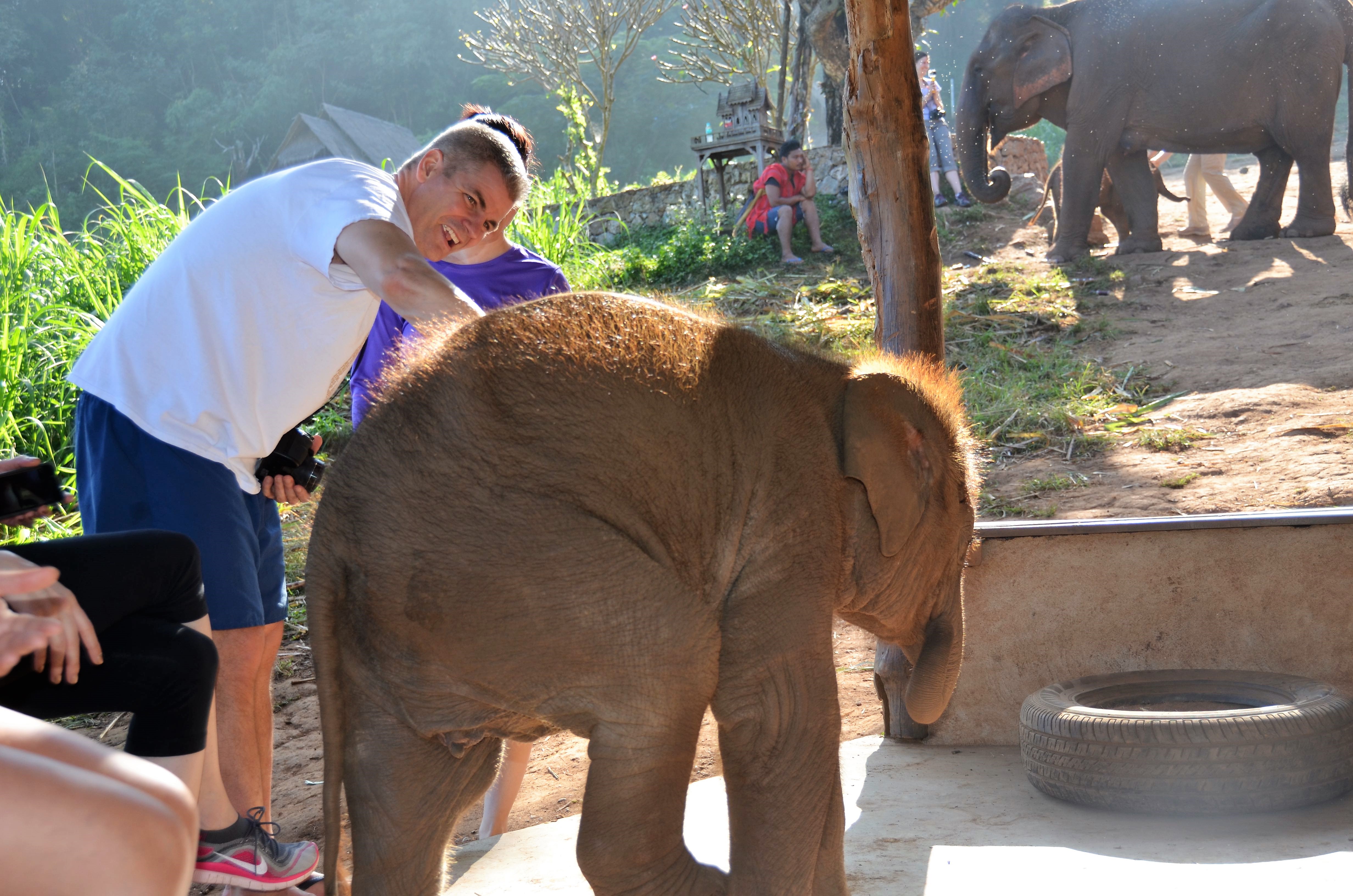

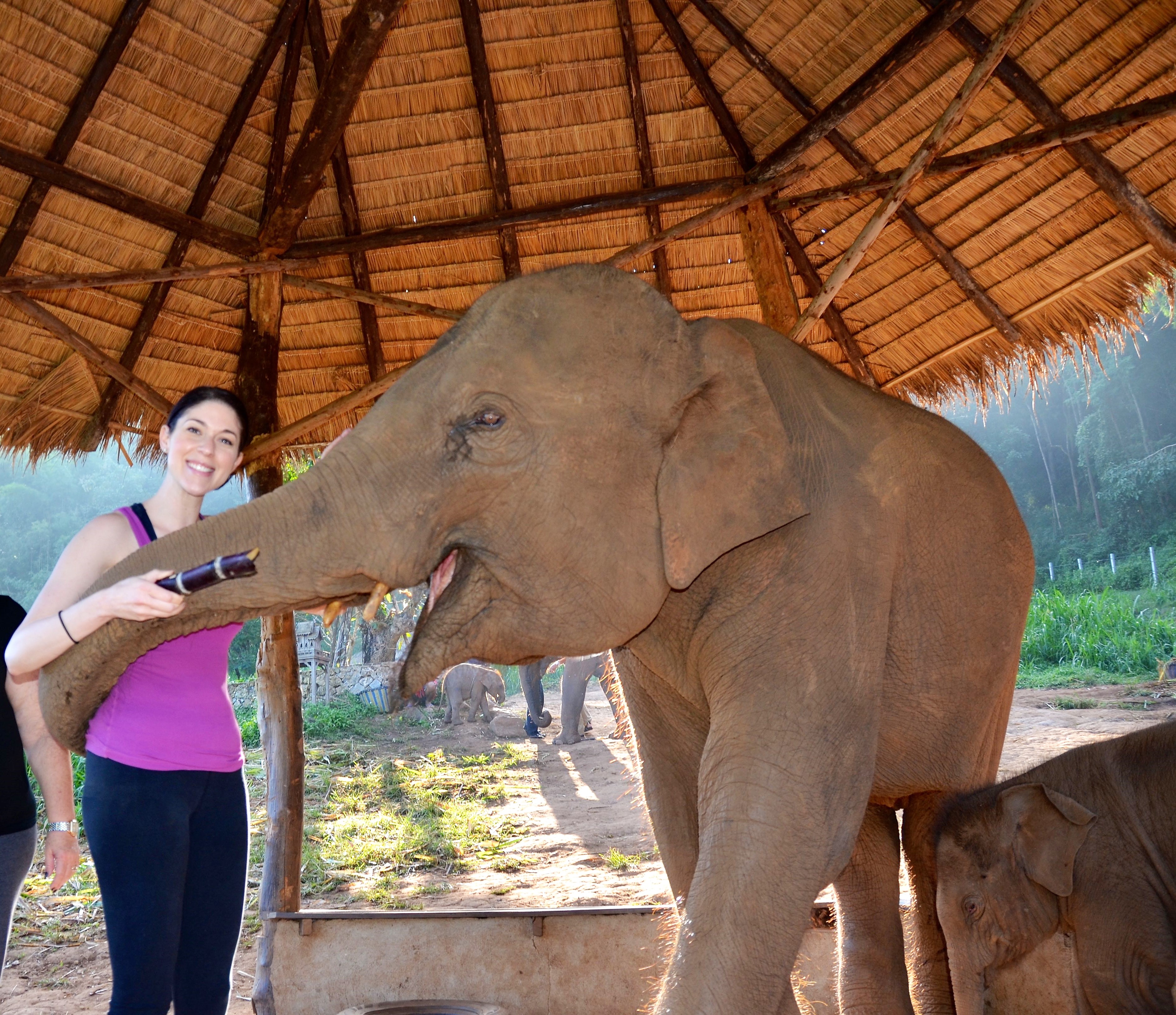
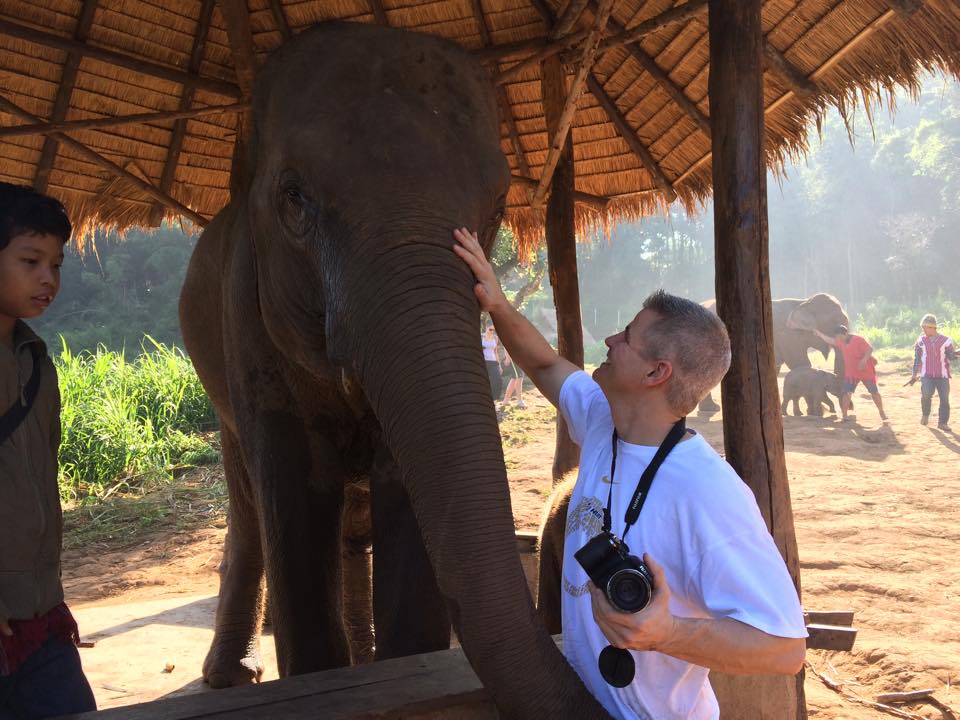
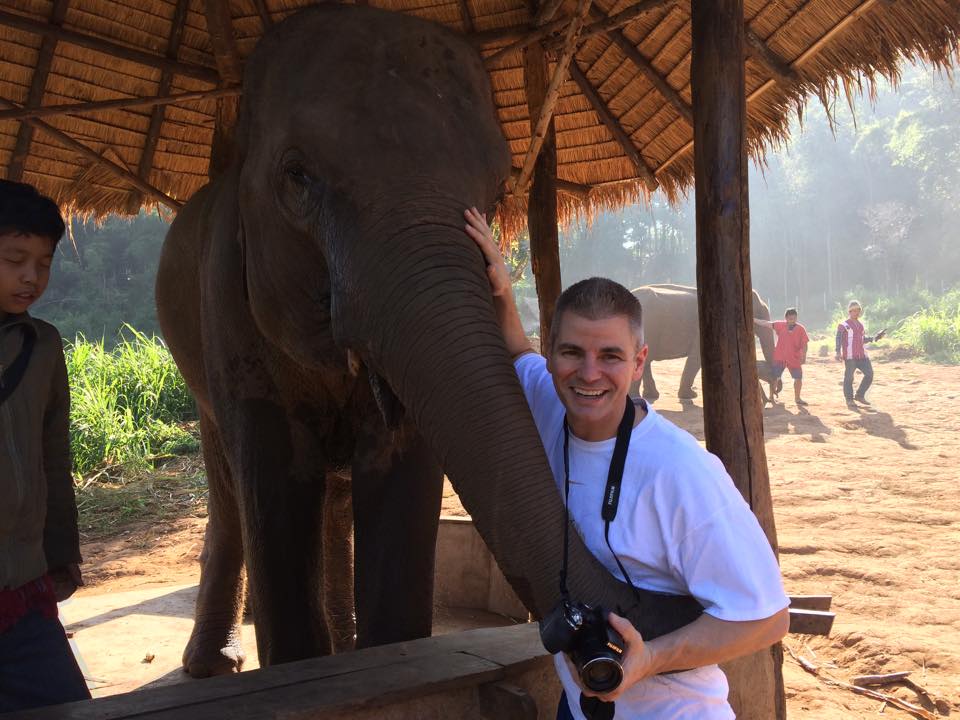
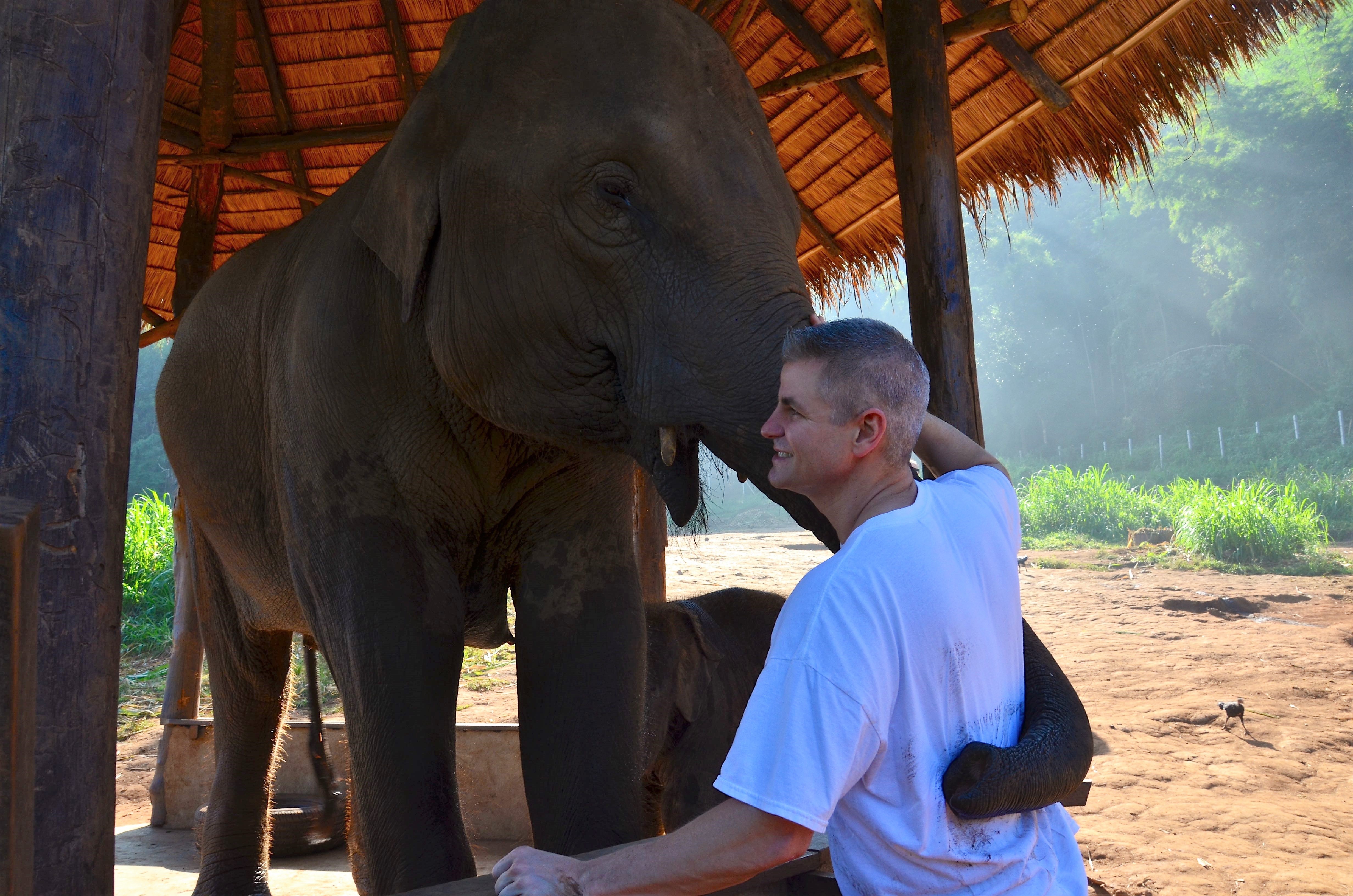
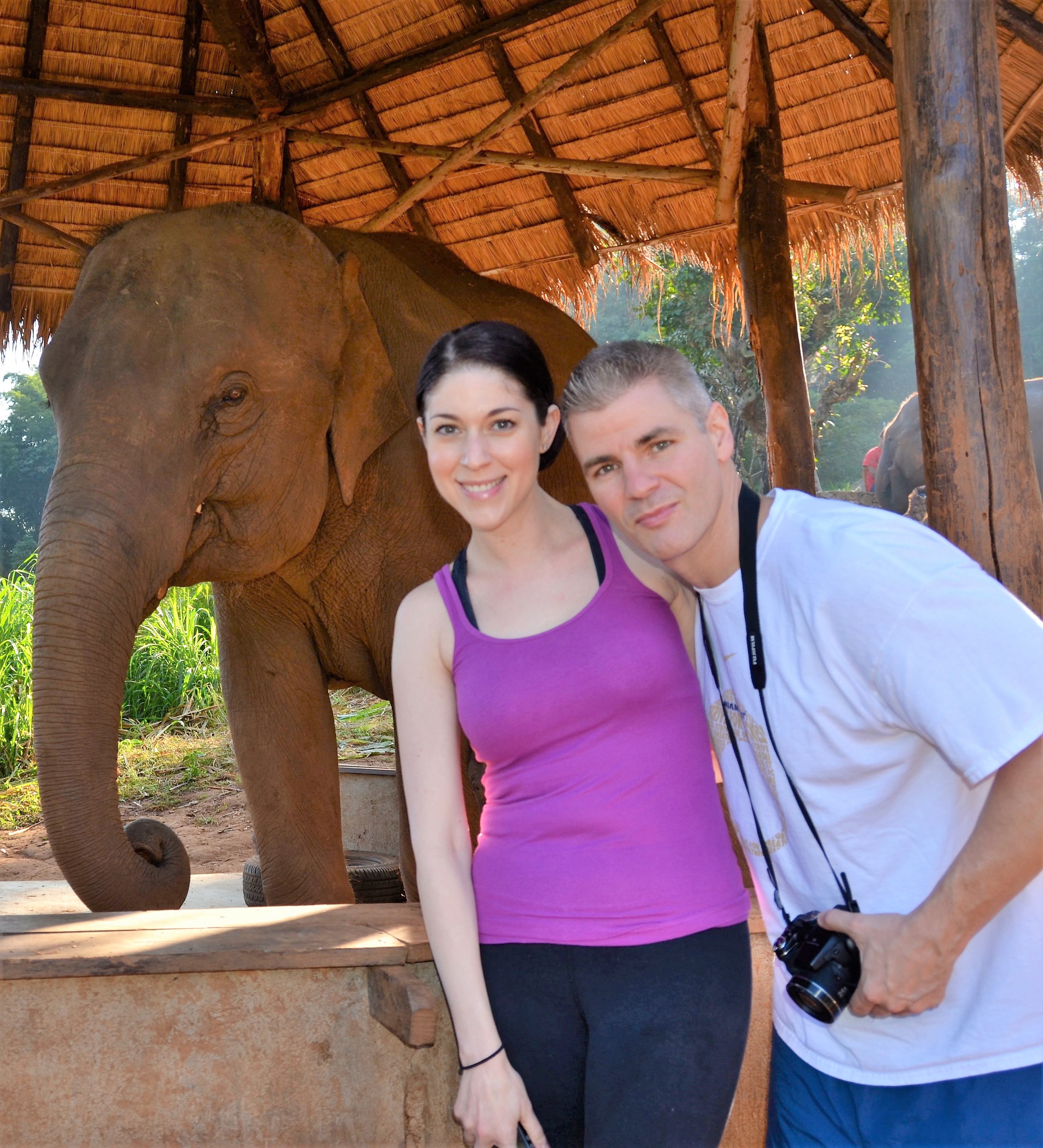
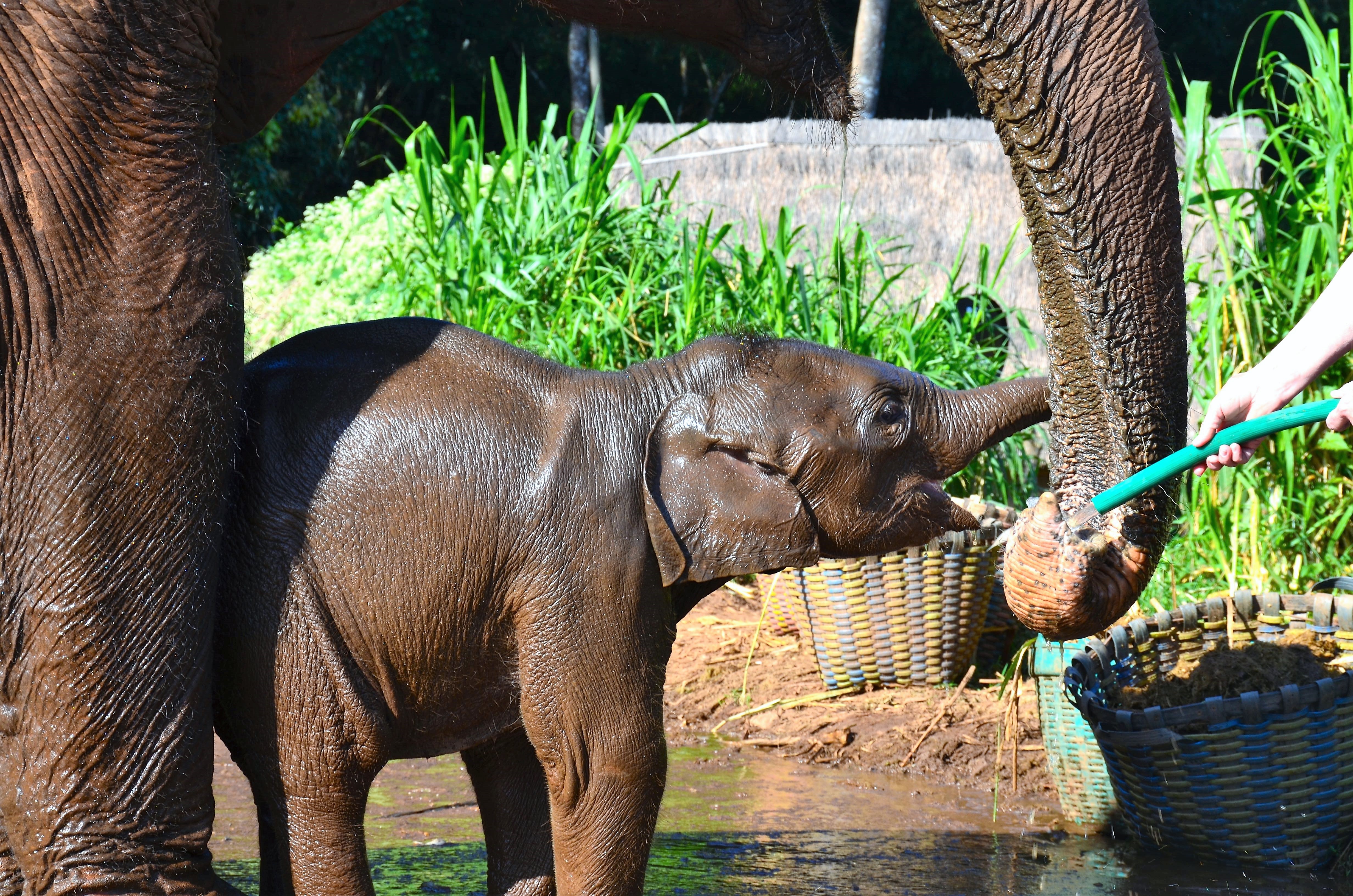 After a couple of hours of that, we were taken to another part of the park where we were assigned a uniform and an elephant whom we would be responsible to care for that day. Our elephant’s name was BunJin. He was the largest elephant, the only adult male, and the baby daddy to all the other elephants. Needless to say, he was a pretty popular guy. But, even popular guys need to eat and be cleaned, and that was out job! We also learned simple hand gestures and commands in Thai that the elephants knew, like telling them “Didi” which means that he or she was a good boy or girl, that helped us interact with our elephant.
After a couple of hours of that, we were taken to another part of the park where we were assigned a uniform and an elephant whom we would be responsible to care for that day. Our elephant’s name was BunJin. He was the largest elephant, the only adult male, and the baby daddy to all the other elephants. Needless to say, he was a pretty popular guy. But, even popular guys need to eat and be cleaned, and that was out job! We also learned simple hand gestures and commands in Thai that the elephants knew, like telling them “Didi” which means that he or she was a good boy or girl, that helped us interact with our elephant.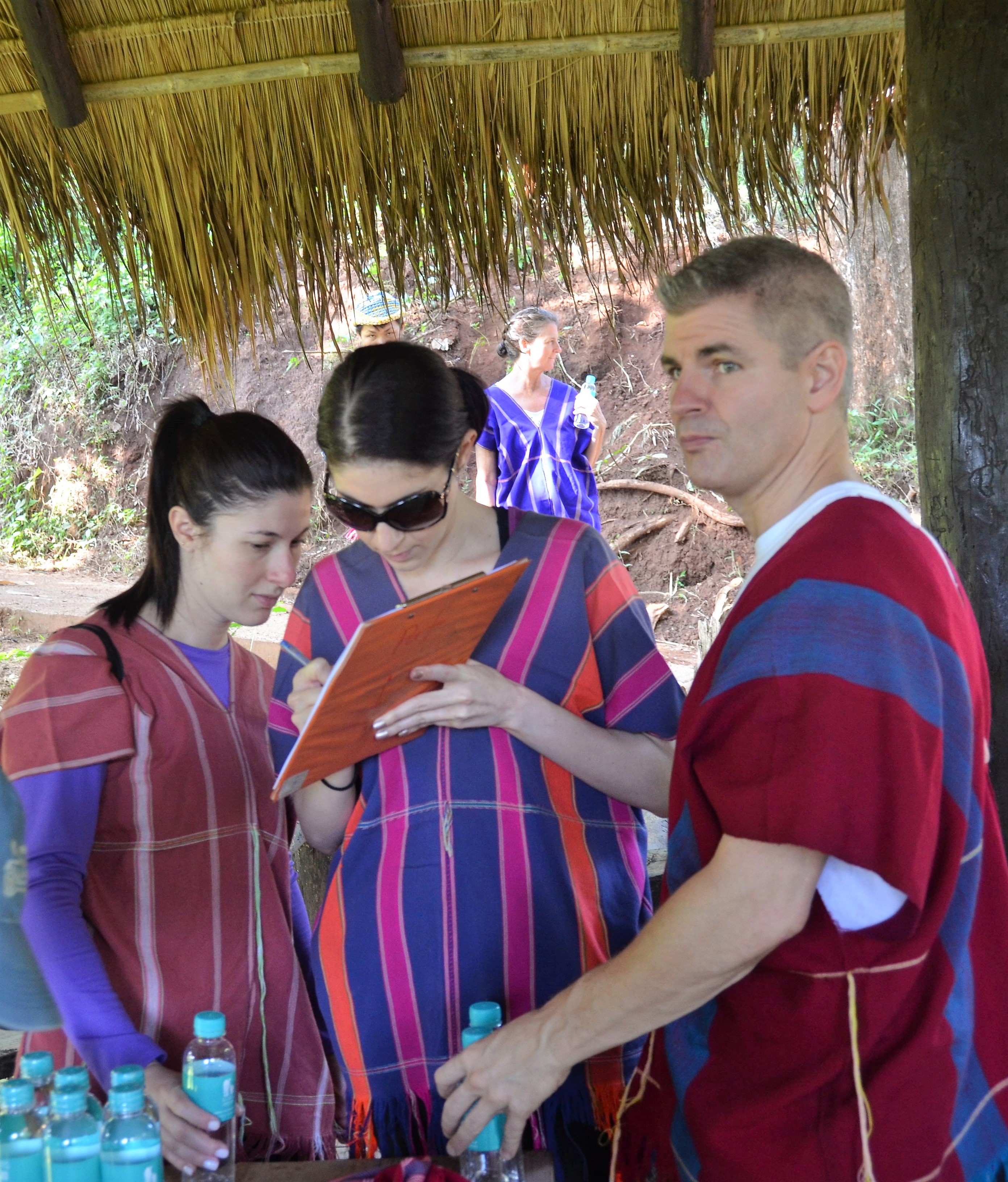
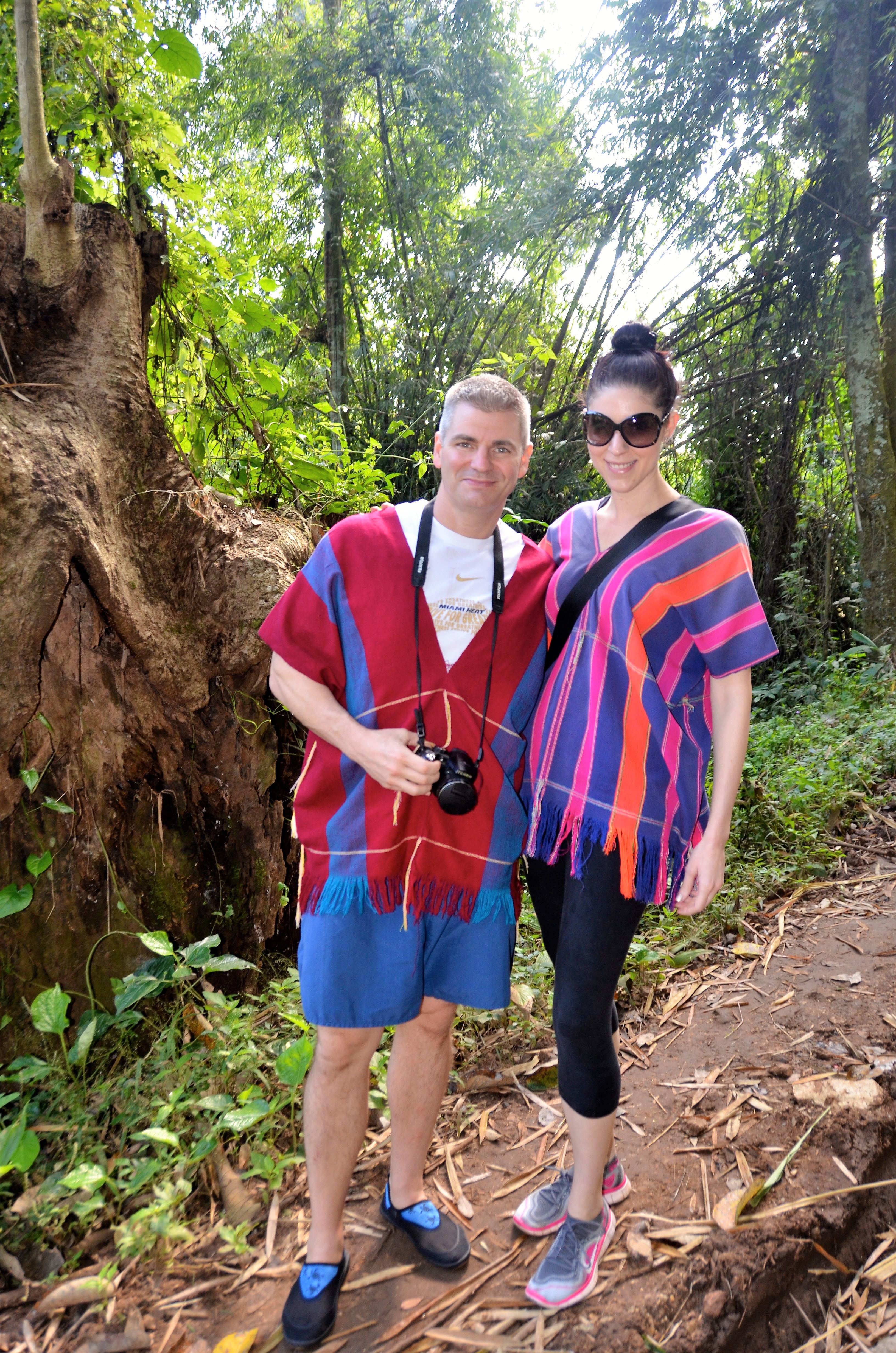
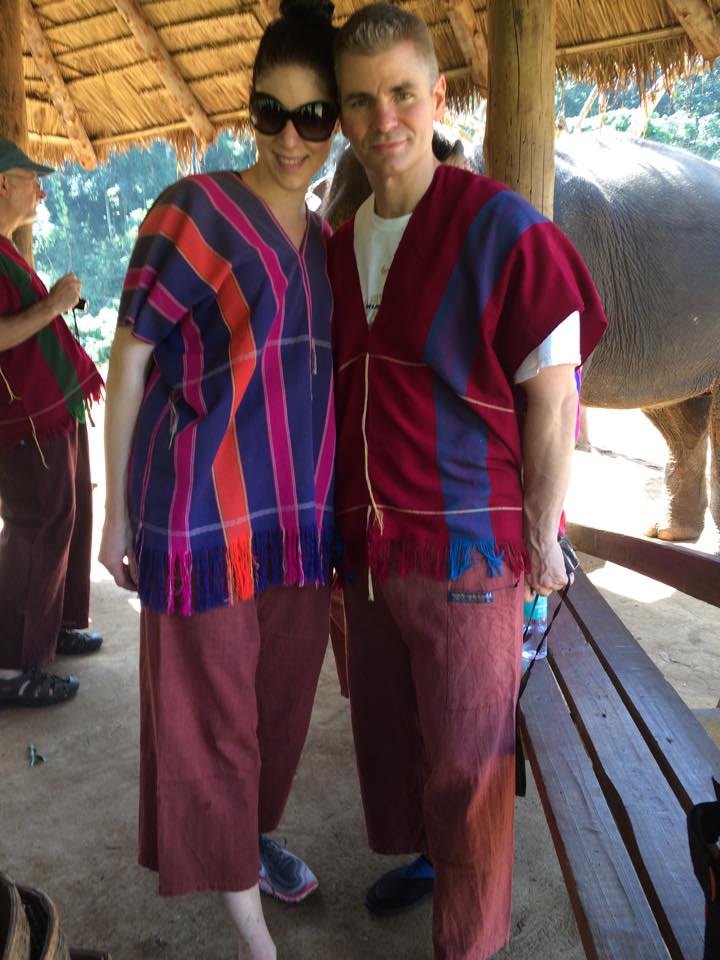
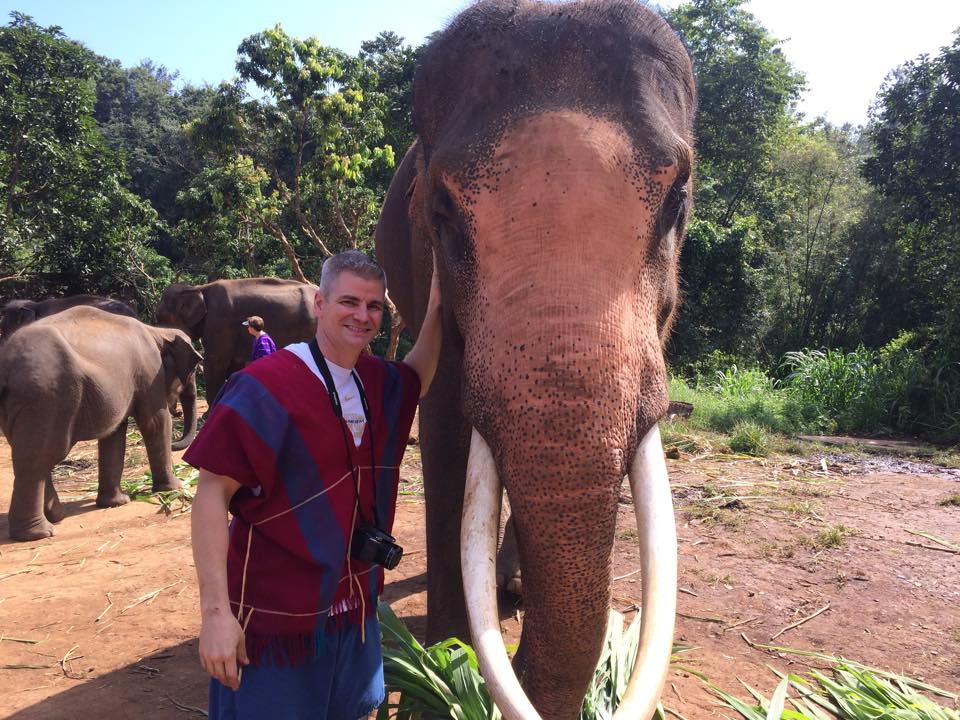
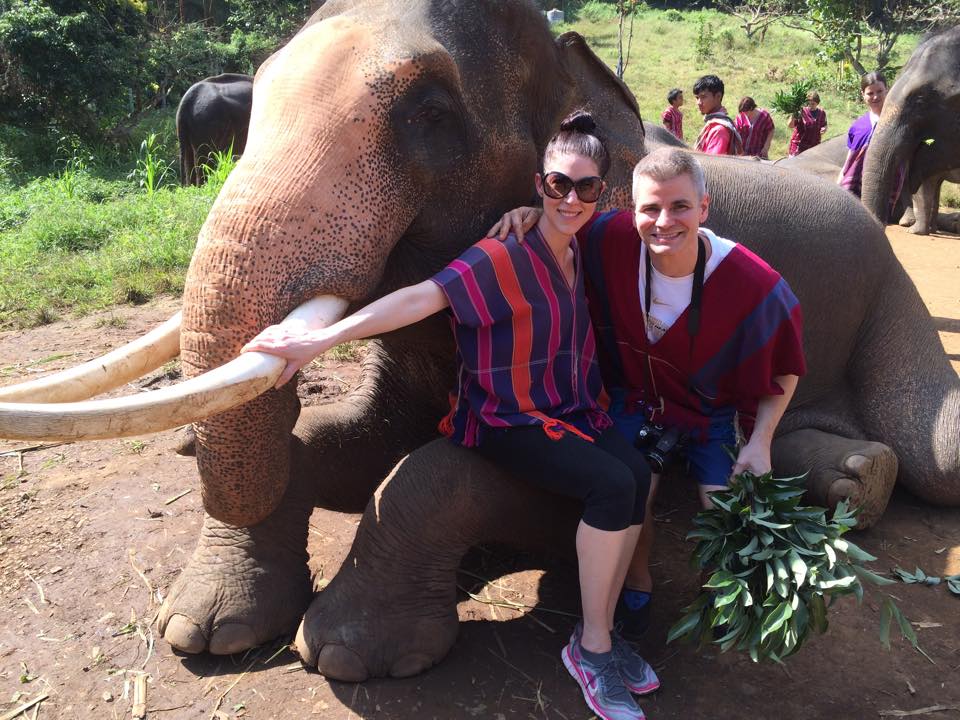
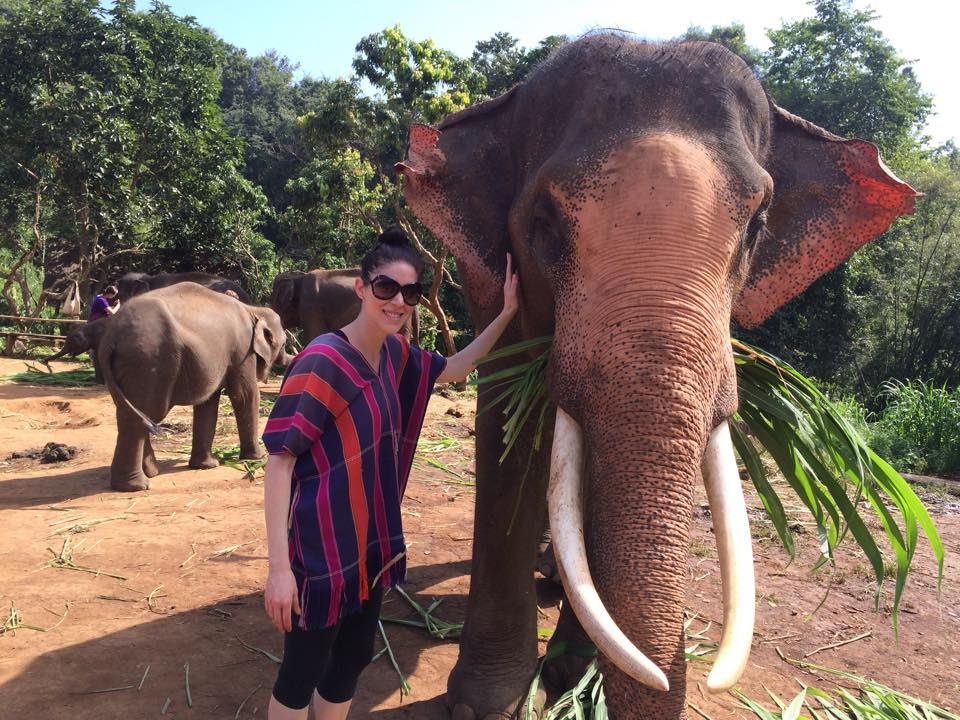
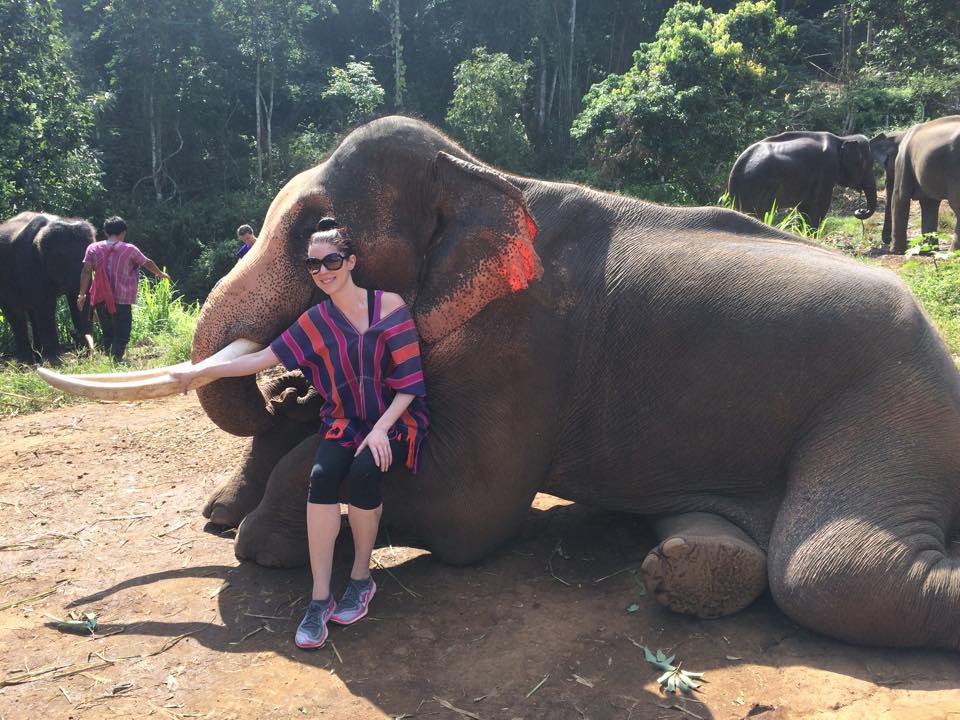 This is my sister, Haroula (Ha-Rue-La), and this is a fun story that would probably embarrass her! Needless to say, her very Greek name isn’t the easiest to pronounce for American people, let alone the Thai! Well, they guy who assigned to help her decided that since he couldn’t say Haroula, he would just call her Colorado! And then, to top it all off, as the day went on, this young Thai boy fell in love with Colorado, so we began calling her Colorado, the Asian temptress. This name turned out to be pretty appropriate as the trip went on!
This is my sister, Haroula (Ha-Rue-La), and this is a fun story that would probably embarrass her! Needless to say, her very Greek name isn’t the easiest to pronounce for American people, let alone the Thai! Well, they guy who assigned to help her decided that since he couldn’t say Haroula, he would just call her Colorado! And then, to top it all off, as the day went on, this young Thai boy fell in love with Colorado, so we began calling her Colorado, the Asian temptress. This name turned out to be pretty appropriate as the trip went on!
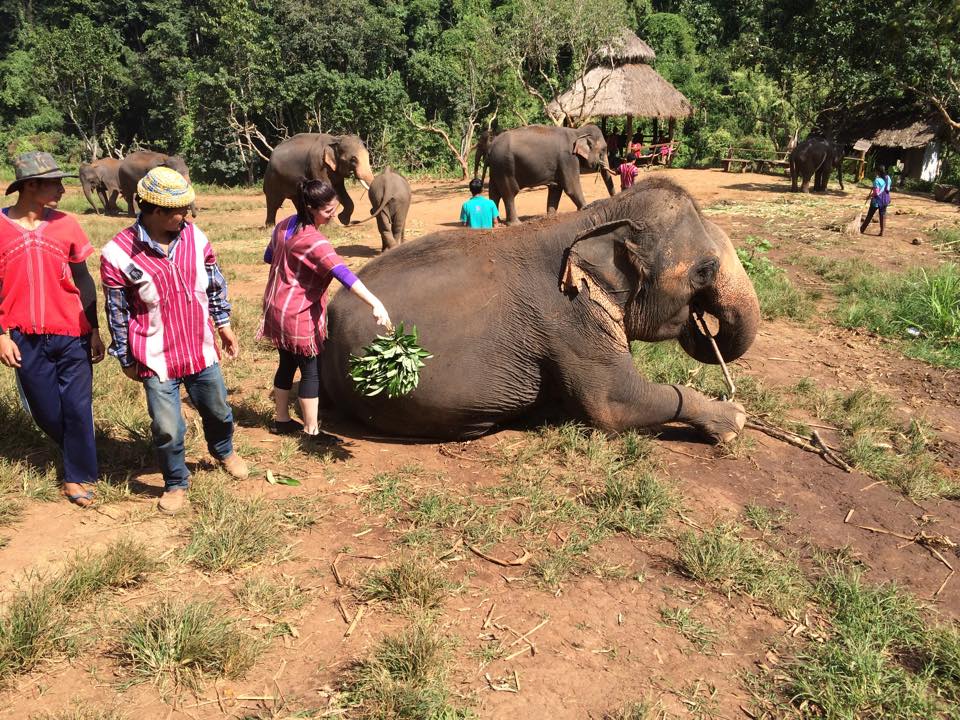
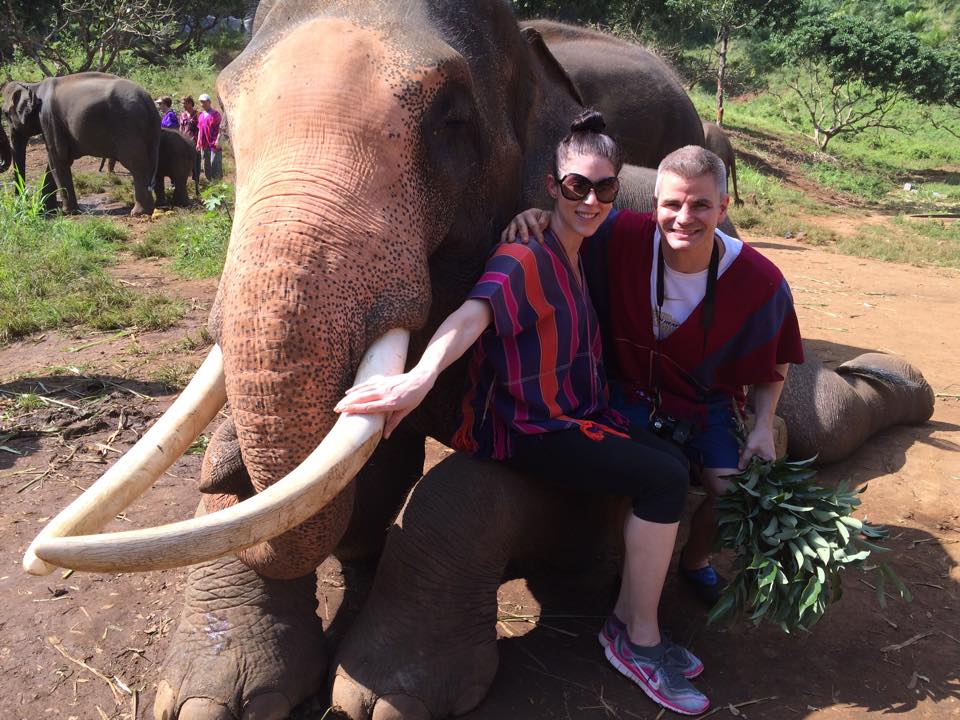 After BunJin was groomed and fed, it was time to ride him for an hour through a hillside jungle where we would find a pool in which to bathe him in. Have you ever mounted and dismounted an animal that is taller than you standing on your head and weighs as much as house? It ain’t cute, I can tell you that. How do you get up? Well, you climb onto his head from the trunk or you hoist yourself onto his back from his leg. Getting off? Now that is the sexy part.
After BunJin was groomed and fed, it was time to ride him for an hour through a hillside jungle where we would find a pool in which to bathe him in. Have you ever mounted and dismounted an animal that is taller than you standing on your head and weighs as much as house? It ain’t cute, I can tell you that. How do you get up? Well, you climb onto his head from the trunk or you hoist yourself onto his back from his leg. Getting off? Now that is the sexy part.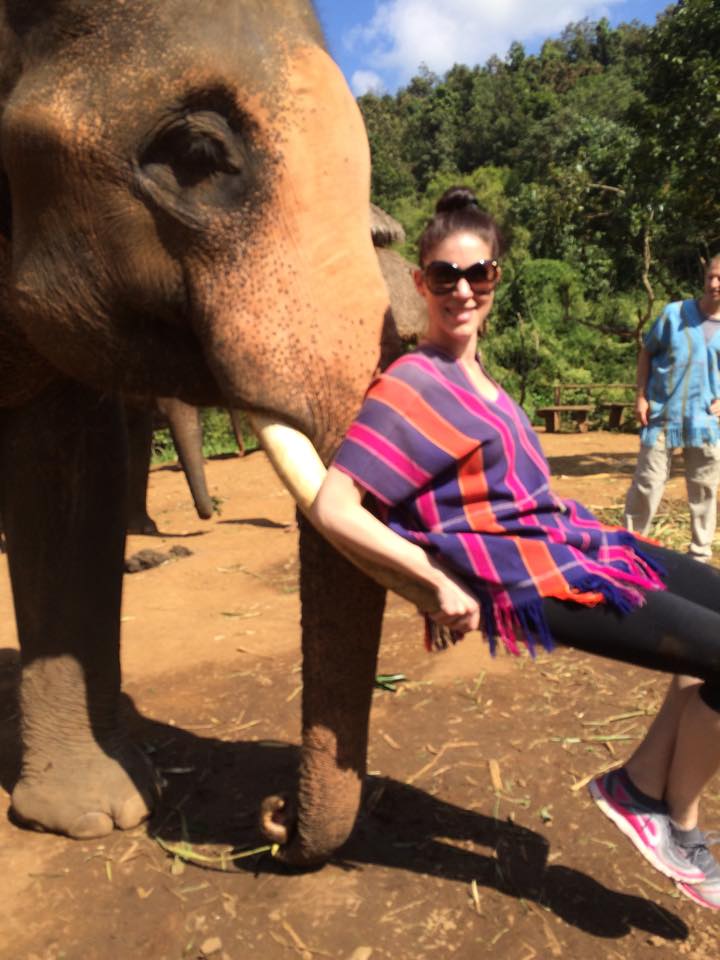 Don’t we just look like an advertisement for visiting Thailand? If you could only hear the expletives that we were whispering to each other as we were trying to stay balanced on this gigantic creature who liked to look down, chase lady elephants on the trail, and always (without fail) tried to shove himself between two trees because the scratch felt good! Remember, we are riding bare back, so there is nothing keeping us on this elephant but pure balance! Also, he’s got coarse little hairs poking us in the butt, and, as Chad will later learn, a colony of fire ants on his back!
Don’t we just look like an advertisement for visiting Thailand? If you could only hear the expletives that we were whispering to each other as we were trying to stay balanced on this gigantic creature who liked to look down, chase lady elephants on the trail, and always (without fail) tried to shove himself between two trees because the scratch felt good! Remember, we are riding bare back, so there is nothing keeping us on this elephant but pure balance! Also, he’s got coarse little hairs poking us in the butt, and, as Chad will later learn, a colony of fire ants on his back! 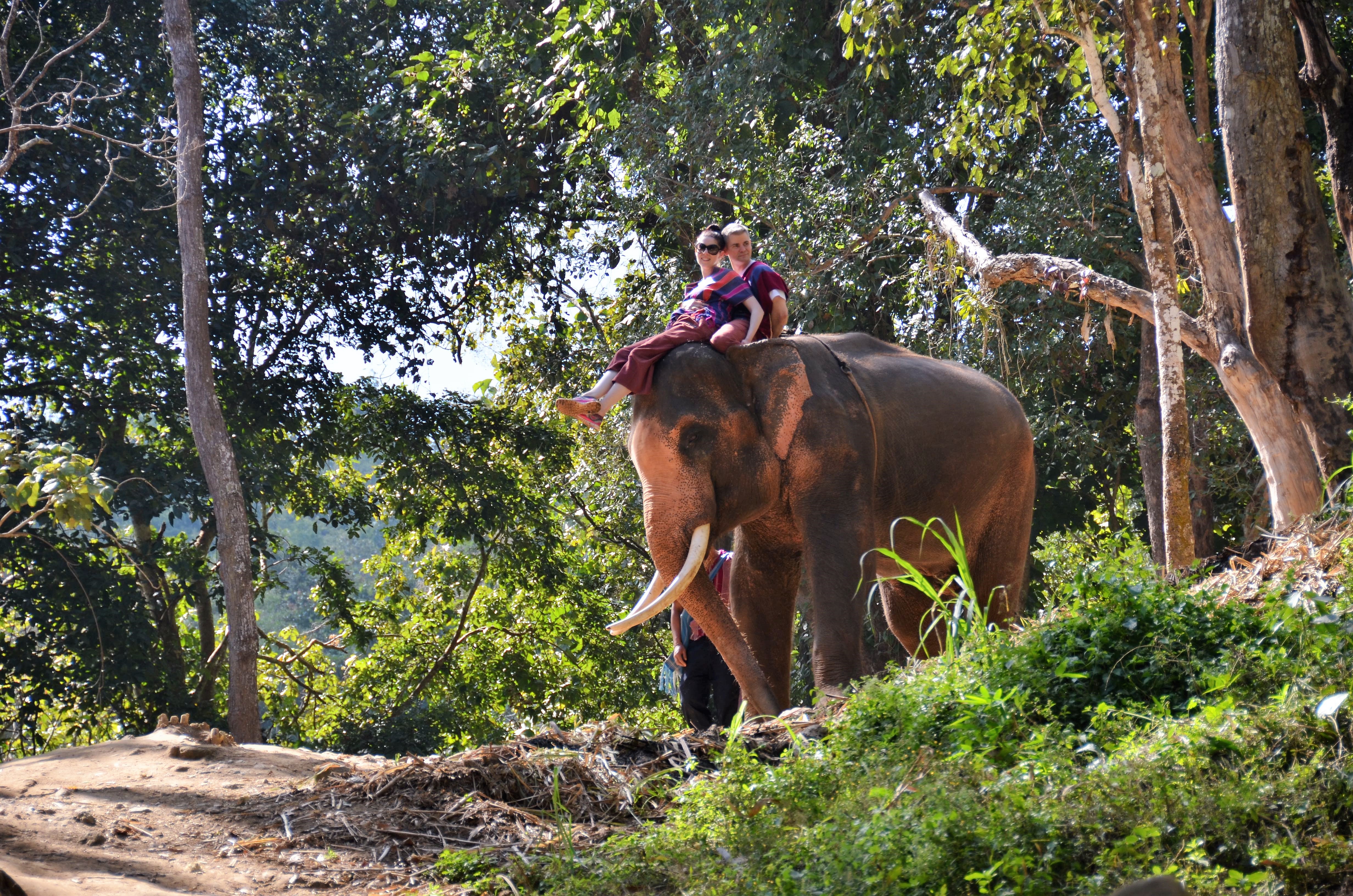
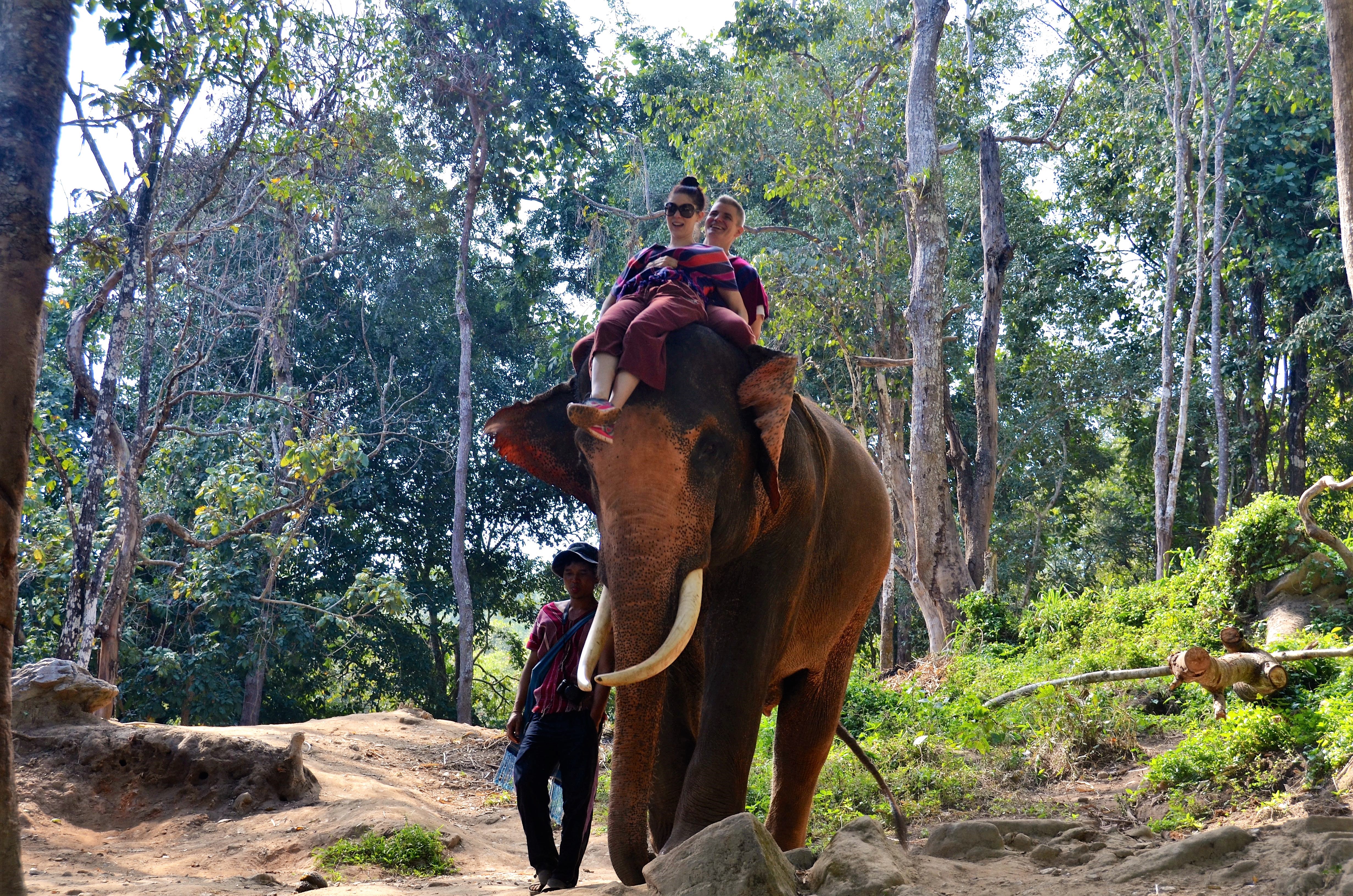
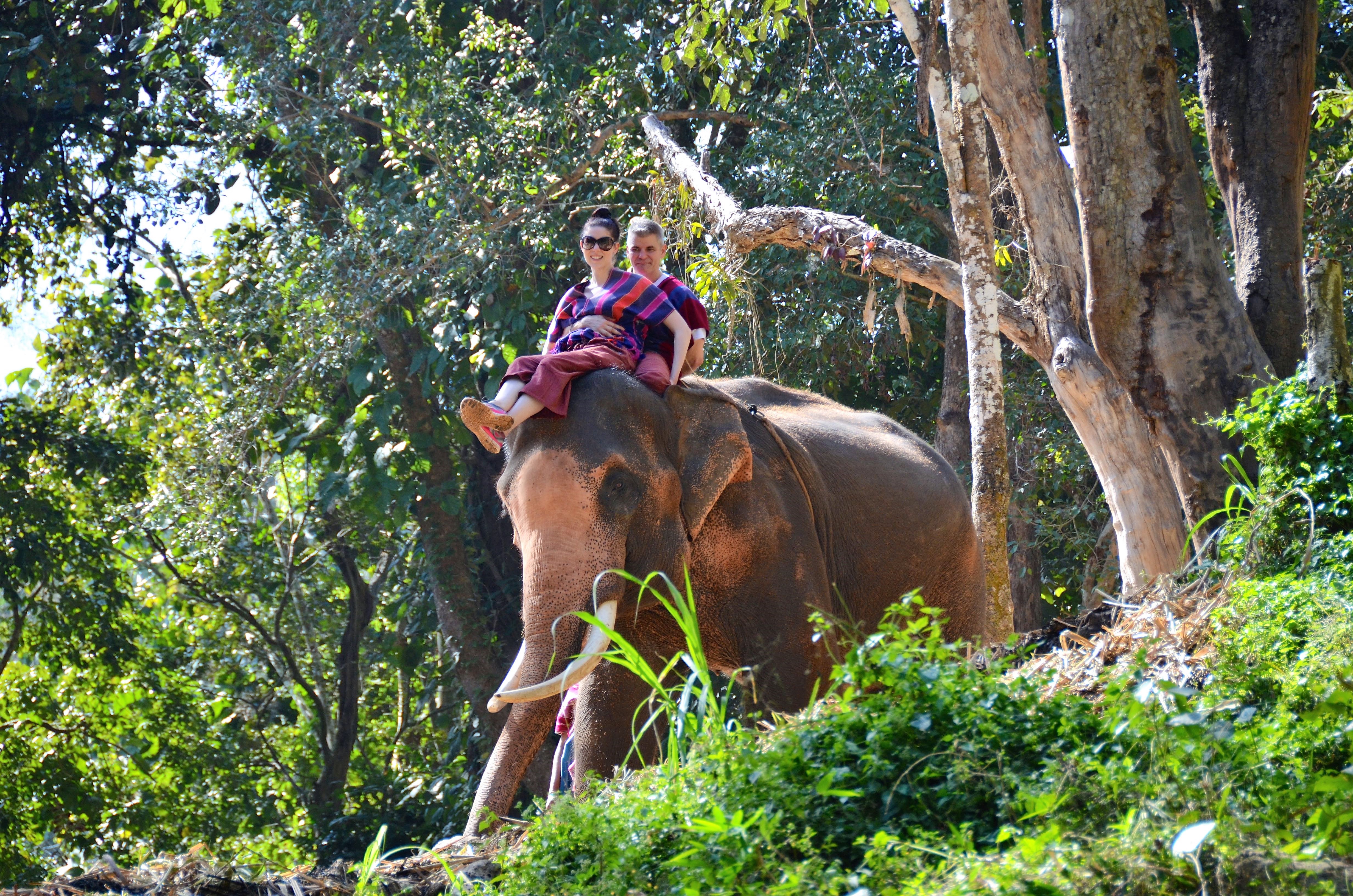
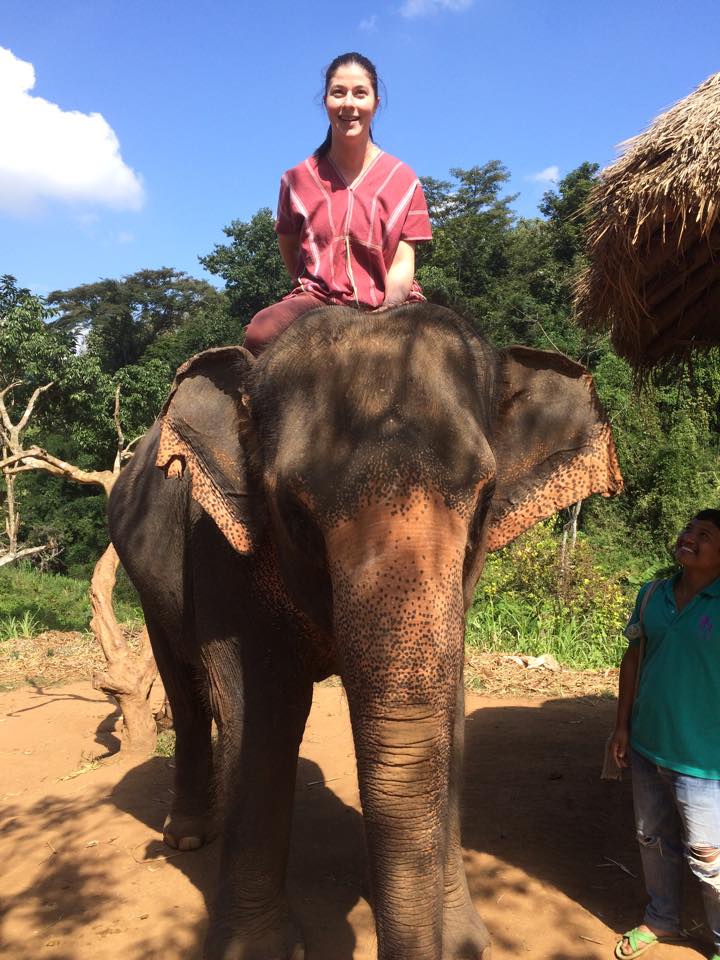
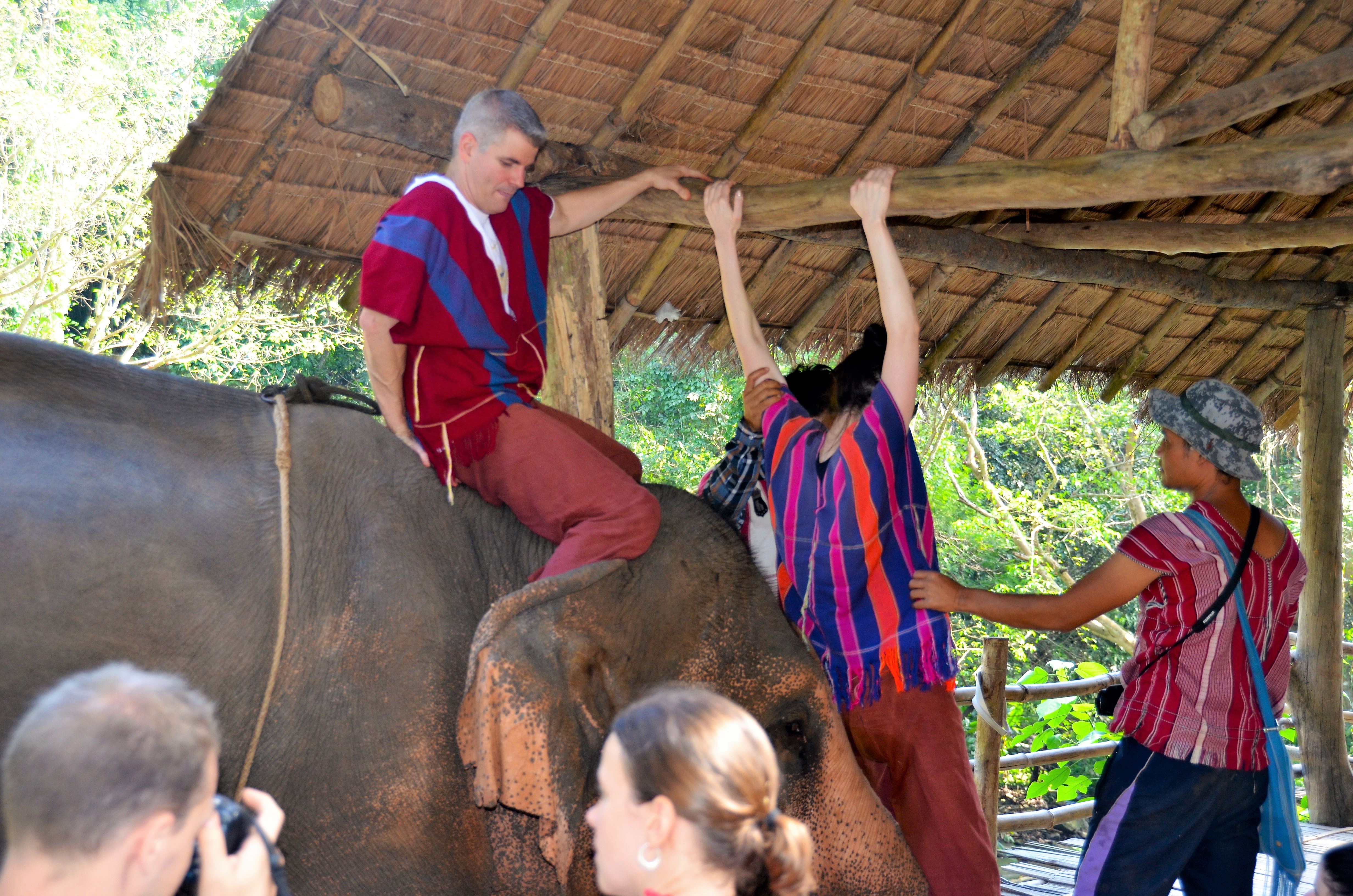 Alas, we made it to the pool alive! BunJin just walked us right in, rolled over and then demanded to be bathed.
Alas, we made it to the pool alive! BunJin just walked us right in, rolled over and then demanded to be bathed. 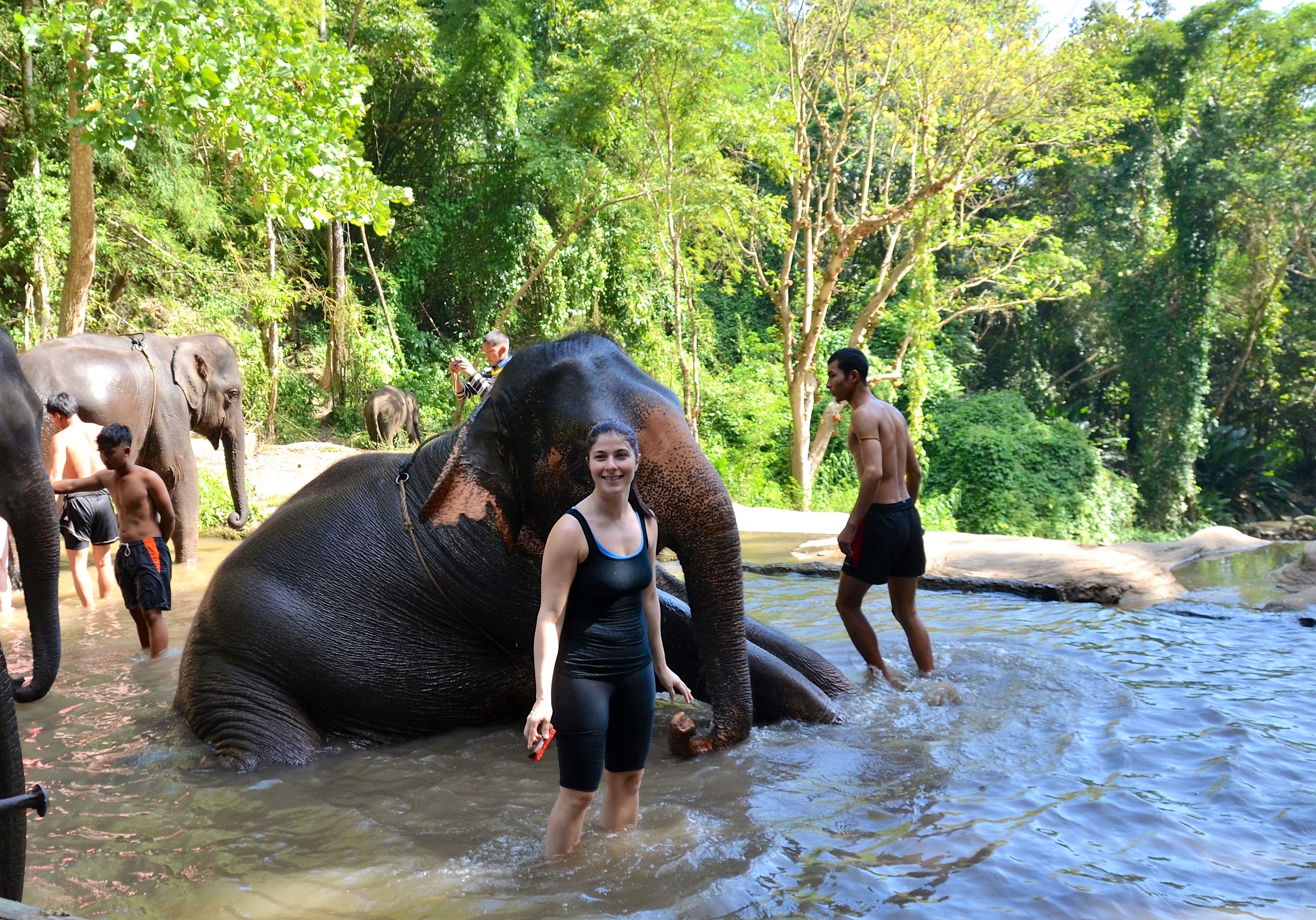
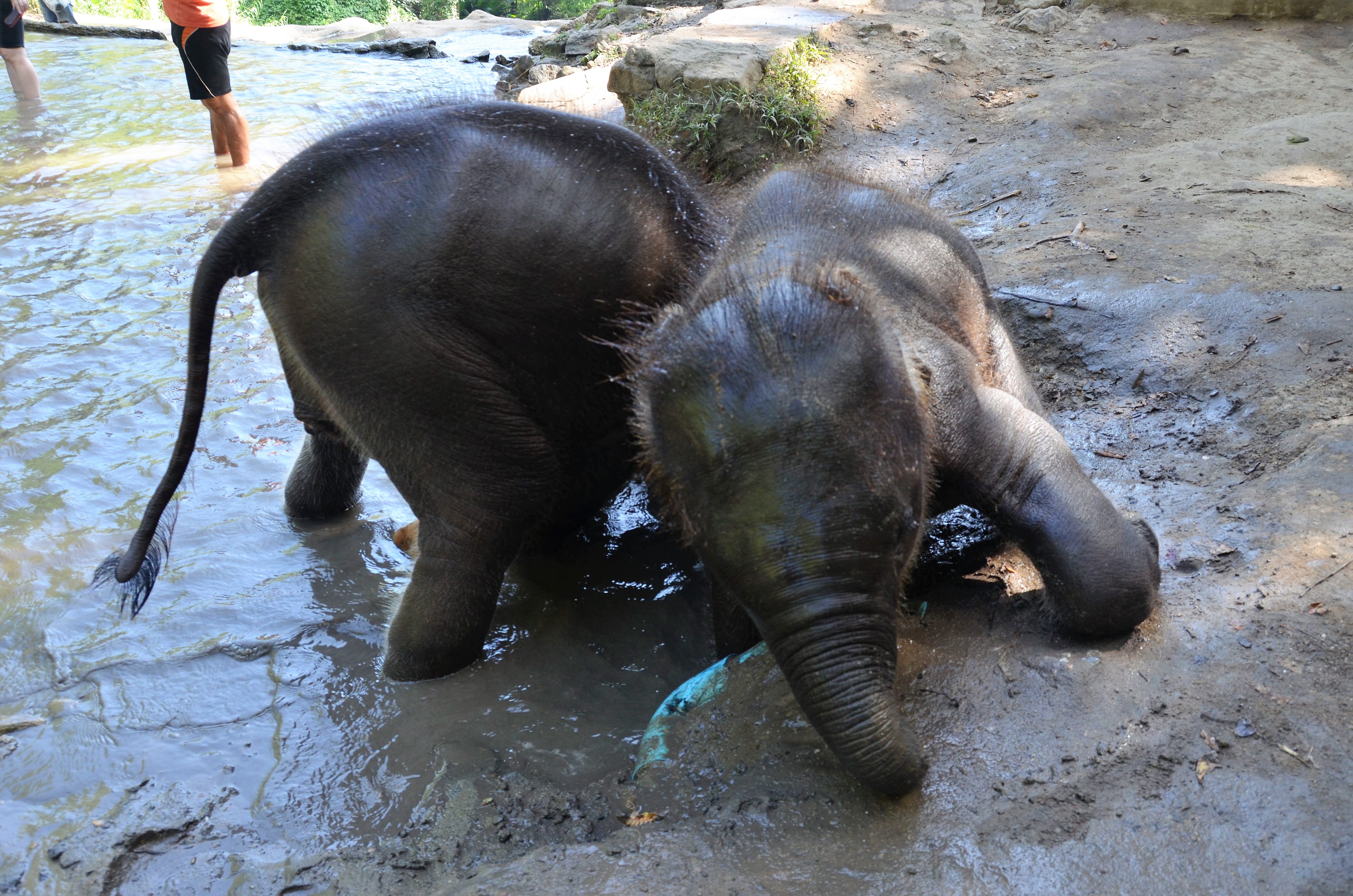 After splashing around with the elephants for a while, we were treated to a delicious picnic.
After splashing around with the elephants for a while, we were treated to a delicious picnic.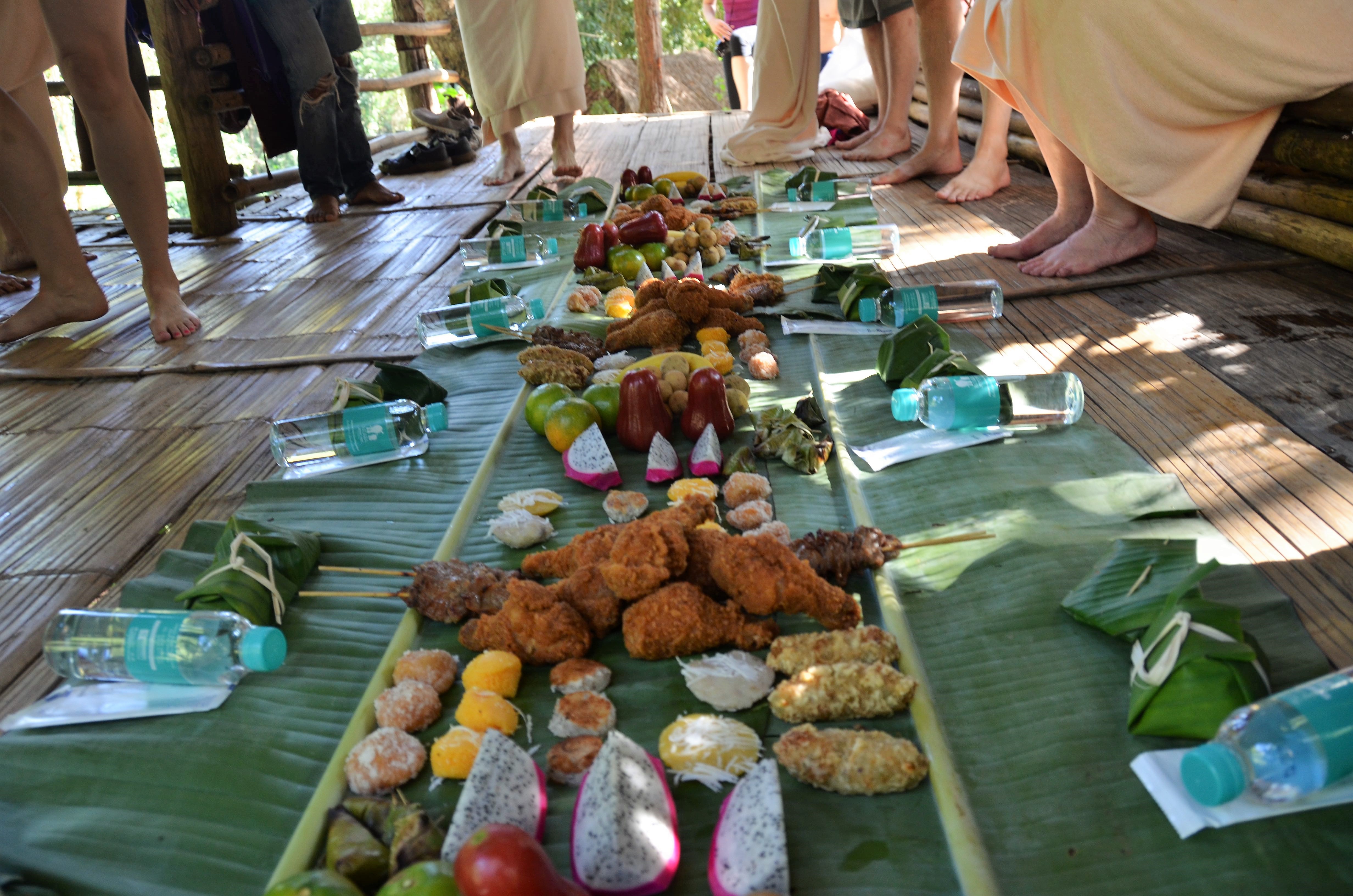 This truly was an incredible experience. Nonetheless, I continued to wonder whether riding an elephant at all was ethical. I have read several articles about this since then, and while it is probably best to not ride an elephant at all, the safest way to ride an elephant is bareback and on the neck, like we did at Patara. Also, I can honestly say that I did not see any of the elephants being mistreated, and all the locals truly seemed to care for and have bond with these animals.
This truly was an incredible experience. Nonetheless, I continued to wonder whether riding an elephant at all was ethical. I have read several articles about this since then, and while it is probably best to not ride an elephant at all, the safest way to ride an elephant is bareback and on the neck, like we did at Patara. Also, I can honestly say that I did not see any of the elephants being mistreated, and all the locals truly seemed to care for and have bond with these animals.
The best option in Chiang Mai is probably Elephant Nature Park. They have several elephant interaction day programs to choose from and even overnight and week-long volunteer programs, but none of them allow riding. Another beautiful aspect of this operation is that they have an on-property dog rescue.
Along the way during our travels in Thailand, we met other travelers who had also visited Tiger Temple and Tiger Kingdom in Chiang Mai, places that Chad and I made the conscious decision to avoid. I urge you to do the same. These tiger attractions have captive tigers and allow visitors to pet not only baby tigers but also full grown adult tigers. Based on my research, they are known for drugging the tigers to keep them sedated enough to not attack tourists and also beating the tigers when they are too sedated to interact with the tourists. It literally made me sick to hear that people were supporting these attractions and perpetuating the exploitation of tigers. So, I implore to you avoid these inhumane places if you go to Thailand.
Another popular but controversial tourist draw in Chiang Mai is visiting the Karen Long Neck Villages. The artificial hill tribes popped up around the northern Thai border in the mid-1980s as a result of a civil war. The tribe has a custom whereby female tribe members have elongated their necks as a result of years of wearing heavy brass rings around their necks (from as early as the age of 4 or 5), thereby inspiring tourism to these villages. Many international tour companies discourage these visits because it is like visiting a human zoo, which was why Chad and I avoided the visit. This article does a nice job of explaining why the visit is considered exploitative of the tribe’s people, particularly the women and children. However, that does not stop thousands of tourists from visiting these mostly fabricated villages to buy “local” goods, watch children perform for tourists, and snap pictures of themselves with women and children who have the golden rings around their necks. To be fair, there are other articles that discuss respectful/socially responsible ways to visit these hill tribes.
It is exploitative experiences and attractions like these, found all over the world, that I emphatically encourage you to avoid. There are so many other alternatives and more meaningful and authentic experiences to have in the world that do not contribute to the suffering of an animal, a child, or a woman. You just need to spend a little time fully researching the activities, attractions, and experiences that your travel agent, your friend, or the internet recommends.
Okay, I am climbing off my soap box now. After a wonderful day spent at Patara, we decided to spend the evening at Chiang Mai’s famous night market. You can find everything from food, music, massage, and handicrafts at the markets. If you are adventurous, you can find almost any insect or bug to eat. No thanks, but you can.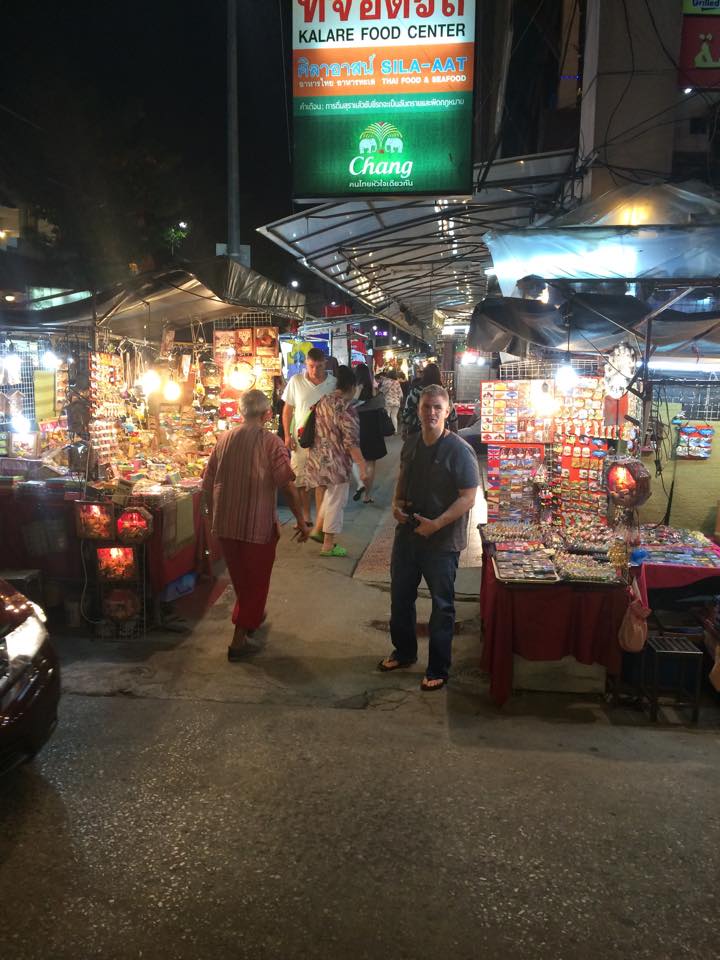
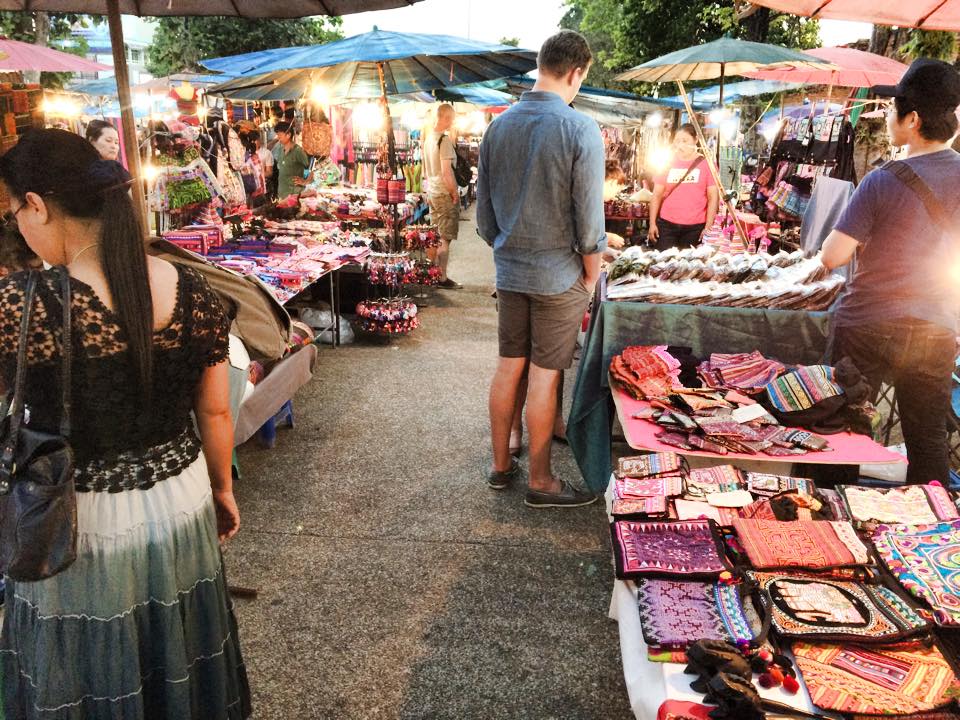
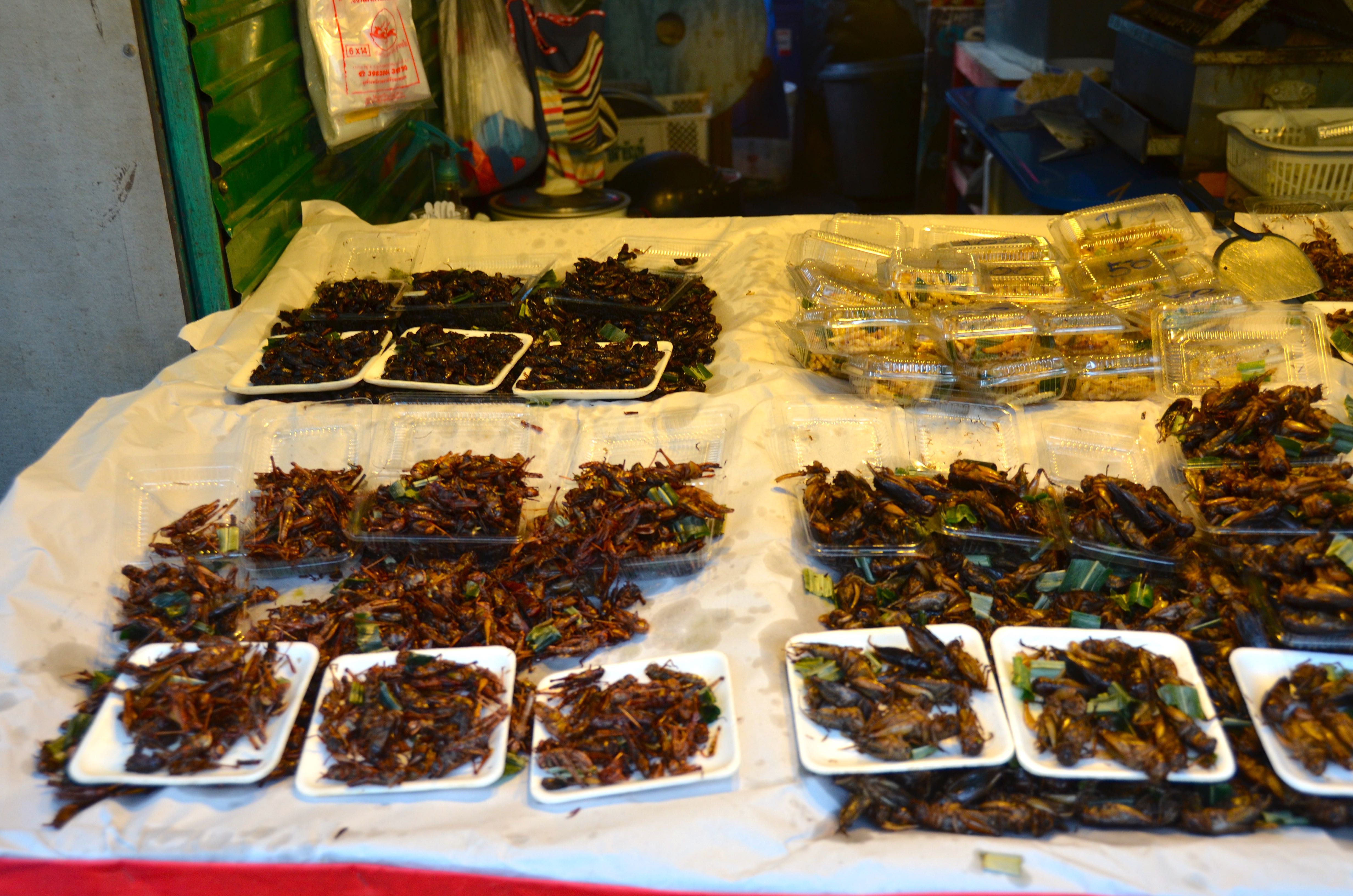
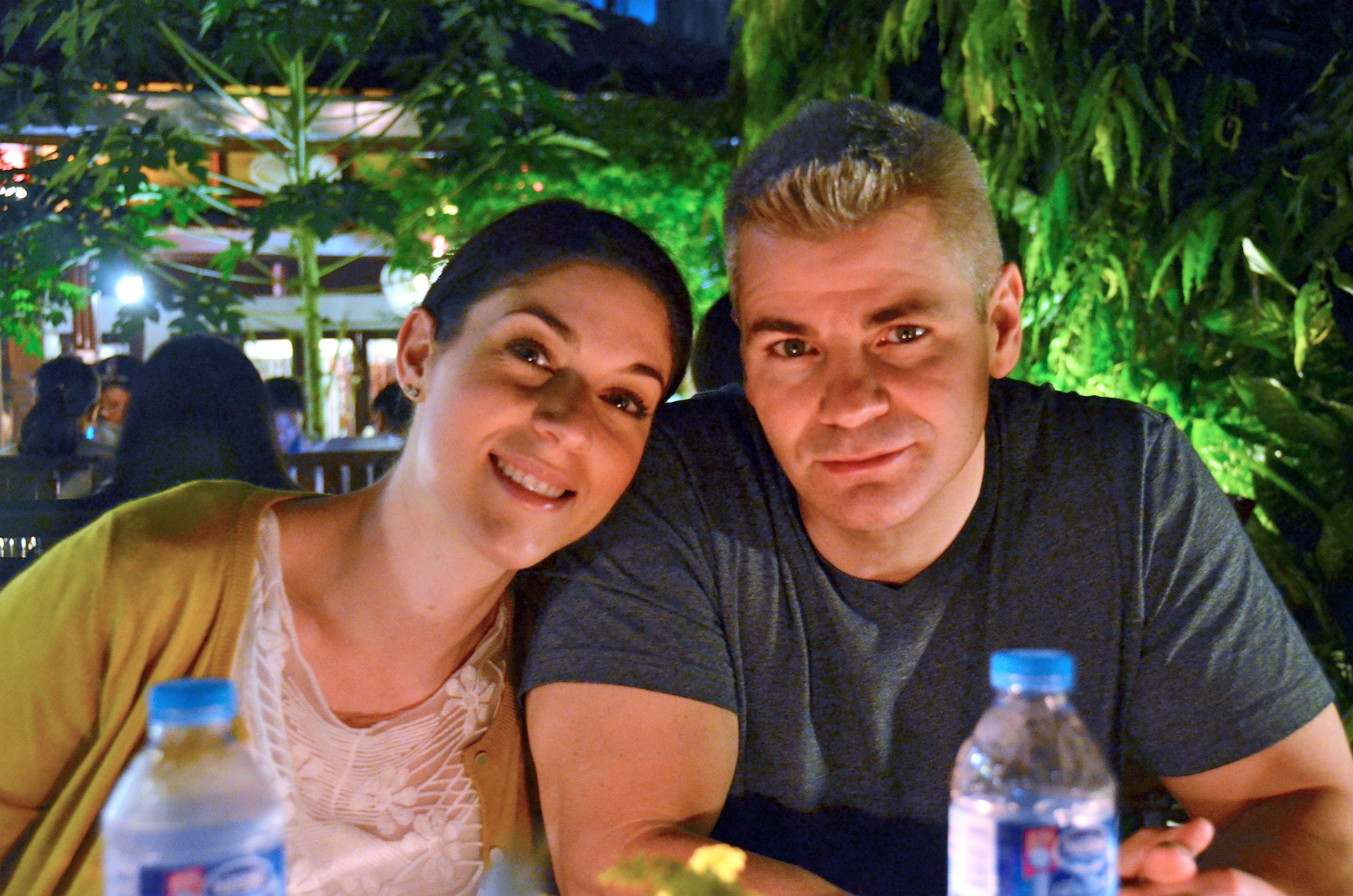 On our final day in Chiang Mai, we decided to indulge. We spent the day at the best hotel in Chiang Mai, the Dhara Dhevi. The Dhara Dhevi is like a luxurious Vegas hotel. It has beautiful grounds, several restaurants, gorgeous shops, and a top notch spa. It is an incredible hotel, but I still preferred the intimacy of 137 Pillars House, so I recommend a day trip here.
On our final day in Chiang Mai, we decided to indulge. We spent the day at the best hotel in Chiang Mai, the Dhara Dhevi. The Dhara Dhevi is like a luxurious Vegas hotel. It has beautiful grounds, several restaurants, gorgeous shops, and a top notch spa. It is an incredible hotel, but I still preferred the intimacy of 137 Pillars House, so I recommend a day trip here.
We came for the brunch, which, although pricey, was exquisite. It had offerings of every kind, including carving stations, full seafood buffets, made to order sushi, and the most beautiful deserts ever. After eating way too much, we strolled the grounds and visited their beautiful on-property temples and shops, including their macaron and pastry shop! 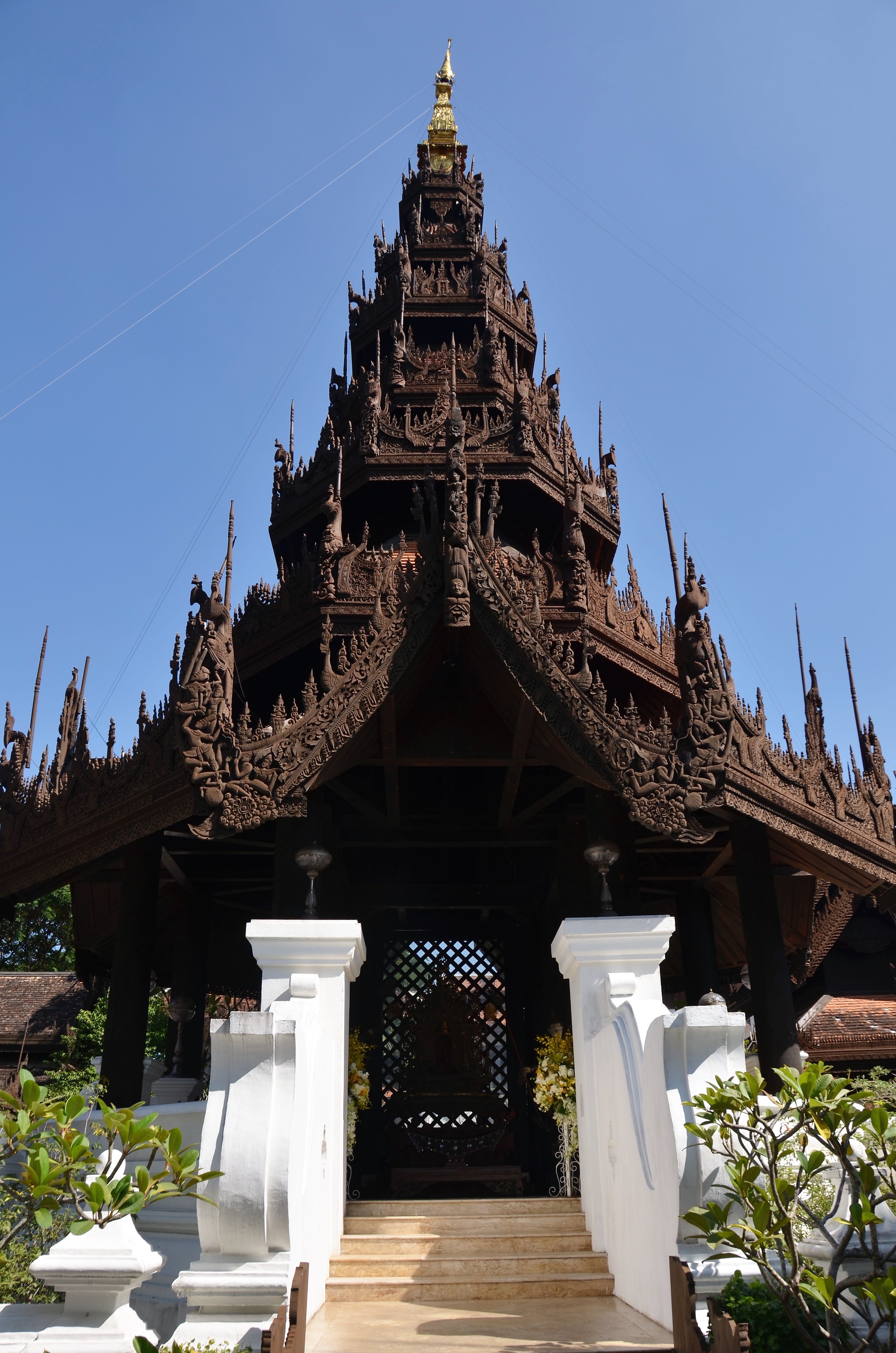
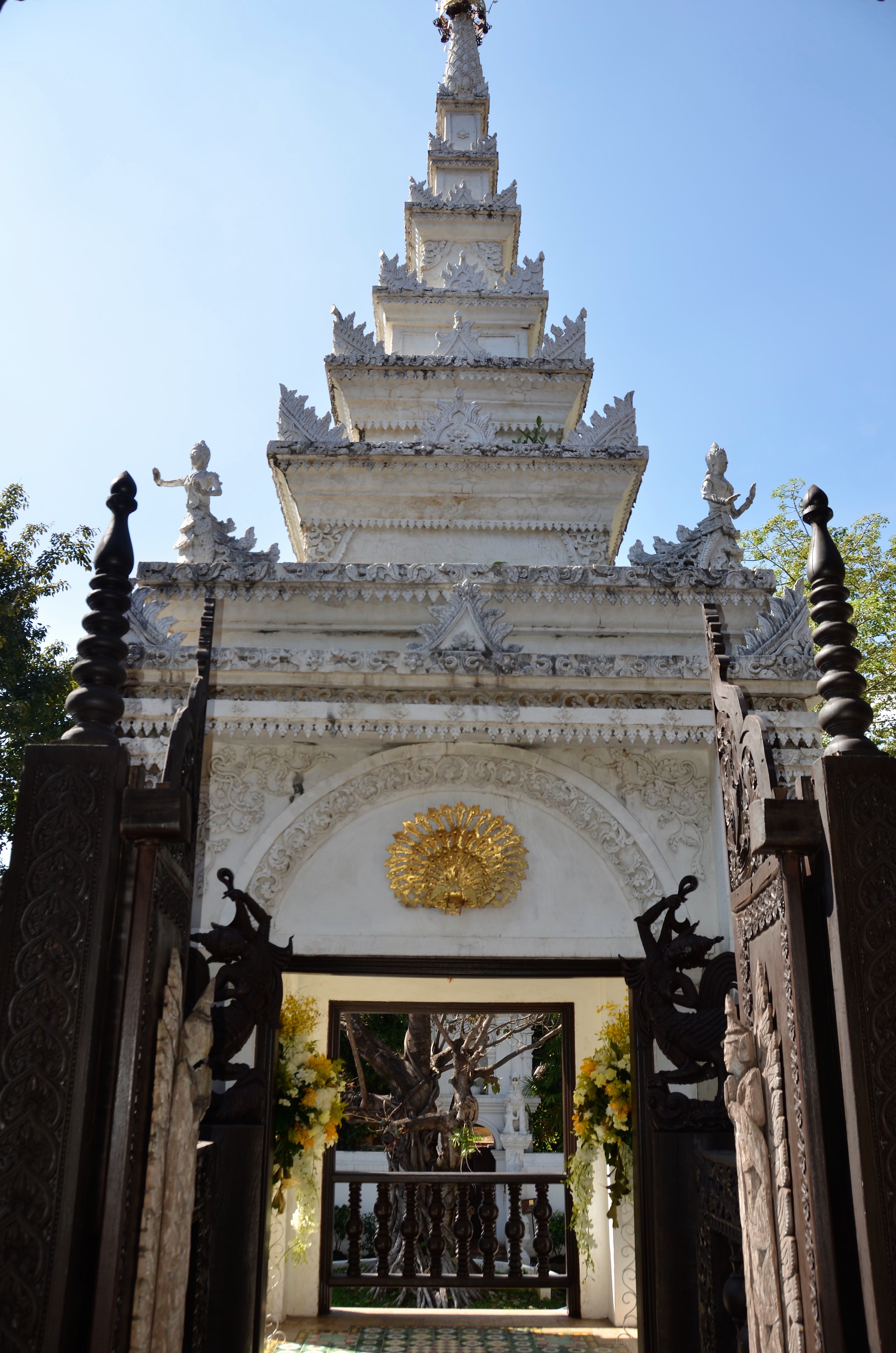
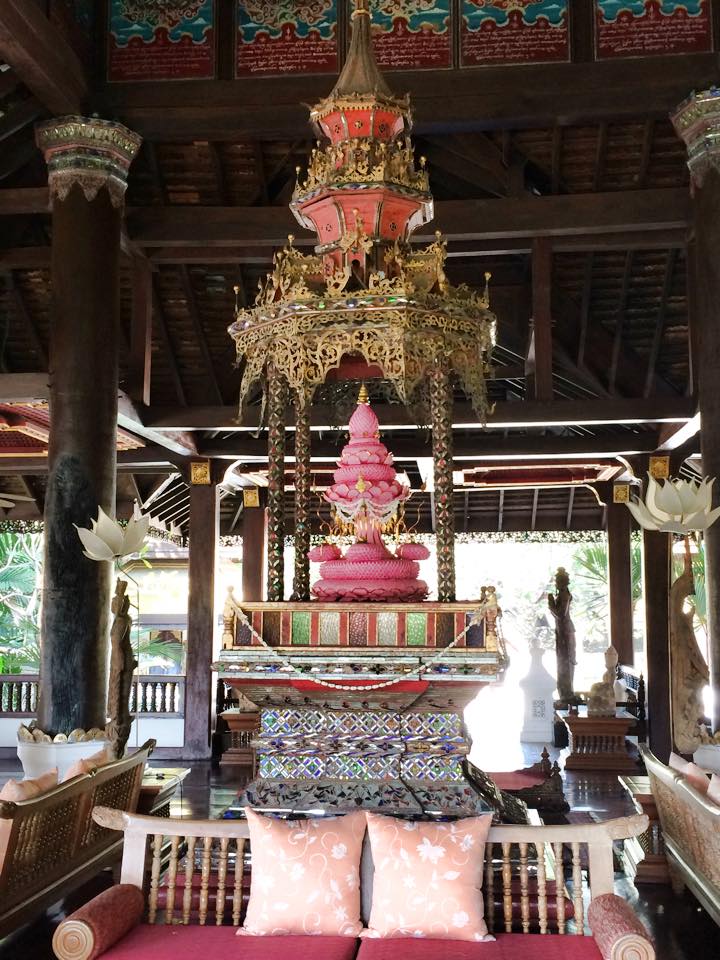 We next indulged in a nice long massage followed by tea!
We next indulged in a nice long massage followed by tea!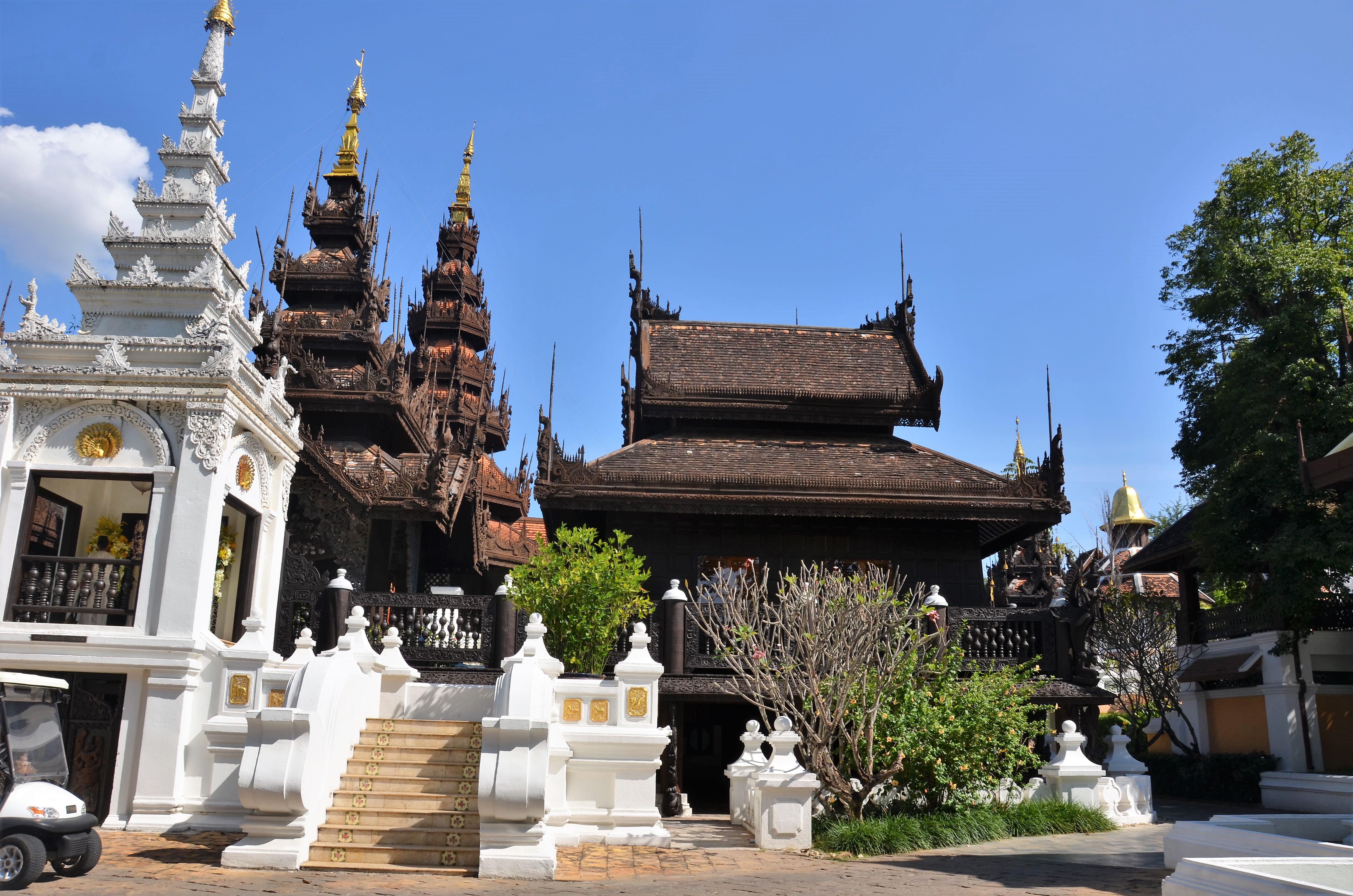
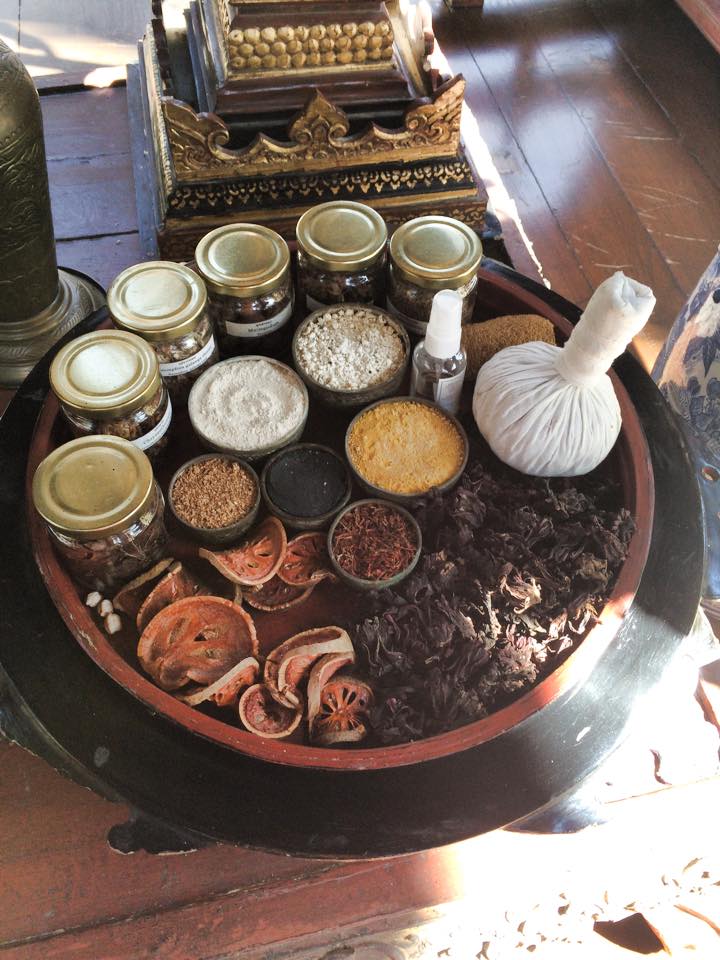 We ended the night in one of their fabulous restaurants where we enjoyed a traditional Thai dance and dinner show.
We ended the night in one of their fabulous restaurants where we enjoyed a traditional Thai dance and dinner show.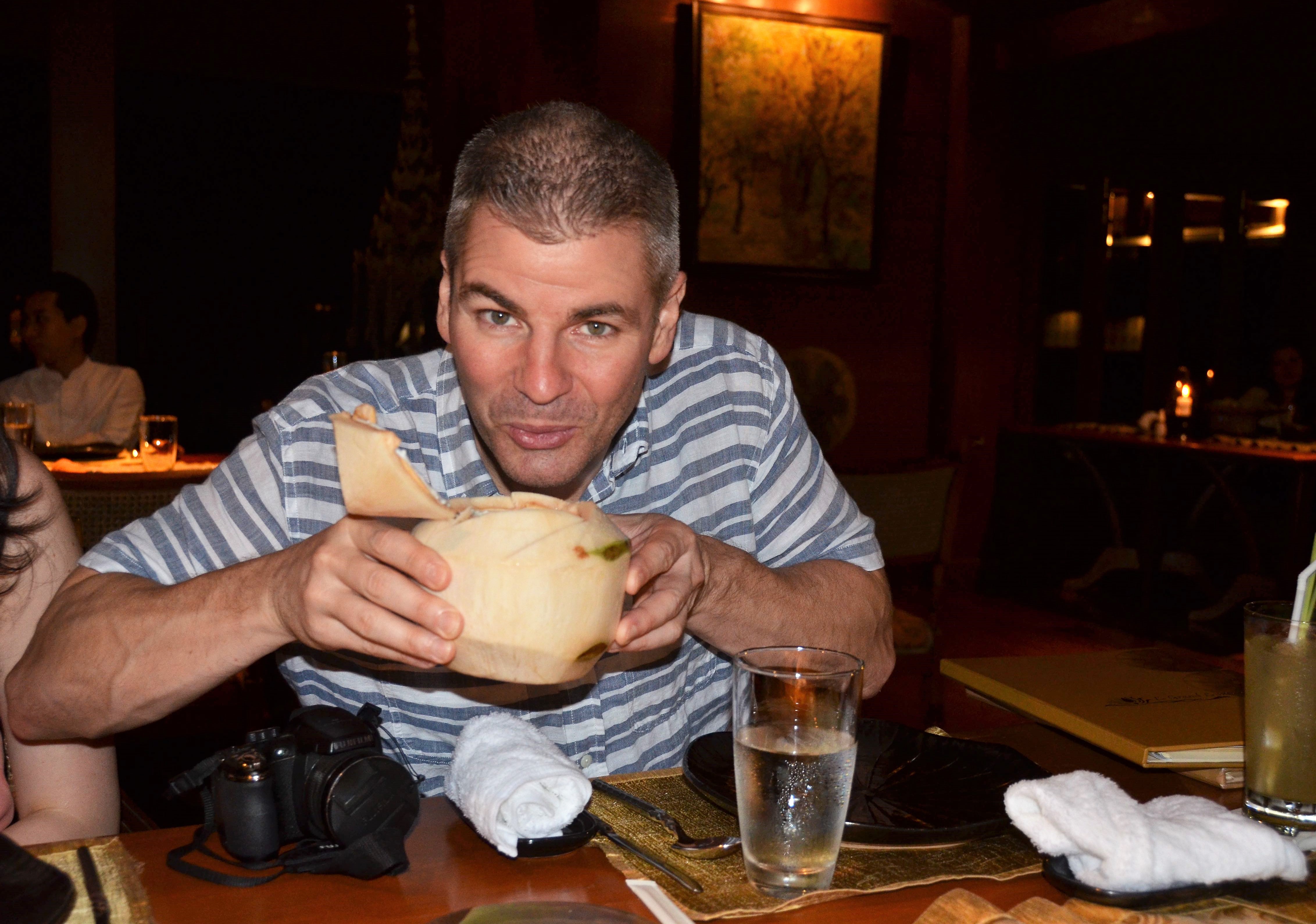
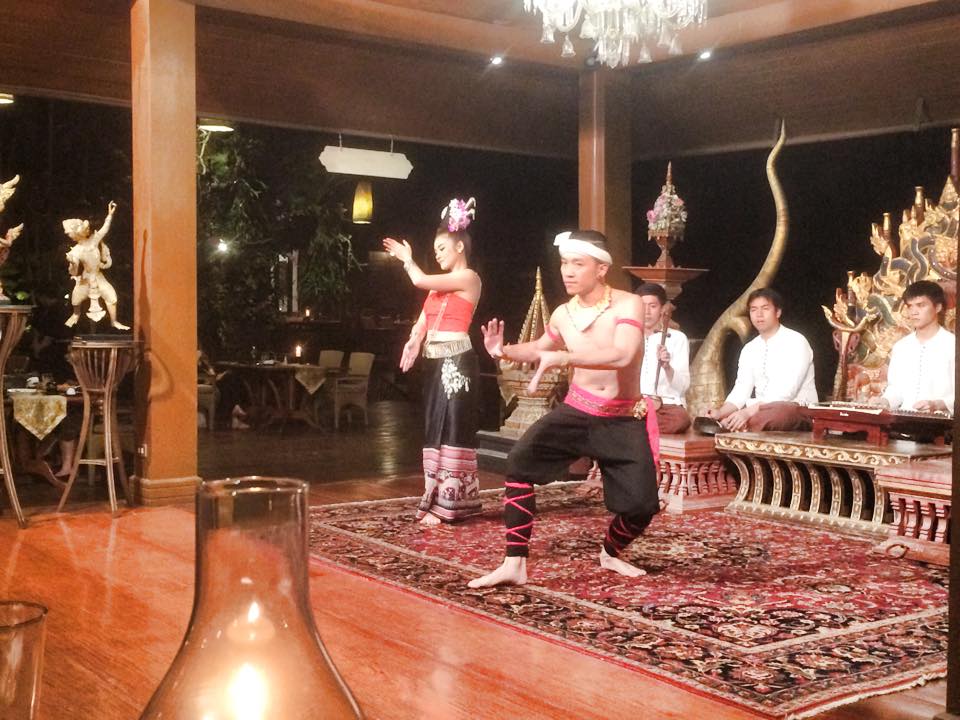 Chiang Mai is like Shangri-La. It has beautiful scenery, friendly people, and amazing experiences just waiting for you. It is a clean, budget friendly city with relatively mild temperatures and serves as the perfect place to start your journey of Northern Thailand. Chad and I truly loved our time there and would like to return to experience the Yi Peng Festival, where thousands of lanterns are released into they sky (Google image search it if you just want to swoon).
Chiang Mai is like Shangri-La. It has beautiful scenery, friendly people, and amazing experiences just waiting for you. It is a clean, budget friendly city with relatively mild temperatures and serves as the perfect place to start your journey of Northern Thailand. Chad and I truly loved our time there and would like to return to experience the Yi Peng Festival, where thousands of lanterns are released into they sky (Google image search it if you just want to swoon).
If you have been to Chiang Mai or are planning a trip there, drop me a line. I would love to hear about your experience in Chiang Mai. Until then, sawatdi.

Speak Your Mind